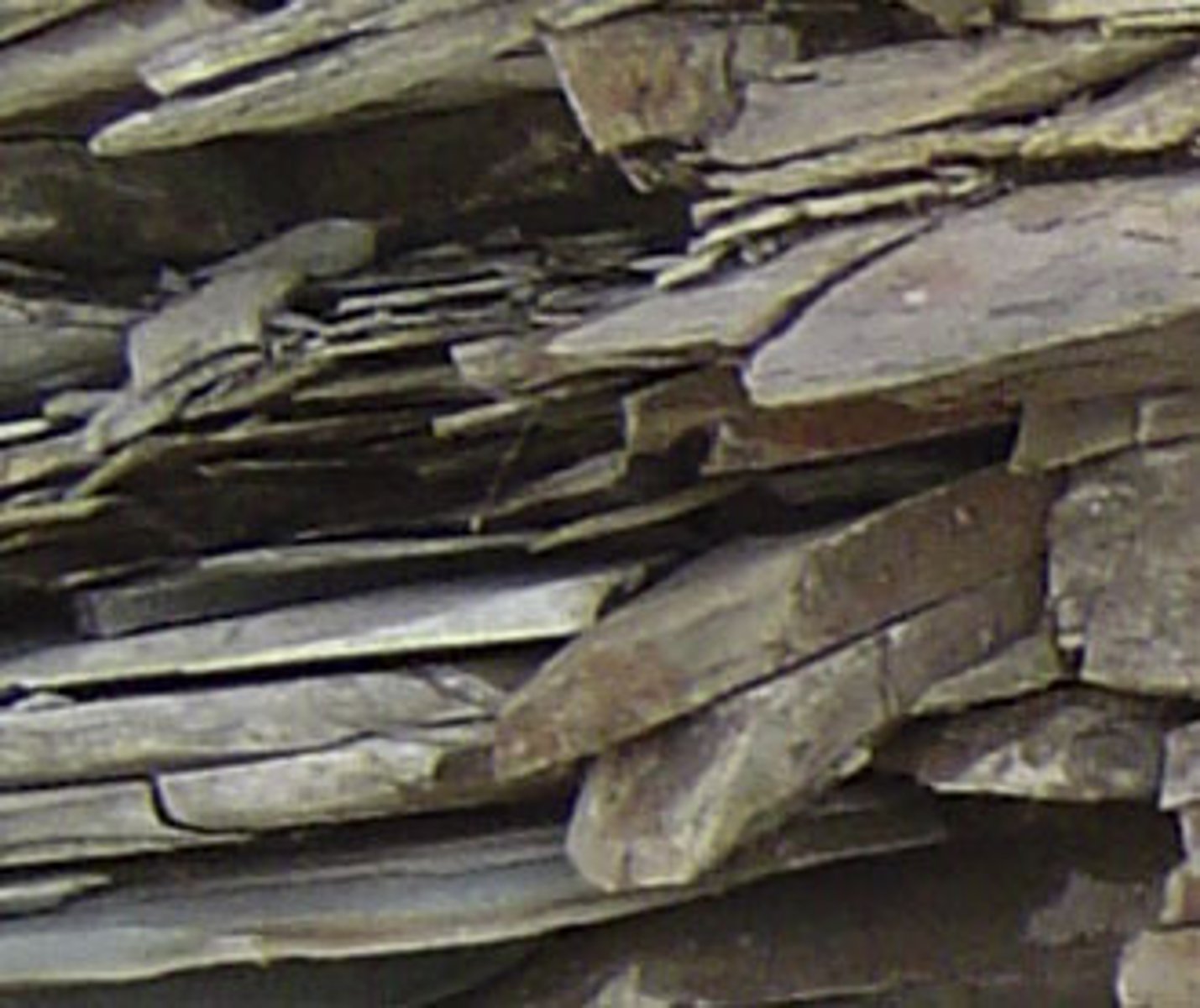Science Olympiad Rocks and Minerals
1/92
There's no tags or description
Looks like no tags are added yet.
Name | Mastery | Learn | Test | Matching | Spaced |
|---|
No study sessions yet.
93 Terms
ALBITE (plagioclase group)
Usually white,tan, or cream feldspar
Hardness:6-6.5
Specific gravity:2.6-2.63
Streak:white Composition:NaAlSi3O8
Crystal habit: often platy, tablular, twinned. Albite may be massive, granular, or lamellar.
Luster: vitreous to pearly, transparent to translucent
Group: silicates
Crystal shape: triclinic Cleavage: distinct
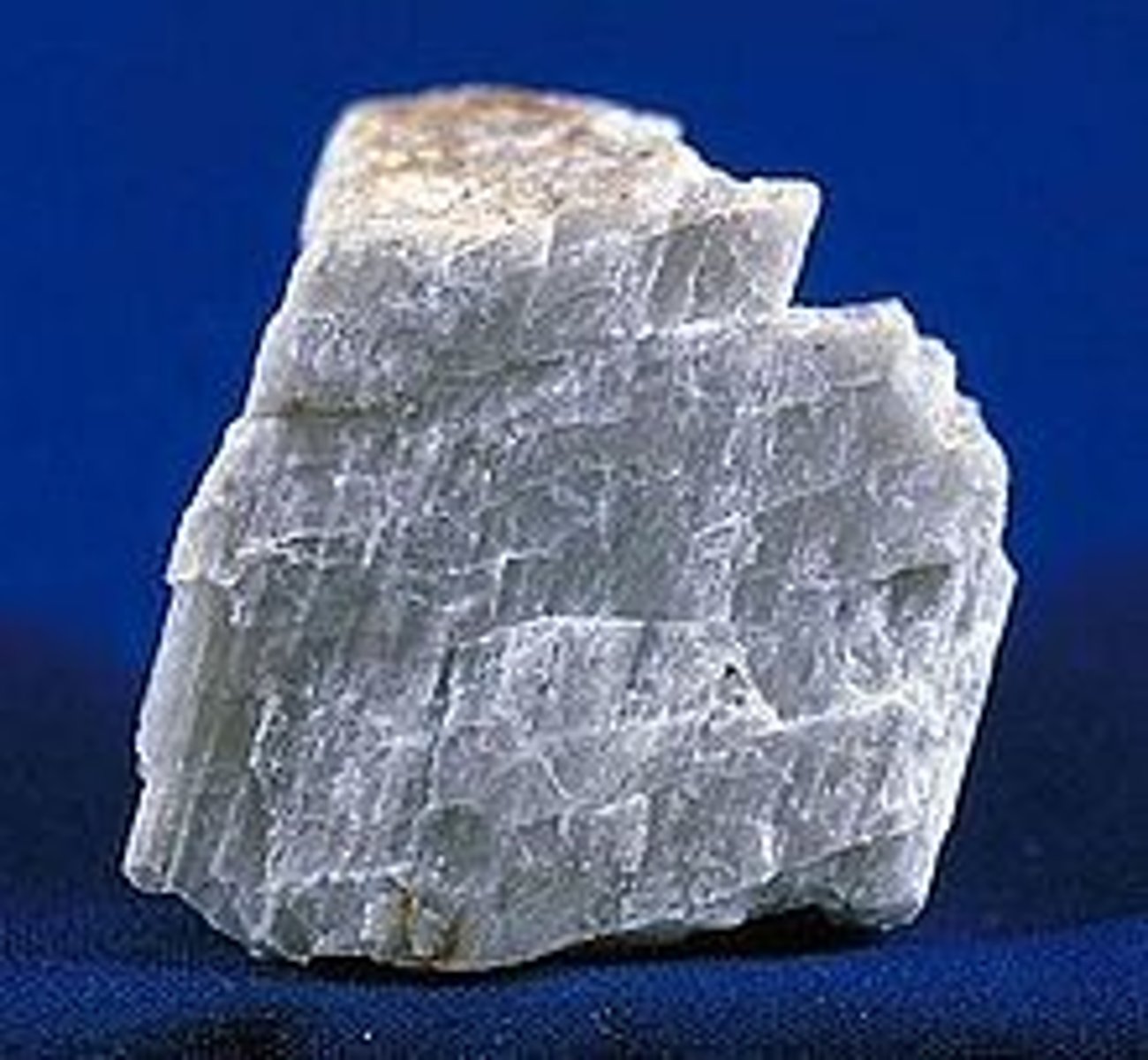
ALMANDINE (garnet)
Deep red, reddish brown, brownish black, with metamorphosed background rock such as schist
Hardness: 6.5-7.5
Crystal habit: Crystals are dodecahedral, rhombdodecahedral, or trapazohedral. Almandine also forms in massive granular, and compact habits.
Specific gravity: 4.1-4.3
Streak: white Composition: Fe3(+2)Al2(SiO4)3
Luster: vitreous or resinous, transparent to translucent
Group: silicates
Crystal shape: cubic
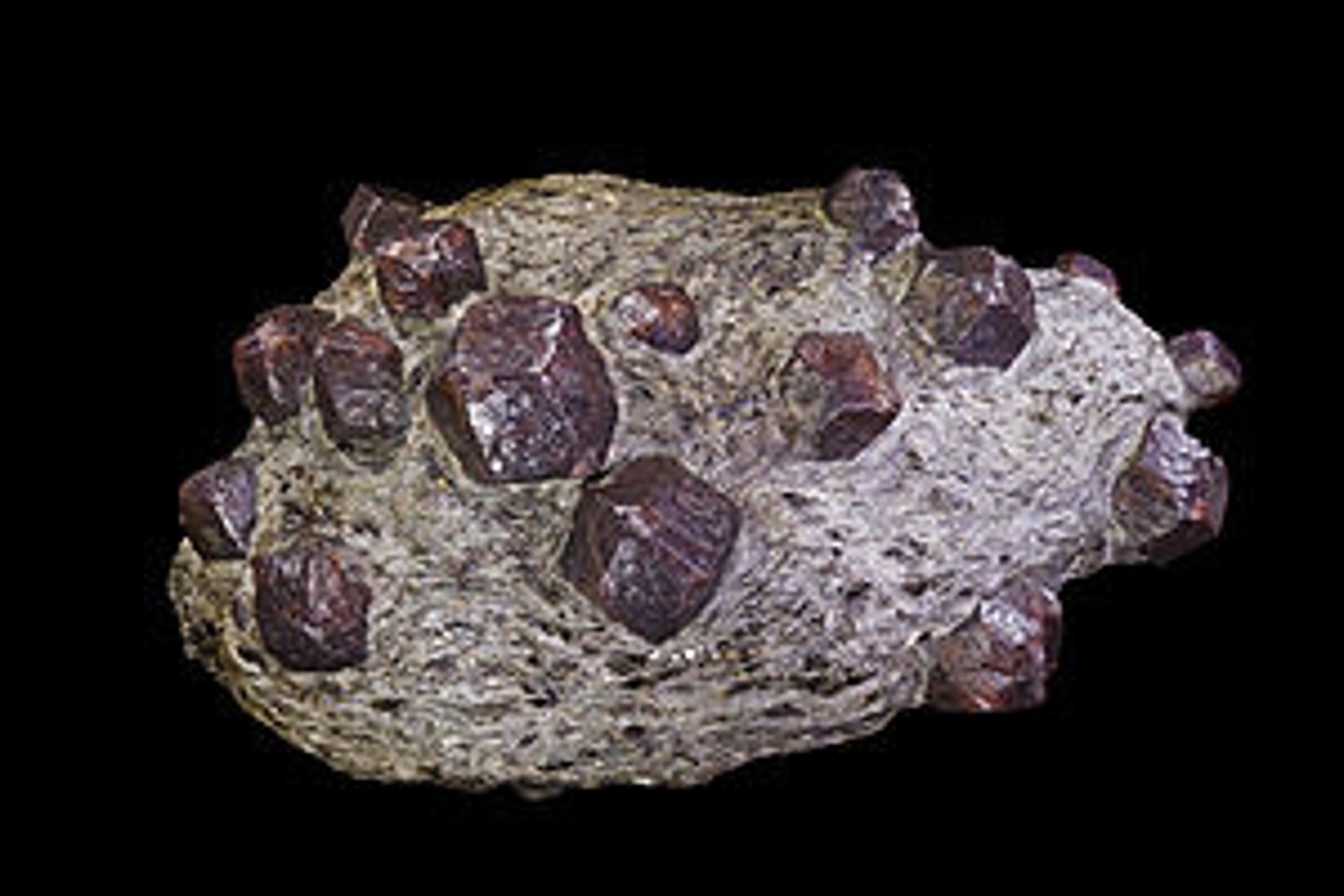
AMAZONITE (microcline, amazonstone)
Bright green, alkali feldspar, form of microcline
Hardness: 6-6.5
Specific gravity: 2.55-2.63
Crystal habit: forms tabular or short prismatic crystals, commonly twinned
Streak: white Composition: KAlSi3O8
Luster: vitreous or pearly on cleavage surfaces,
Group: silicates
Crystal shape: triclinic
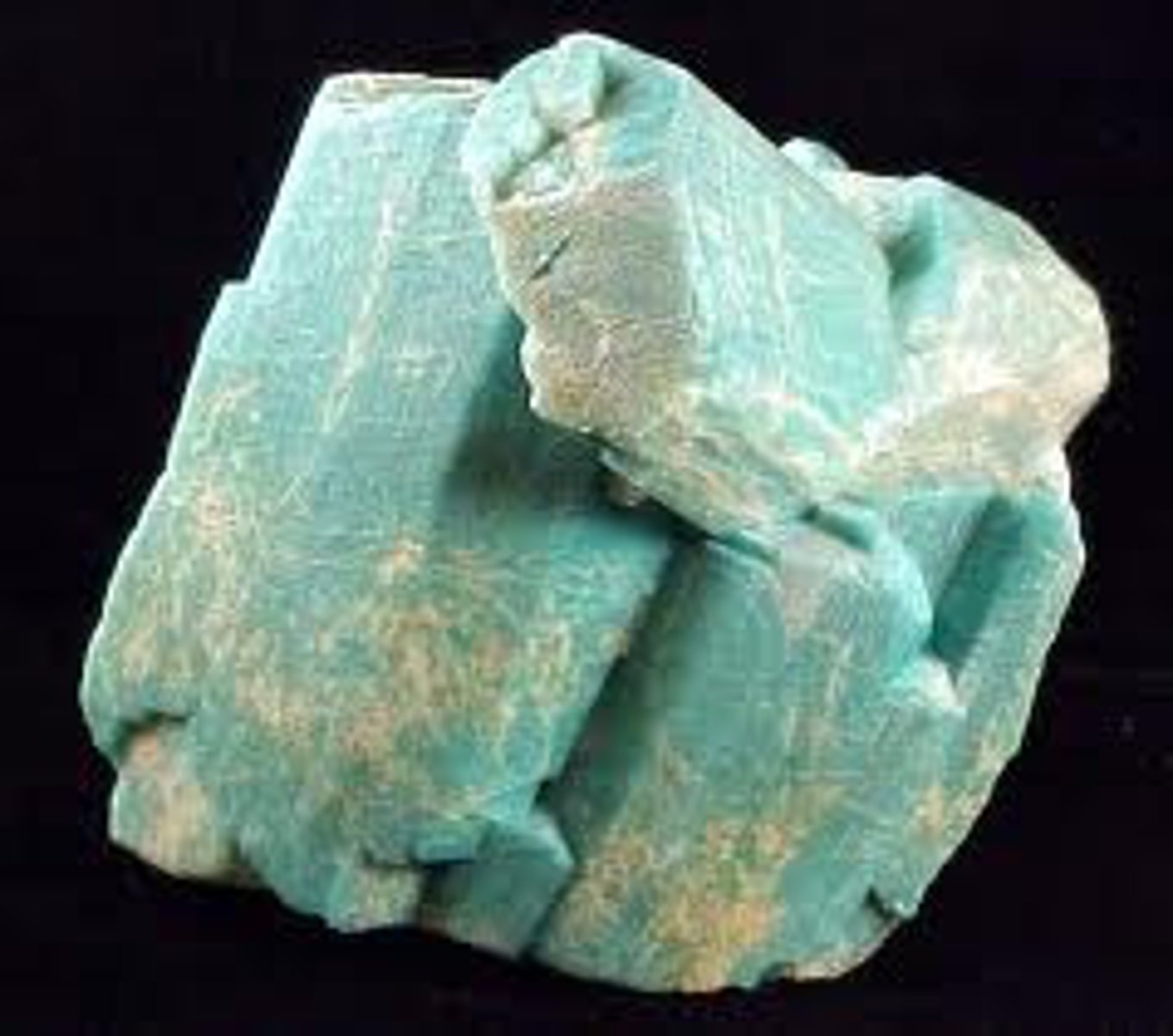
APATITE
Usually green but can be almost any color
Hardness: 5
Specific gravity: 3.1-3.2
Crystal habit: prismatic or tabular crystals, and in massive, compact, and granular habits, forms in igneous rocks and in metamorphosed limestones
Streak: white Composition: Ca(PO4)3(F,Cl,OH)
Luster: vitreous to subresinous, transparent to translucent
Group: phosphates
Crystal shape: trigonal/hexagonal
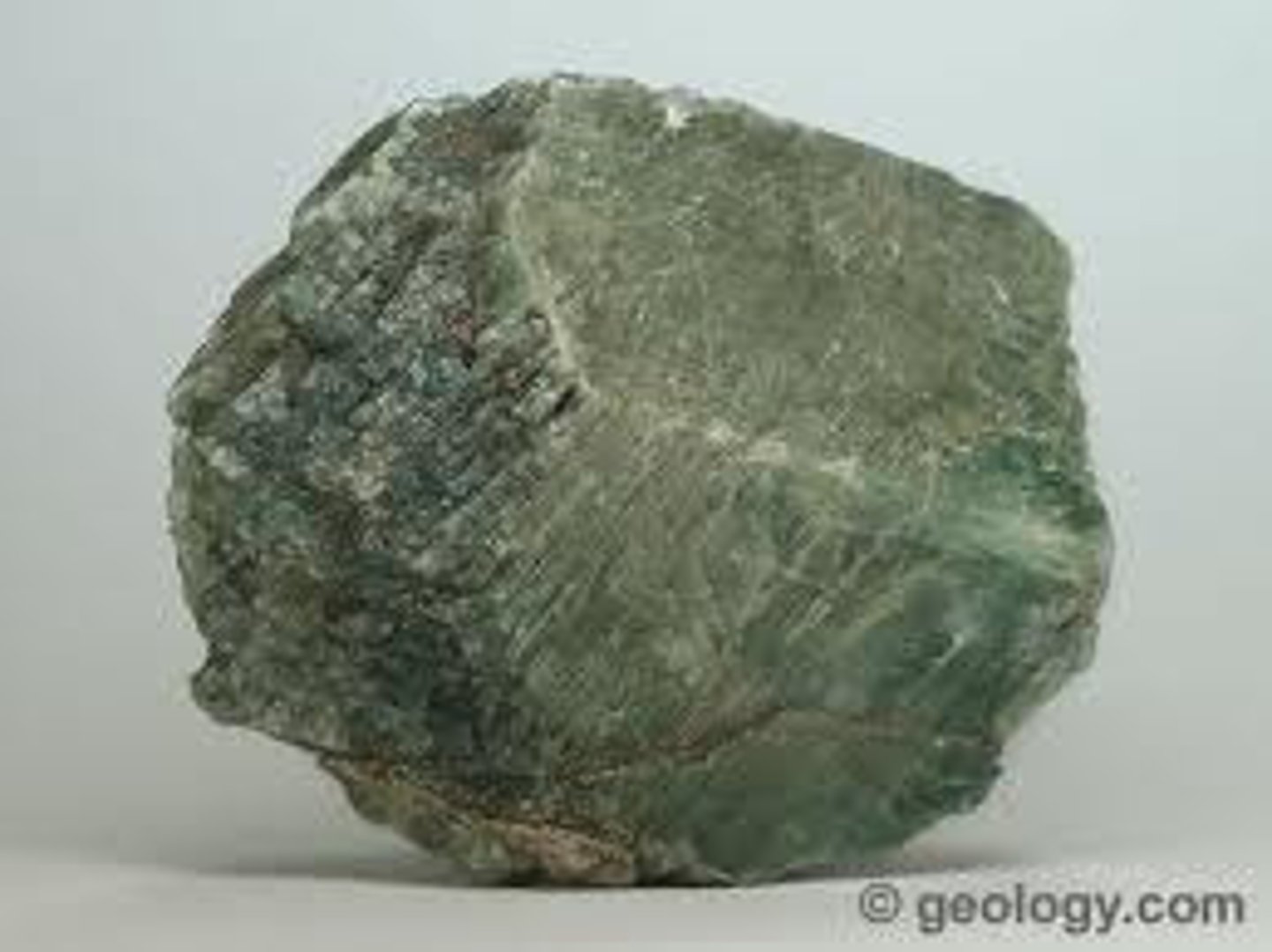
ARAGONITE
White, colorless, gray, yellowish, green, blue, violet, reddish, or brown
hardness:3.5-4
specific gravity: 2.94-2.95
Crystal habit: prismatic, elongated, often twinned crystals; habits can be columnar, stalactitic, fibrous, radiating, coral-like
streak: white Composition: CaCo3
Luster: vitreous, transparent to translucent
group: carbonates
crystal shape: orthorhombic
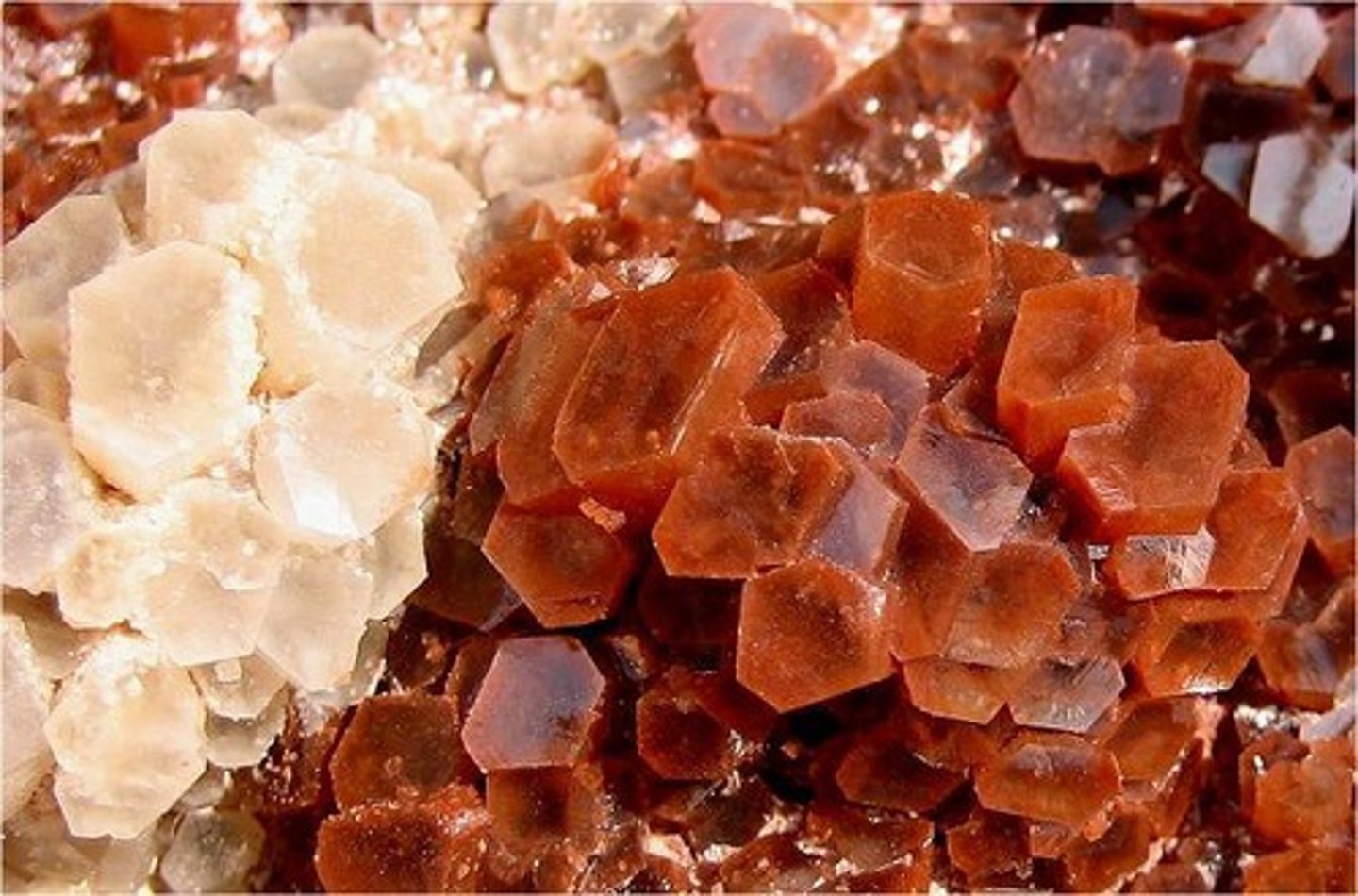
AUGITE
brown, greenish, black
hardness: 5.5-6
specific gravity: 3.23-3.52
Crystal habit: short prismatic crystals, often twinned; habit may be massive, compact, granular
streak: gray-green
Composition: (Ca,Na)(Mg,Fe,Al,Ti)(Si,Al)2O6
Luster: vitreous ot dull, translucent to nearly opaque
group: silicates
crystal shape: monoclinic
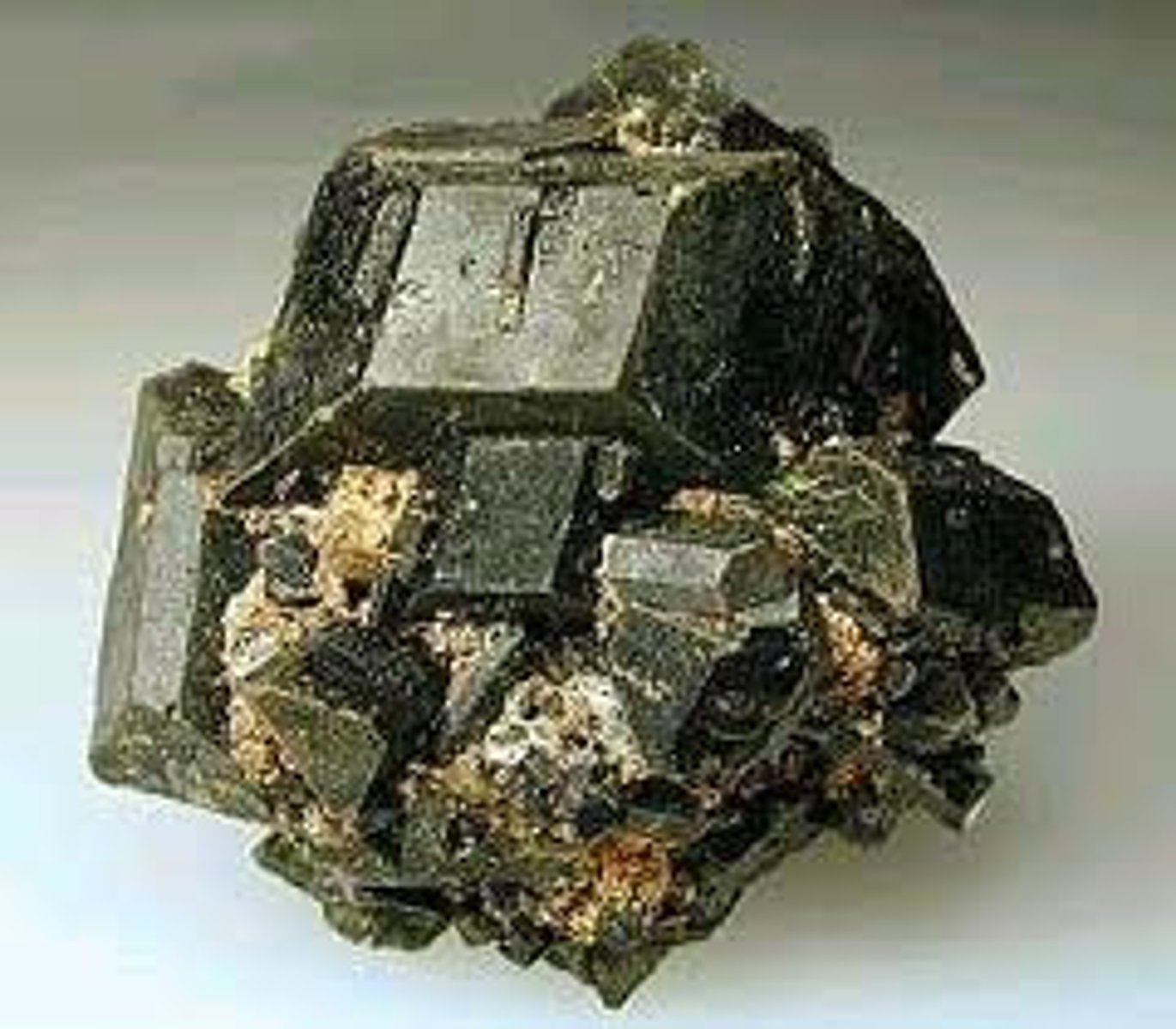
AZURITE
always blue
hardness:3.5-4
specific gravity: 3.77-3.78
Crystal habit: tabular, short, prismatic crystals, may be twinned, may also occur as massive, nodular, stalactic, and earthy habits
streak: paler blue Composition: Cu3(+2)(C03)2(OH)2
Luster: vitreous or dull, transparent to opaque
group: carbonates
crystal shape: monoclinic
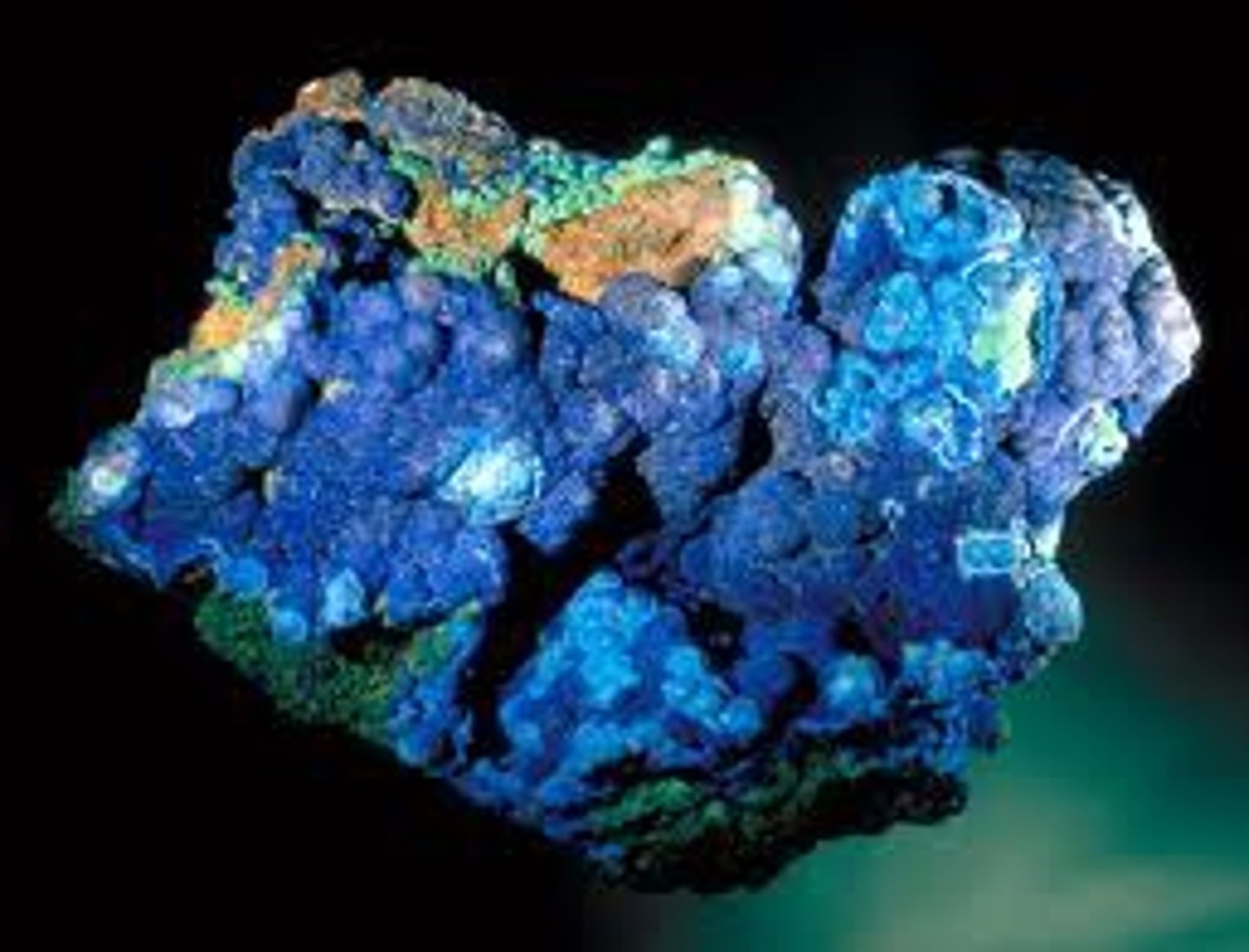
BAUXITE
White to yellowish or red and reddish brown mixture of several minerals including hydrated aluminum oxides and iron oxides
hardness: 6.5-7
specific gravity: 2.3-2.7
Habit: massive, concretionary, oolitic, pisolitic
Streak: White
Composition: FeO(OH) and Al2O3(2H2O)
Luster: dull or earthy, opaque
Group: Hydroxides
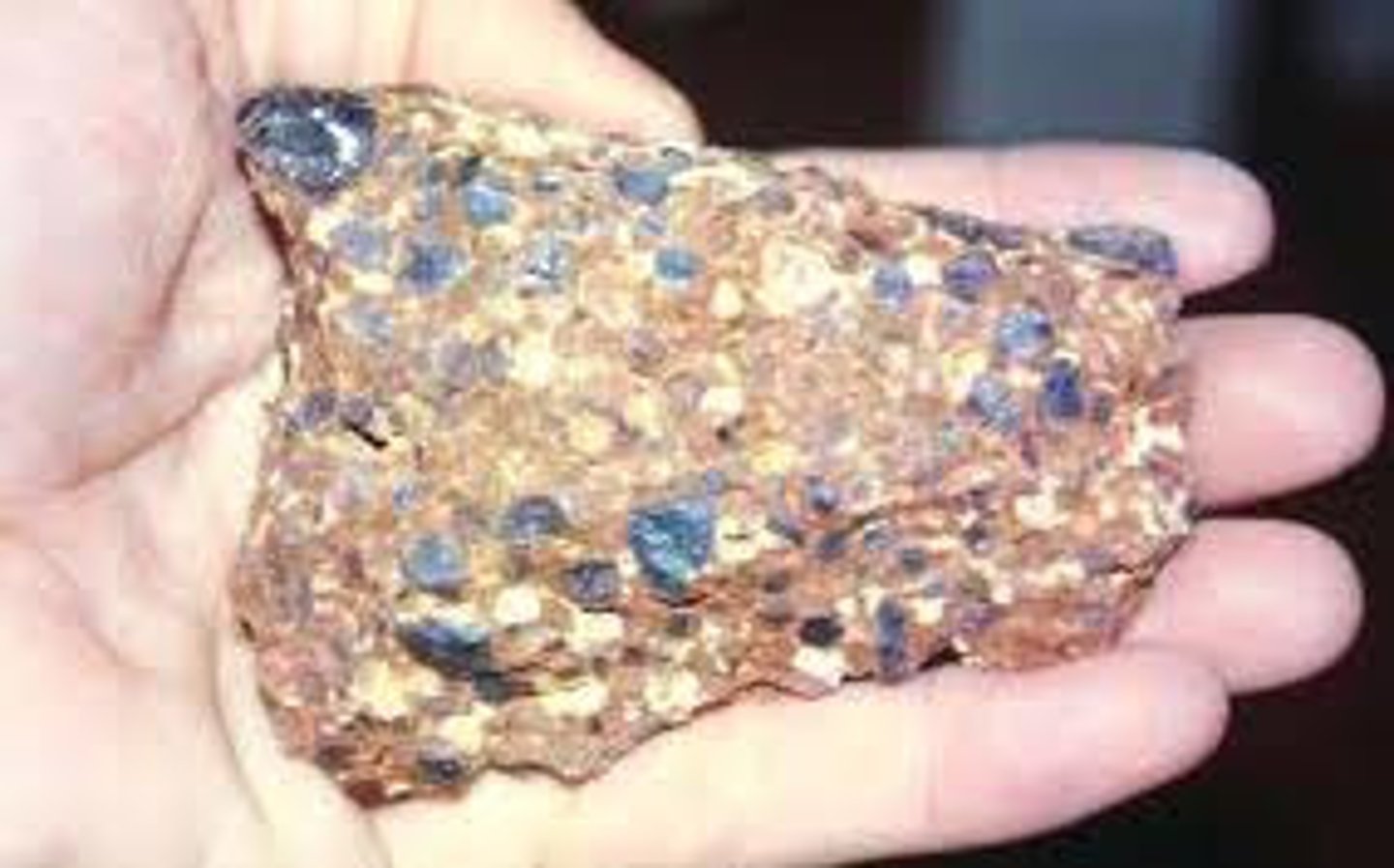
BARITE
White, gray, yellowish, brown, reddish, bluish, greenish
hardness: 3-3.5
specific gravity:4.5
Crystal habit: tabular, prismatic crystals which can be very large, may occur as sand-bearing, rose-shaped concretions called desert roses, may be granular, lamellar, fibrous, cockscomb, earthy, columnar
Streak: white Composition: BaSO4
Luster: vitreous, resinous, pearly, transparent to traslucent
group: sulfates
crystal shape: orthorhombic
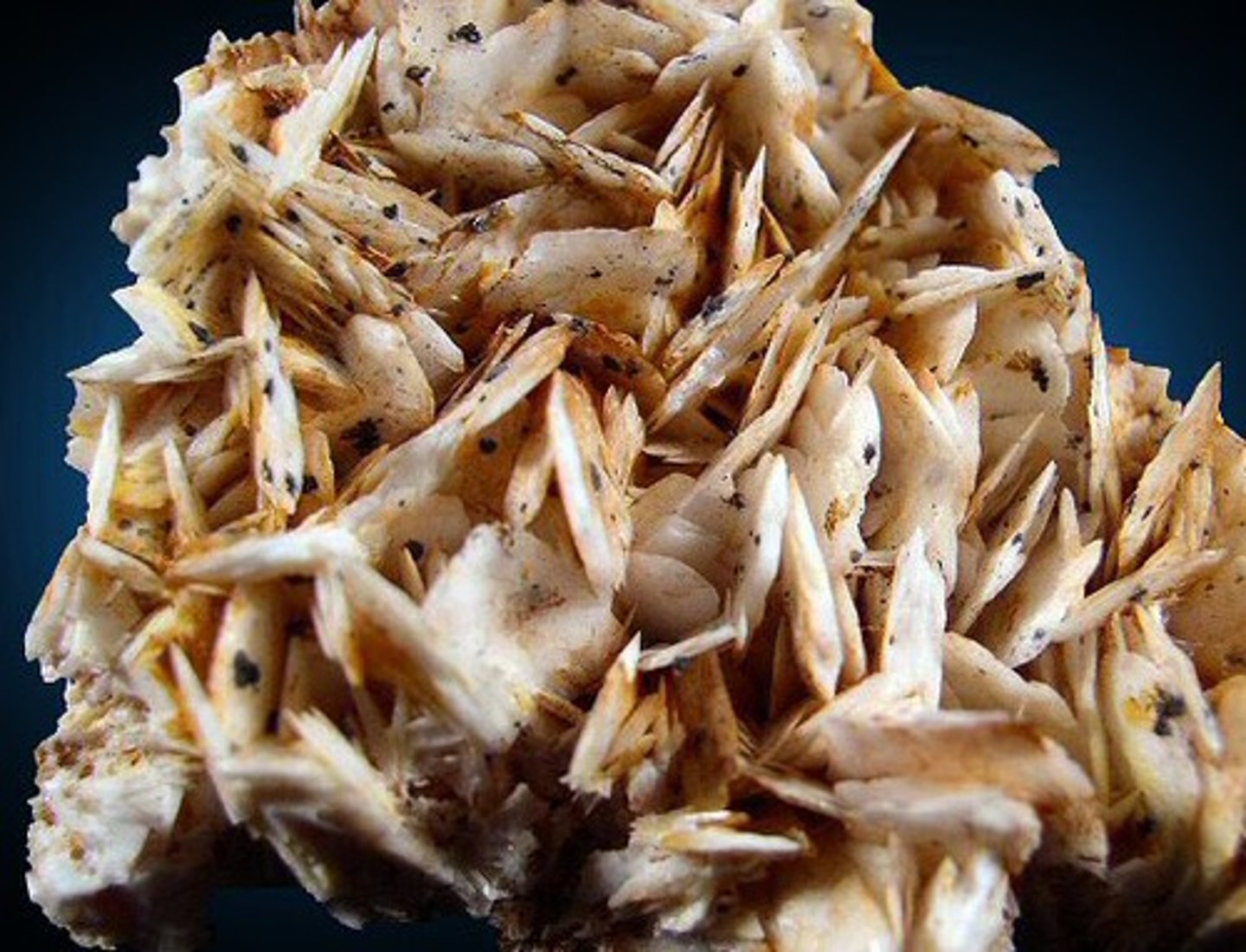
BERYL
Colorless, white, green (emerald), yellow, pink, red, blue (aquamarine)
hardness:7-8
specific gravity: 2.6-2.9
Crystal habit: prismatic crystals, sometimes terminated with small pyramids, crystals often striated parallel to their length
streak: White Composition: Be3Al2Si6O18
Luster: vitreous, transparent to translucent
group: Silicates
crystal shape: Trigonal/ Hexagonal
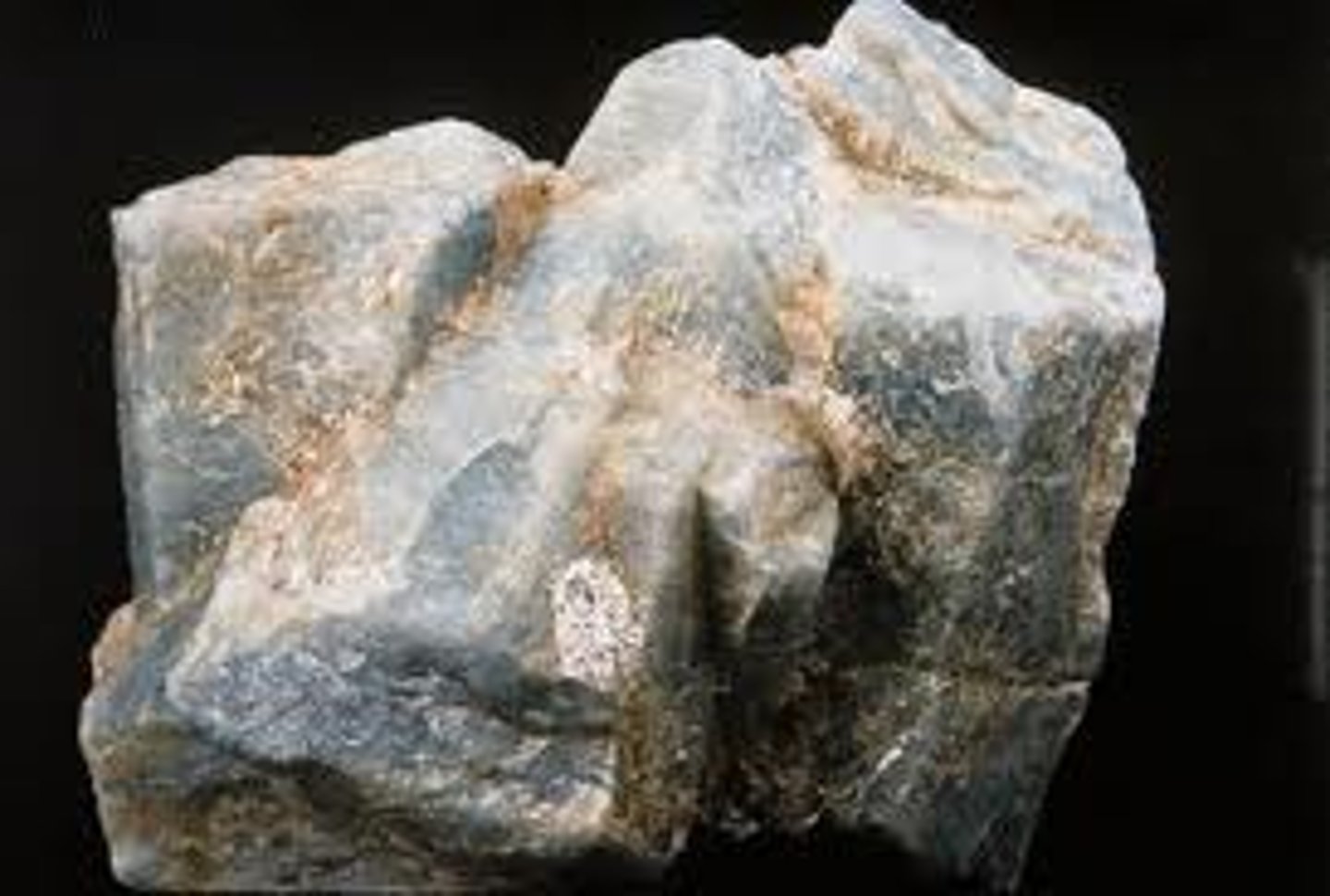
BIOTITE
black, dark brown, reddish brown, green, very rarely white
hardness:2.5-3
specific gravity:2.7-3.4
Crystal Habit: tabular or short prismatic crystals, plates/scales, thin plates tough, very elastic
streak: Colorless
Composition: K(Mg,Fe+2)3(Al,Fe+3)Si3O10(OH,F)2
Luster: splendent or vitreous, transparent to nearly opaque
group: Silicates
crystal shape: Monoclinic
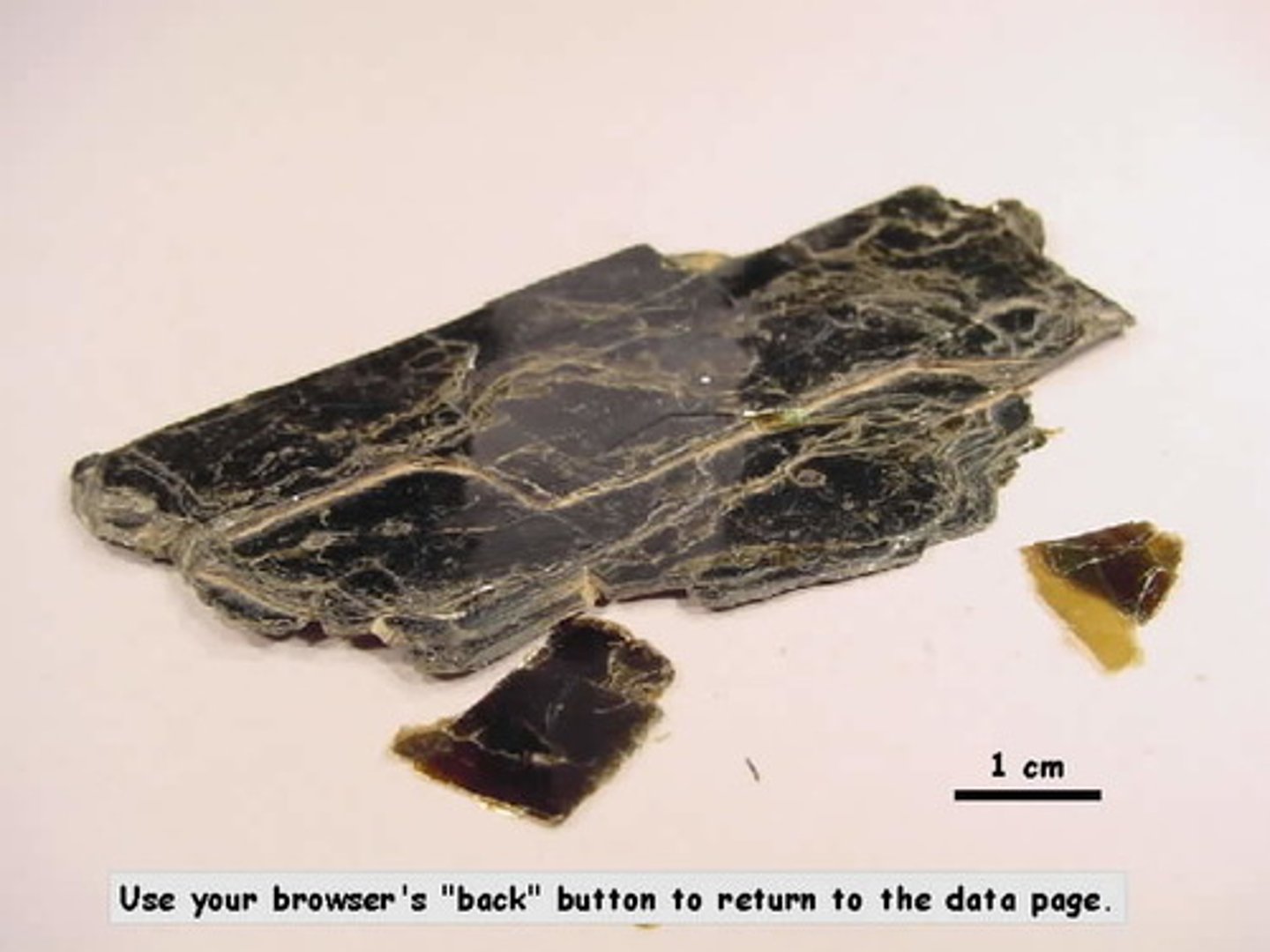
BORNITE
Coppery red, coppery brown, or bronze, tarnishing to iridescent blue, pruple and red - leading to its common name "peacock copper"
hardness: 3
specific gravity: 5.0-5.1
Crystal habit: usually compact, granular, or massive, crystals are cubic, octahedral, or dodecahedral
streak: gray-black Composition: Cu5FeS4
Luster: metallic, opaque
group: sulfides
crystal shape: cubic
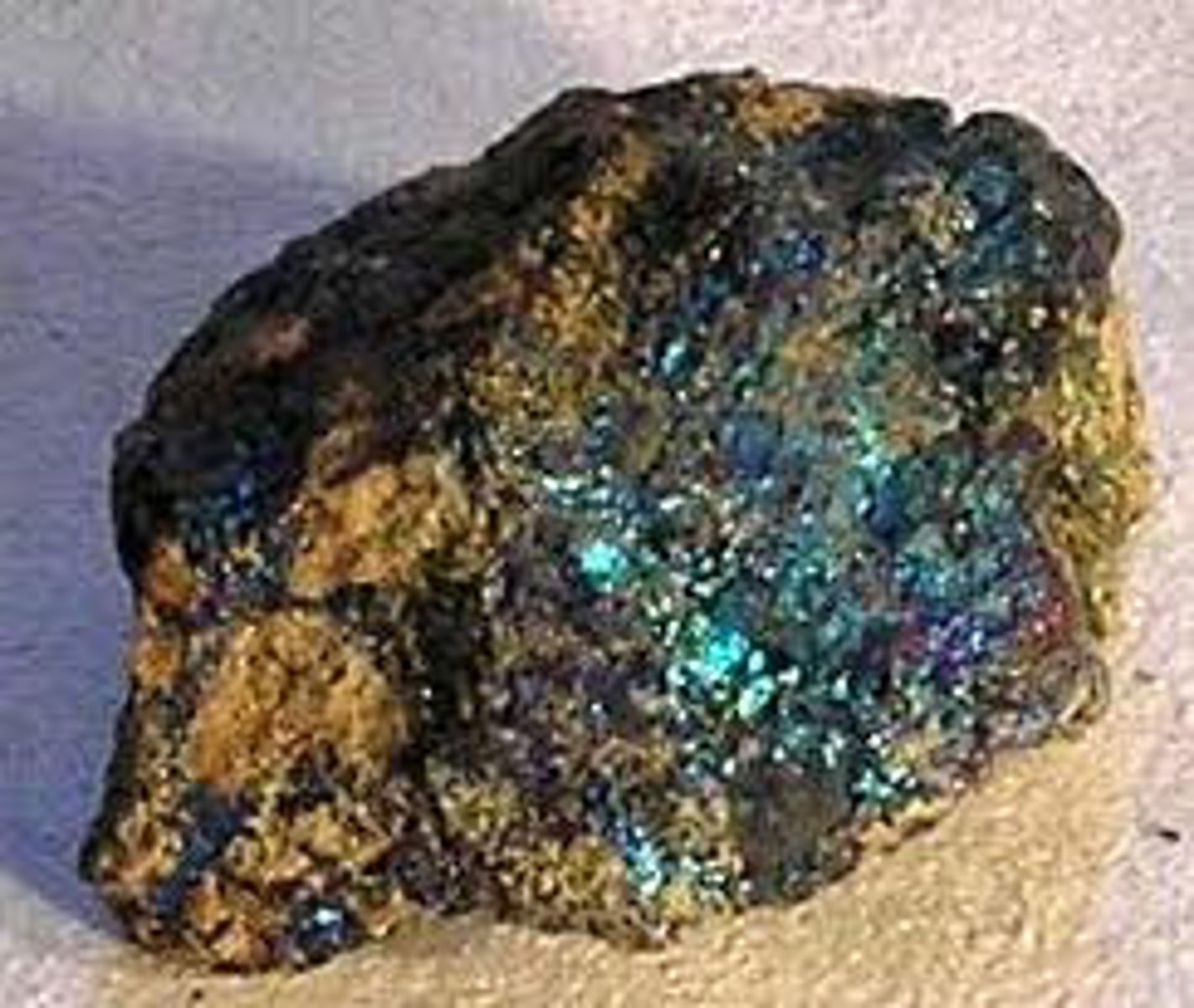
CALCITE
White, colorless, gray, red, brown, green, black. Reacts with hydrochloric acid.
hardness: 3
specific gravity: 2.71
Crystal habit: rhombohedral and scalenohedral, twinning common, can also be massive, granular, fibrous, stalactic
streak: white-grayish Calcite: CaCO3
Luster: vitreous to pearly or dull, transparent to translucent
group: carbonates
crystal shape: triagonal/hexagonal
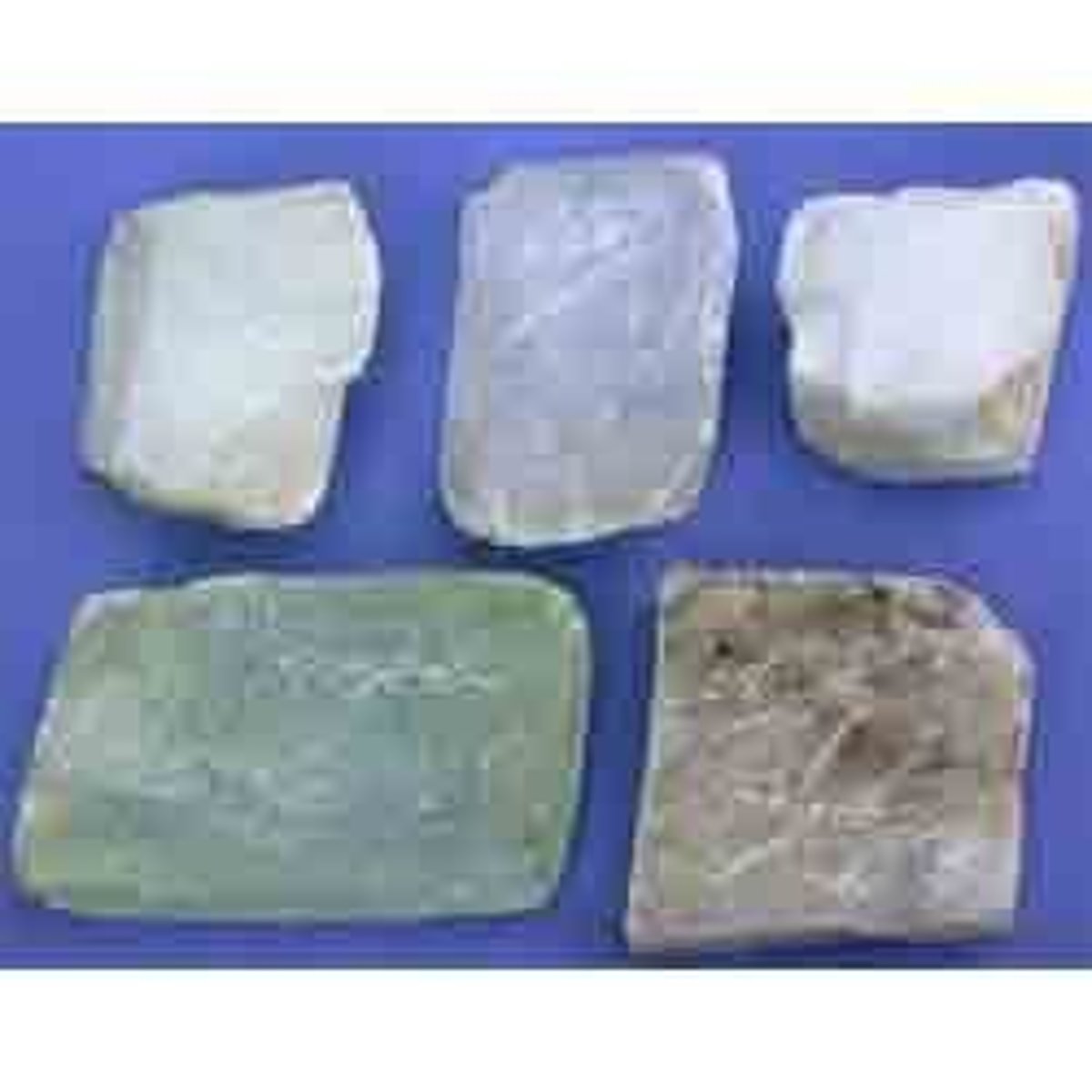
CELESTITE (celestine)
colorless, white, gray, blue, green, yellowish, orange, reddish, or brown
hardness: 3-3.5
specific gravity: 3.96-3.98
Crystal habit: tabular or prismatic crystals, habit may also be massive, fibrous, granular, nodular
streak: white Composition: SrSO4
Luster: vitreous (pearly on cleavages), transparent to translucent
group: sulfates
crystal shape: othorhombic
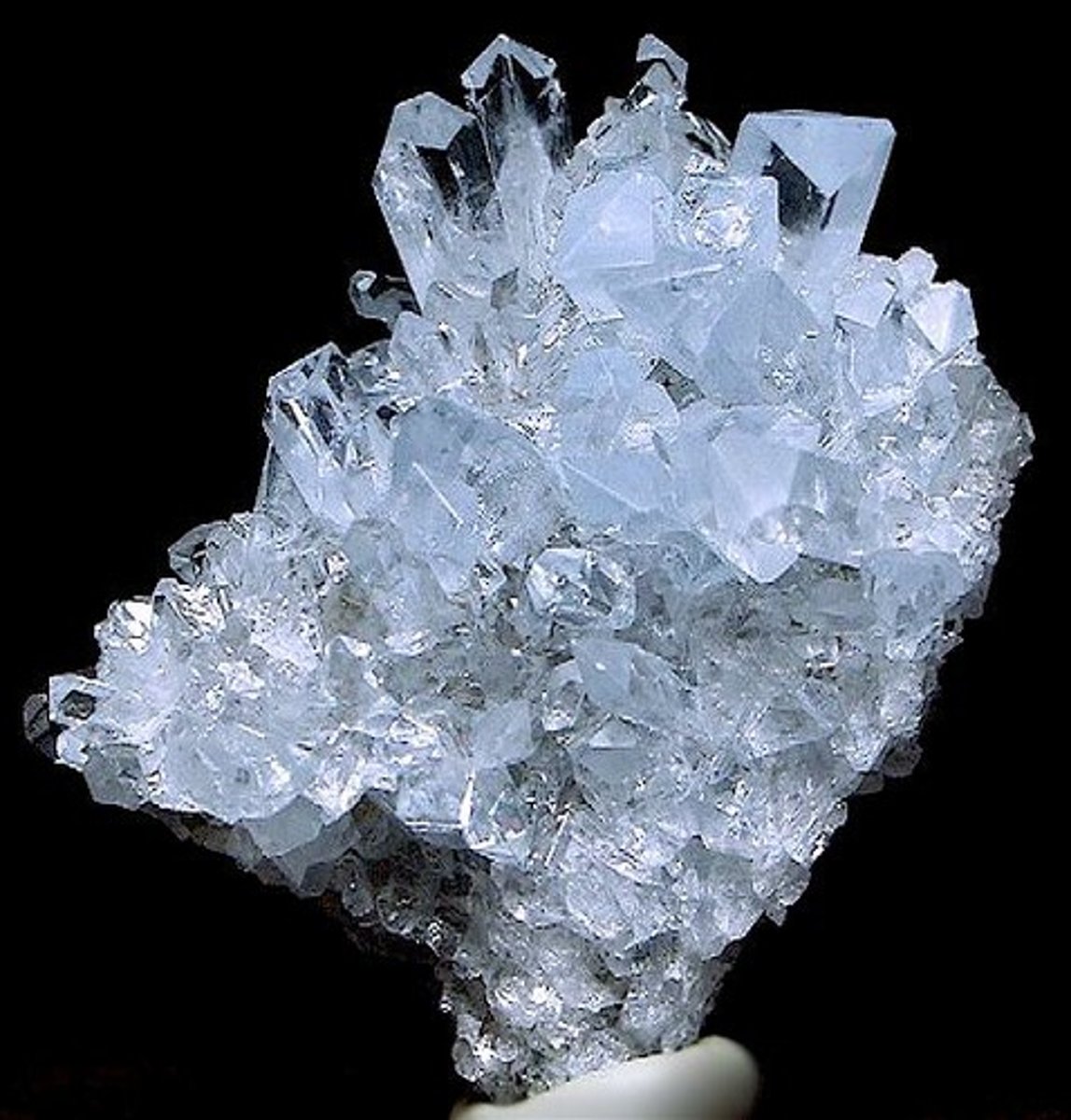
CHALCOPYRITE
very brassy yellow, tarnishes bright red, yellow, purple, and green
hardness: 3.5-4
specific gravity: 4.3-4.4
Crystal habit: pseudotetrahedral crystals, often with striated faces commonly twinned; may also occur as compact, massive, reniform, botryoidal
streak: green-black Composition: CuFeS2
Luster: metallic, opaque
group: sulfides
crystal shape: tetragonal
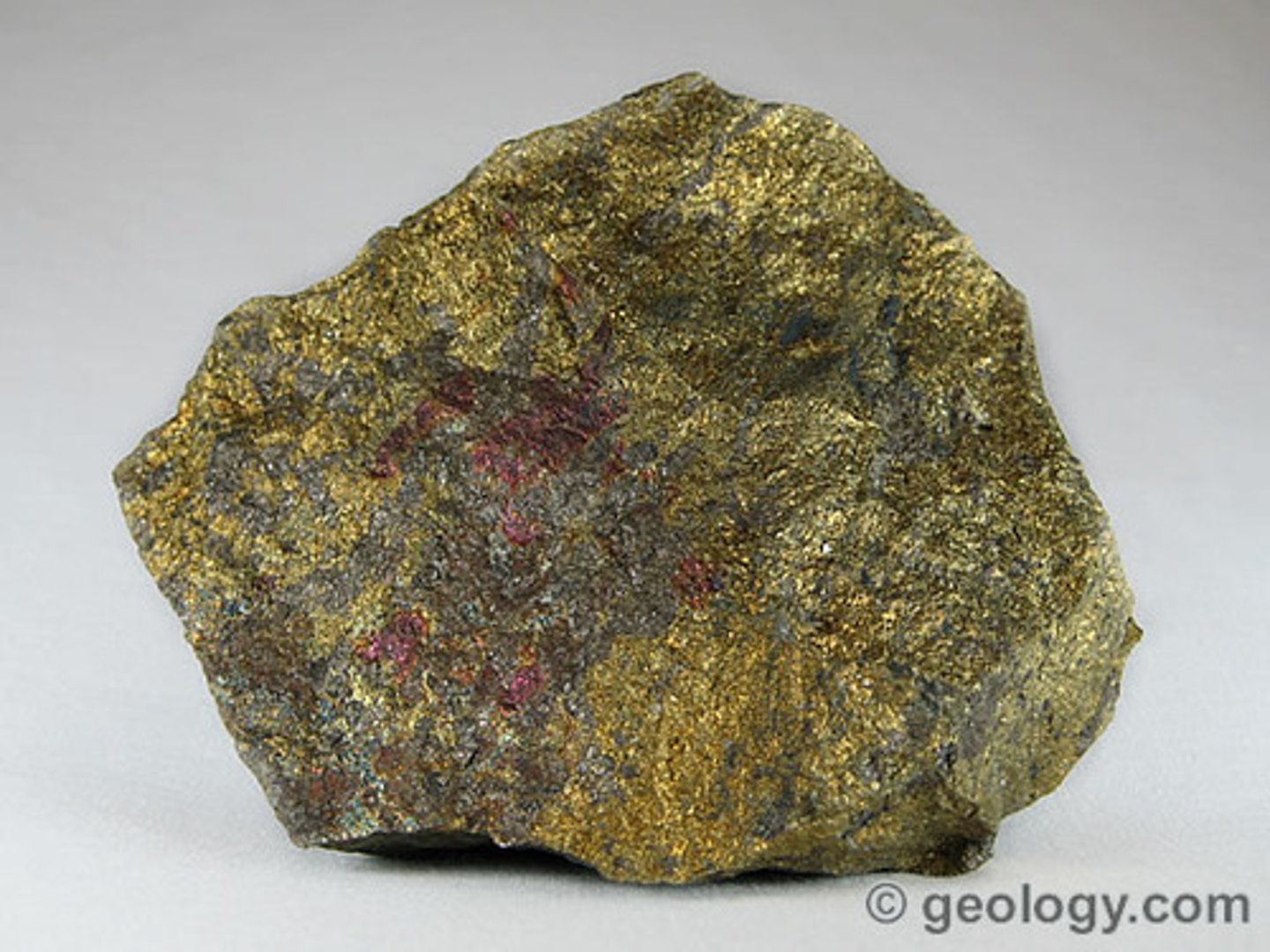
COPPER
Copper red or rose red, green tarnish
hardness: 2.5-3
specific gravity: 8.9
Crystal habit: rarely forms crystals, when it does, they are cubes, octahedra, or dodecahedra, usual habits are dendritic and massive
streak: copper-red Composition: Cu
Luster: metallic, opaque
group: native element
crystal shape: cubic
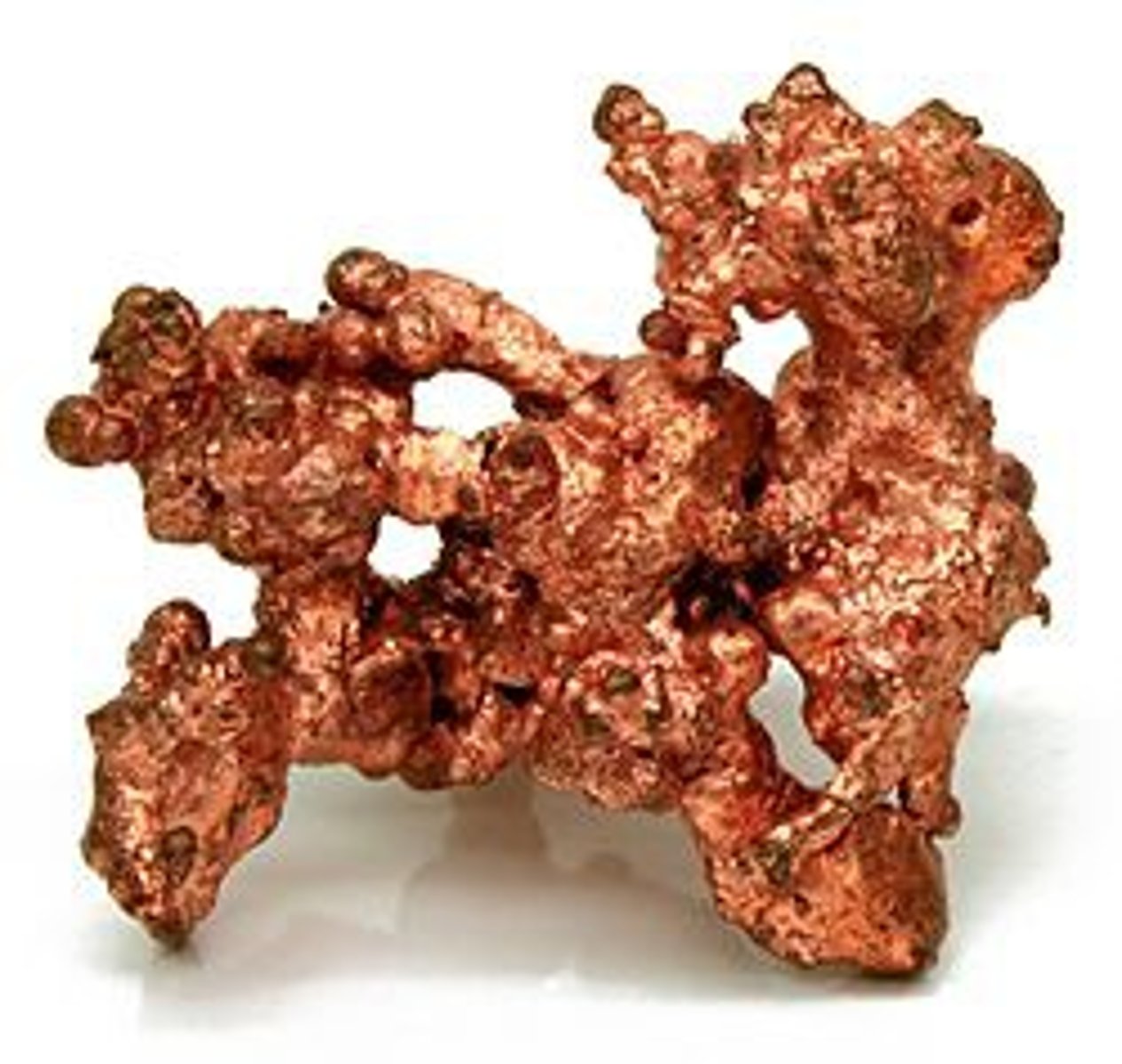
CORUNDUM
White, gray, many colors. Varieties of it are valuable gemstones - rubies, sapphires.
hardness: 9
specific gravity: 4.0-4.1
Crystal habit: steep bipyramidal, prismatic, tabular, or rhombohedral crystals, may be massive or granular
streak: white Composition: Al2O3
Luster: vitreous to adamantine, transparent to translucent
group: oxides
crystal shape: triagonal/hexagonal
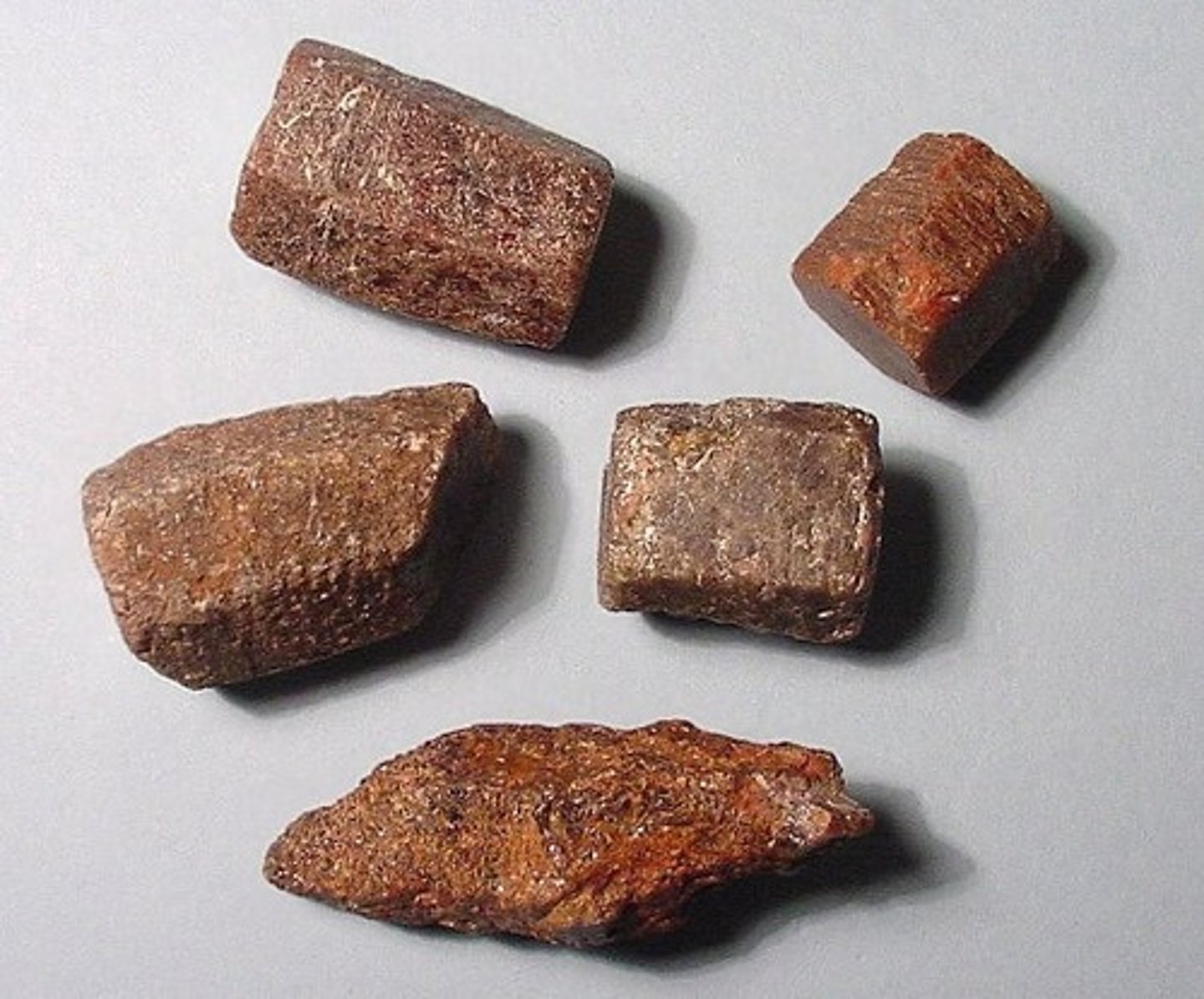
DIAMOND
Colorless, white, gray, orange, yellow, brown, pink, red, blue, green, black
hardness: 10
specific gravity: 3.52
Crystal habit: octahedra, cubes, dodecahedra, tetrahedra, may occur in rounded masses with radiating structure and as micro-crystalline masses
streak: white Composition: C
Luster: adamantine to greasy, transparent to opaque
group: native elements
crystal shape: cubic
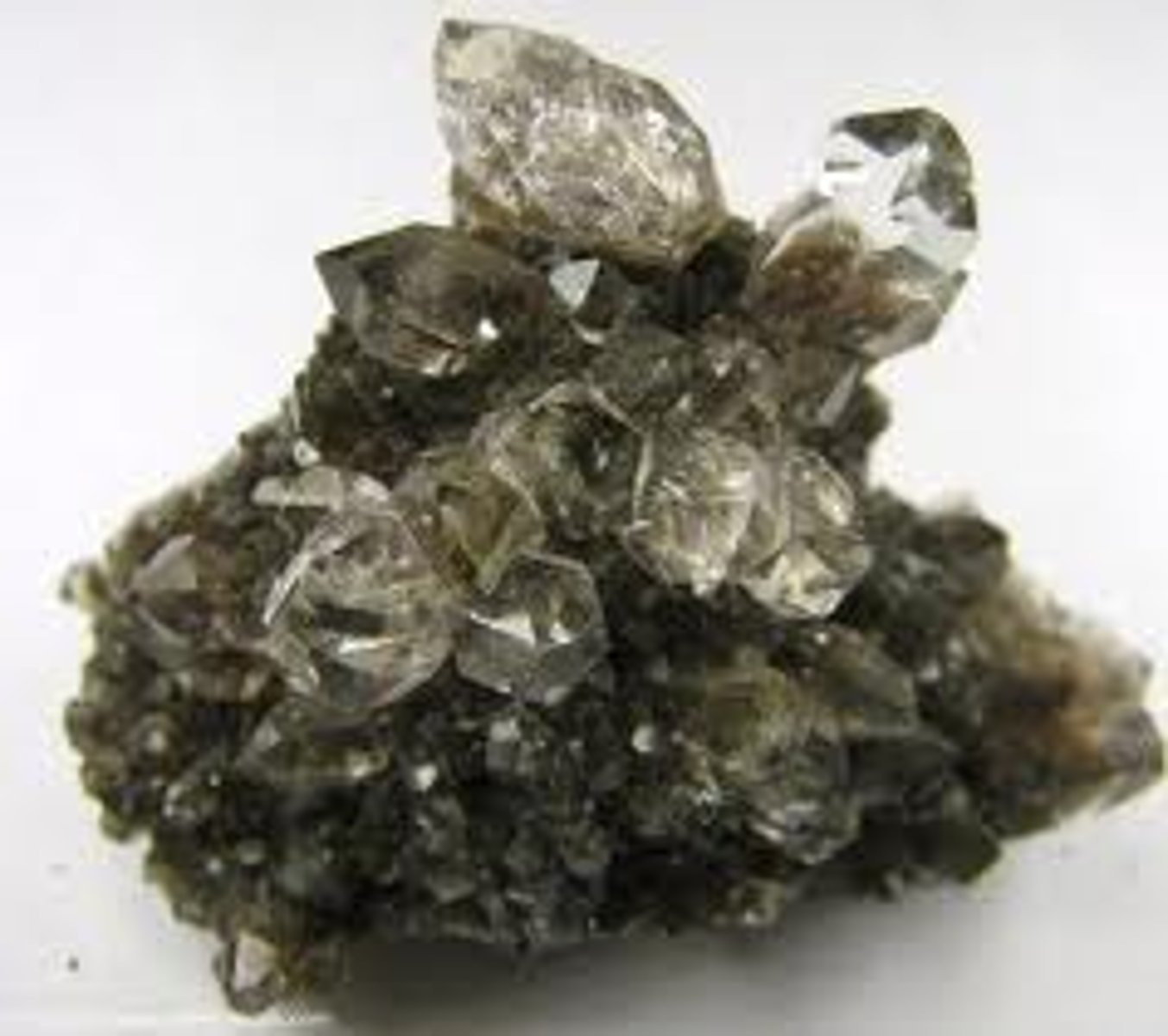
DOLOMITE (mineral)
Colorless, white, gray, pink, or brown, sometimes dark specks embedded between the crystals
hardness: 3.5-4
specific gravity: 2.85
Crystal habit: rhombohedral crystals with curved faces, may also form in massive or granular habits.
streak: white Composition: CaMg(CO3)2
Luster: vitreous to pearly, transparent to translucent
group: carbonates
crystal shape: trigonal/hexagonal
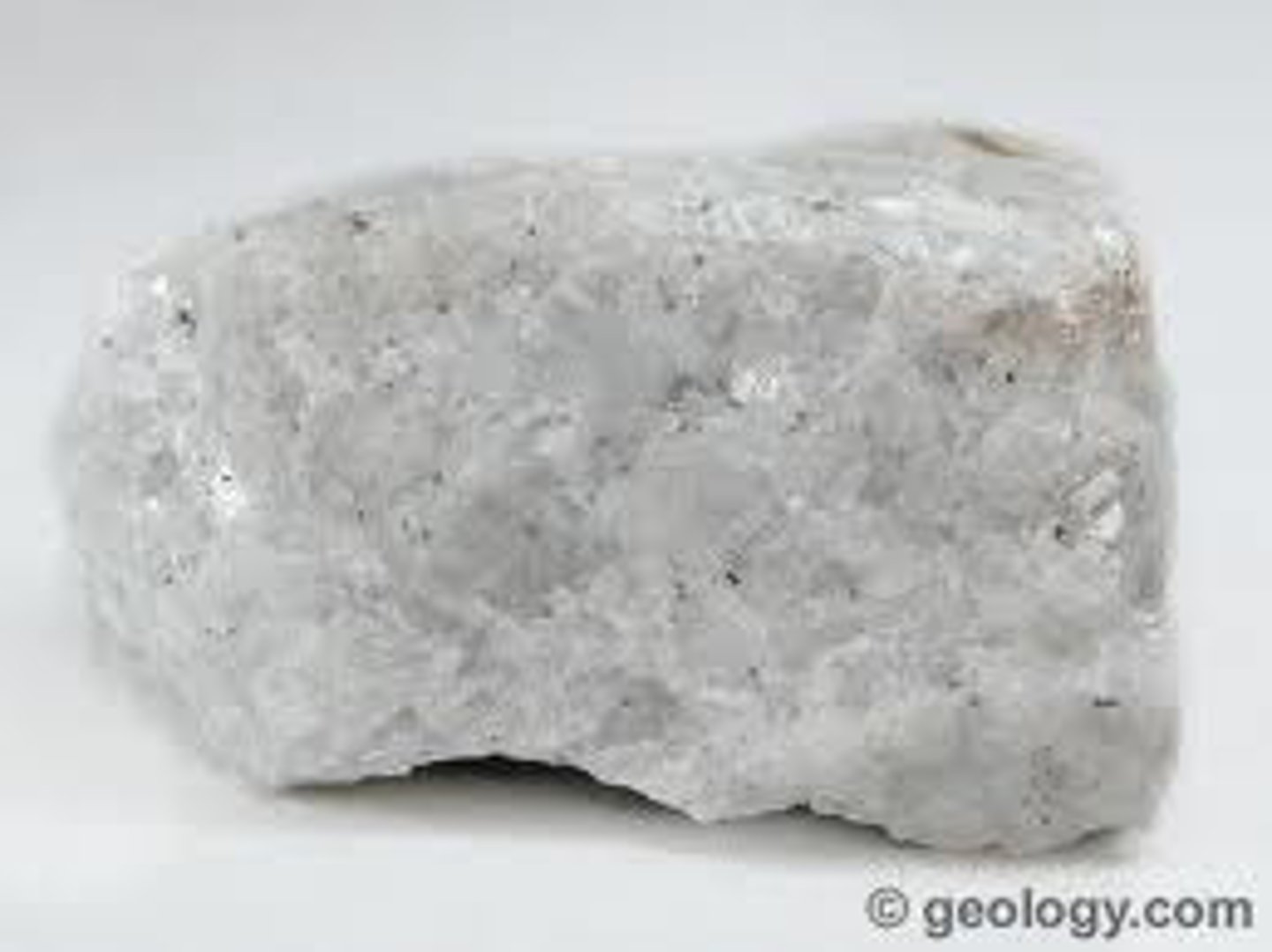
EPIDOTE
Yellowish green to green, brownish green to greenish black, or black
hardness: 6-7
specific gravity: 3.35-3.5
Crystal habit: prismatic crystals, often striated, commonly thick, tabular and acicular crystals; habit may also be massive, granular, and fibrous
streak: colorless/grayish
Composition: Ca2(Fe+3,Al)3(SiO4)3(OH)
Luster: vitreous, transparent to nearly opaque
group: silicates
crystal shape: monoclinic
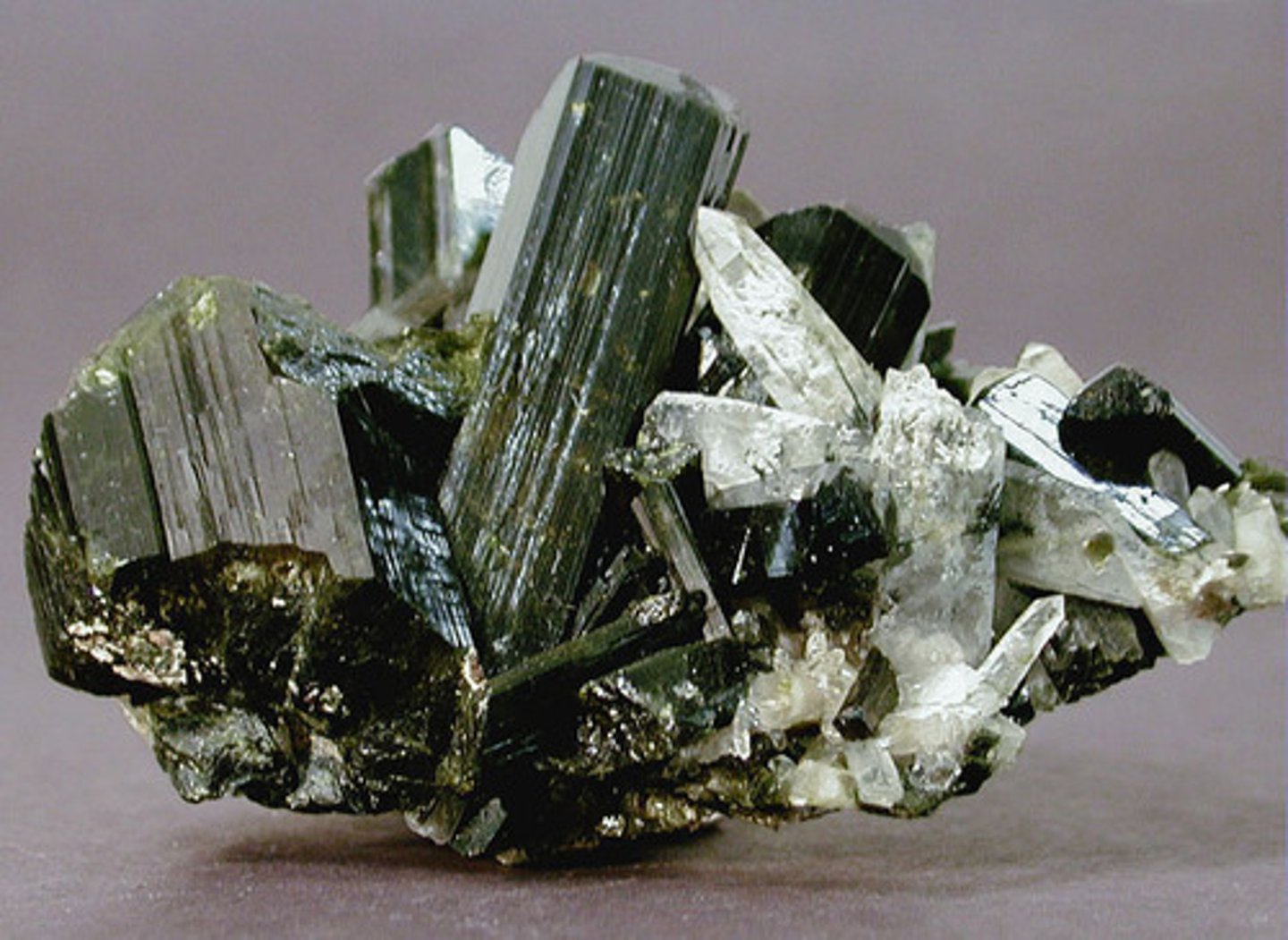
FELDSPAR (orthoclase)
White, pink, reddish, colorless, yellow, gray, green, important rock-forming mineral
hardness: 6-6.5
specific gravity: 2.55-2.63
Crystal habit: prismatic or tabular crystals, often twinned, may also be massive, lamellar, and granular
streak: white Composition: KAlSi3O8
Luster: vitreous to pearly, transparent to translucent
group: silicates
crystal shape: monoclinic
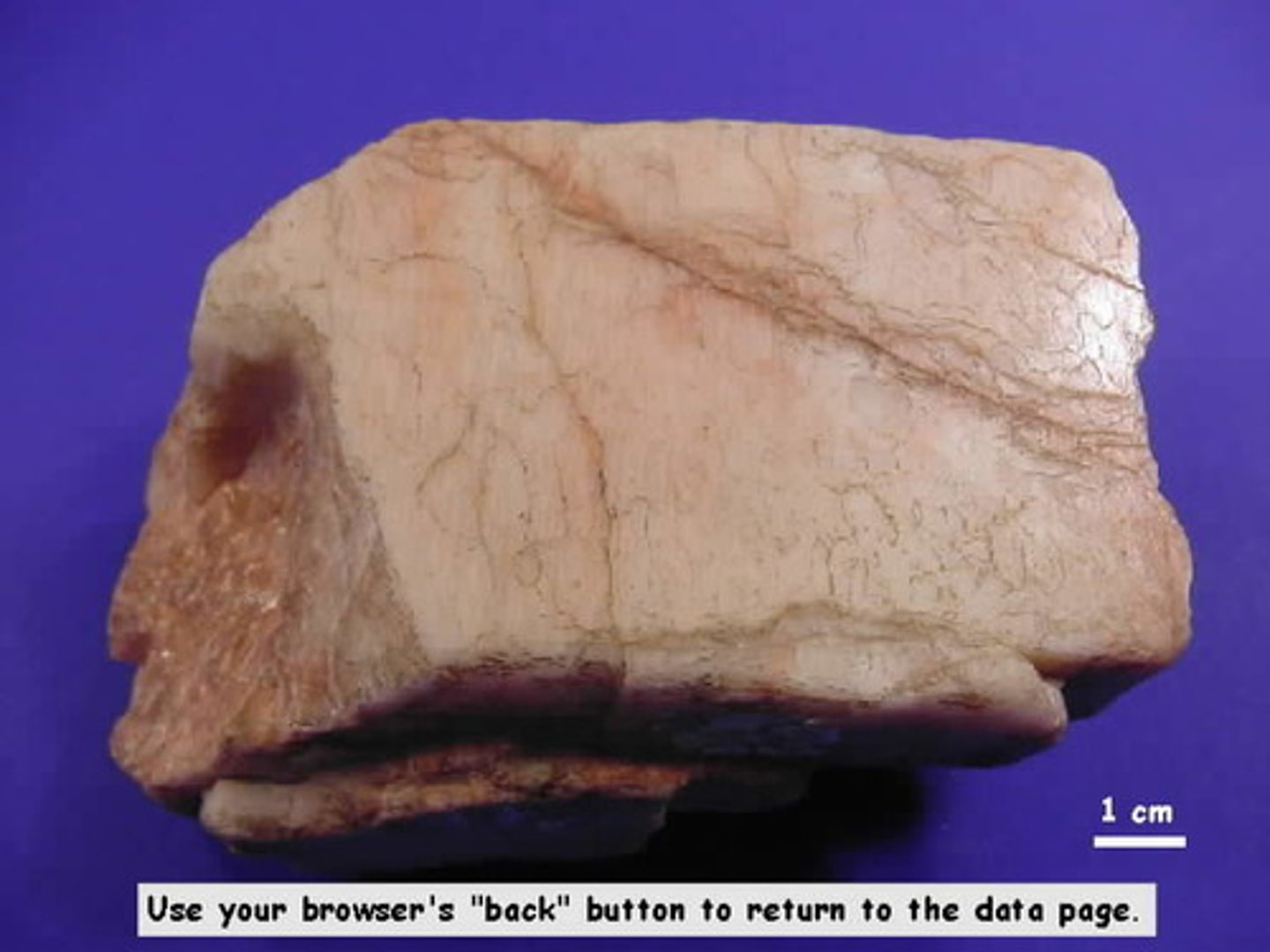
FLOURITE
Many colors including purple, green, colorless, white, yellow, pink, red, blue, black. Hard to distinguish from calcite, but it's a little harder.
hardness: 4
specific gravity: 3.1-3.3
Crystal habit: cubic and octahedral crystals, often twinned; may also be massive, granular, and compact
streak: white Composition: CaF2
Luster: vitreous, transparent to translucent
group: halides
crystal shape: cubic
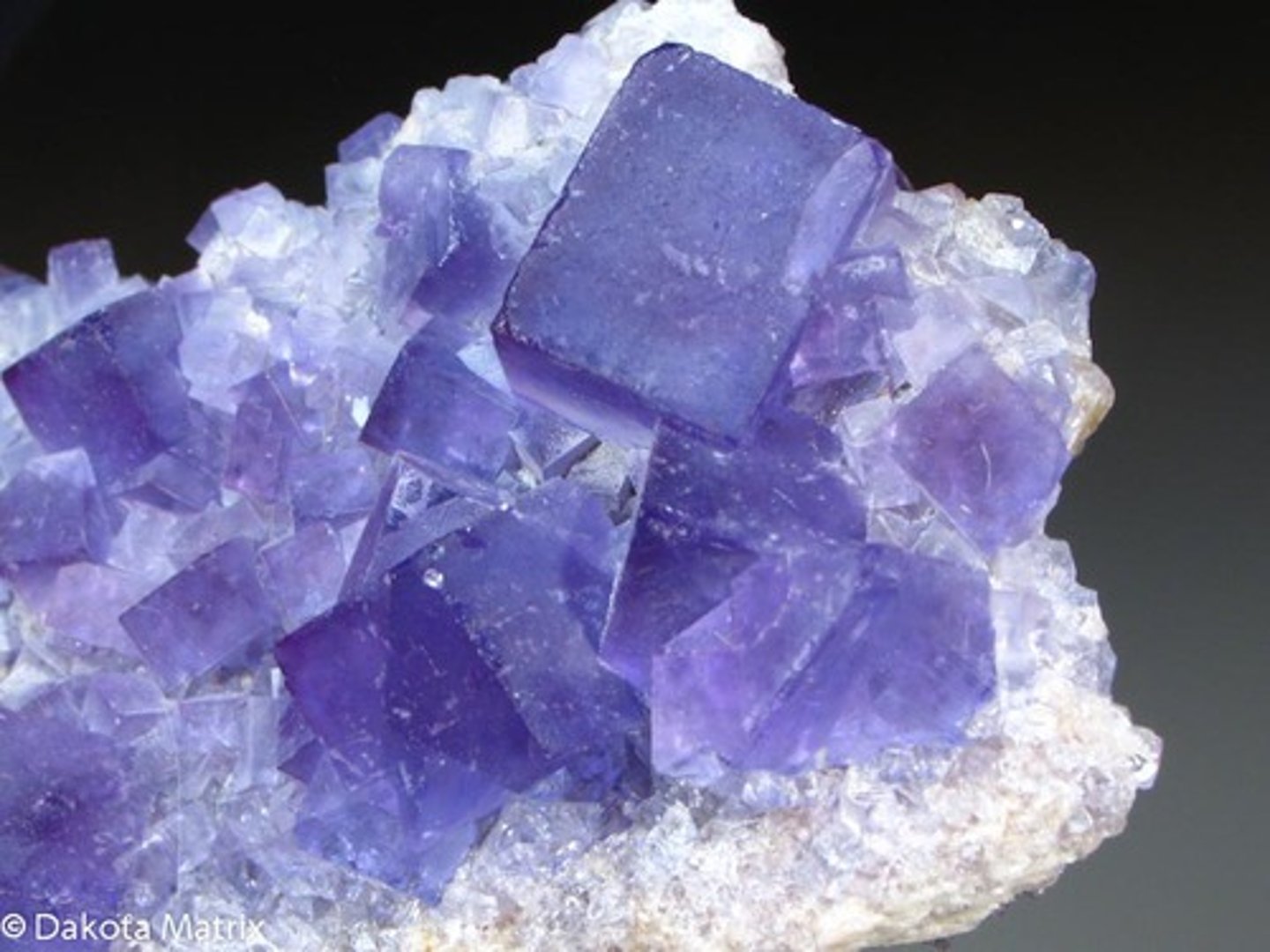
GALENA
Lead gray. It is made of lead sulfide, is very heavy, and is an important lead ore.
hardness: 2.5
specific gravity: 7.58
Crystal habit: cubic, octahedral, or cubo-octahedral crystals, may also be massive, granular, fibrous
streak: lead-gray Composition: PbS
Luster: metallic, opaque
group: sulfides
crystal shape: cubic
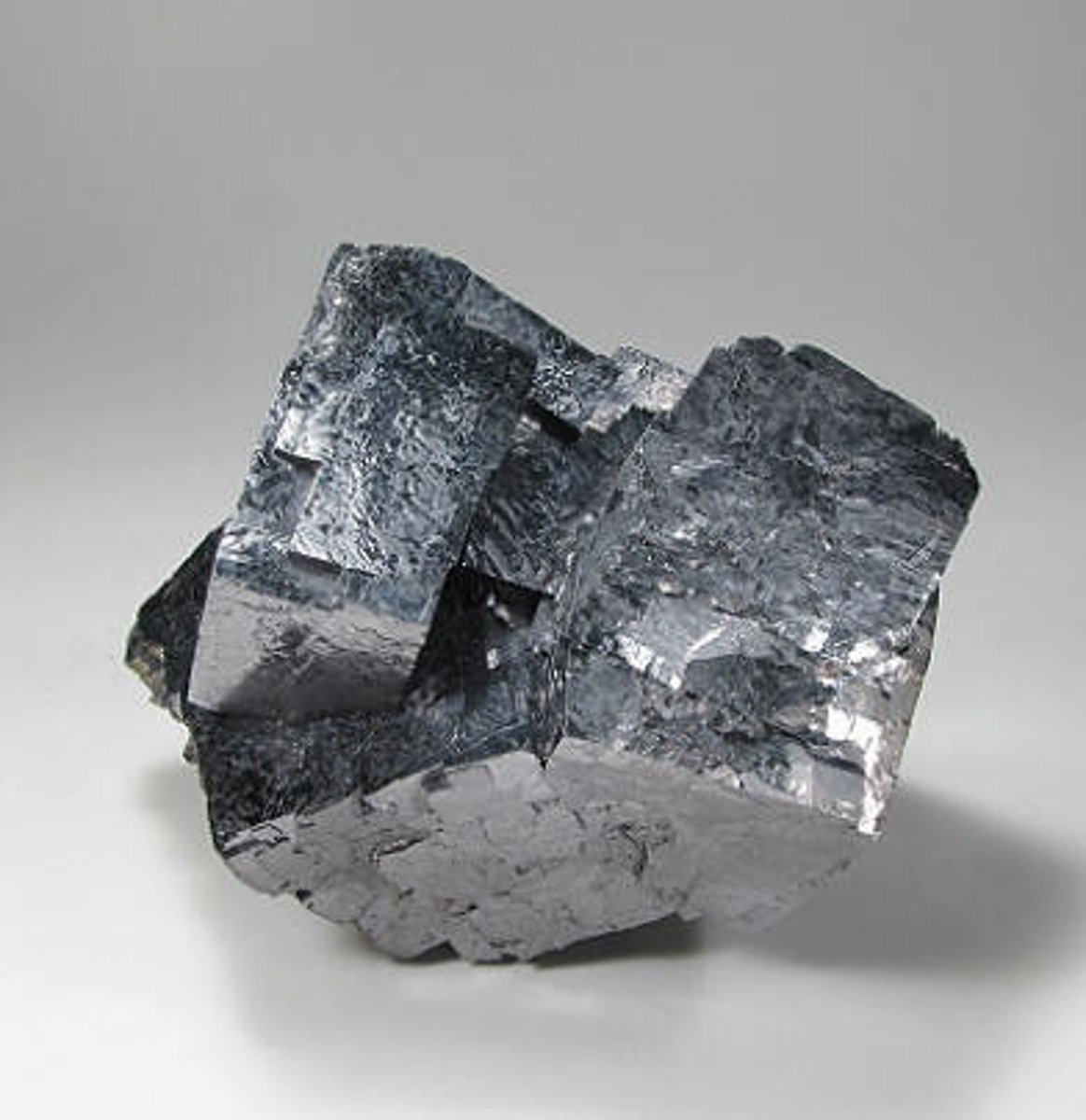
GOETHITE
Blackish brown or reddish to yellowish brown, sometimes known as the "ugly brownish yellow-black rock"
hardness: 5.0-5.5
specific gravity: 3.3-4.3
Crystal habit: massive, botryoidal, stalactitic, earthy, sometimes as vertically striated, prismatic crystals
streak: orange-brownish Composition: Fe+3O(OH)
Luster: adamantine on crystal faces, otherwise dull, opaque
group: hydroxides
crystal shape: othorhombic
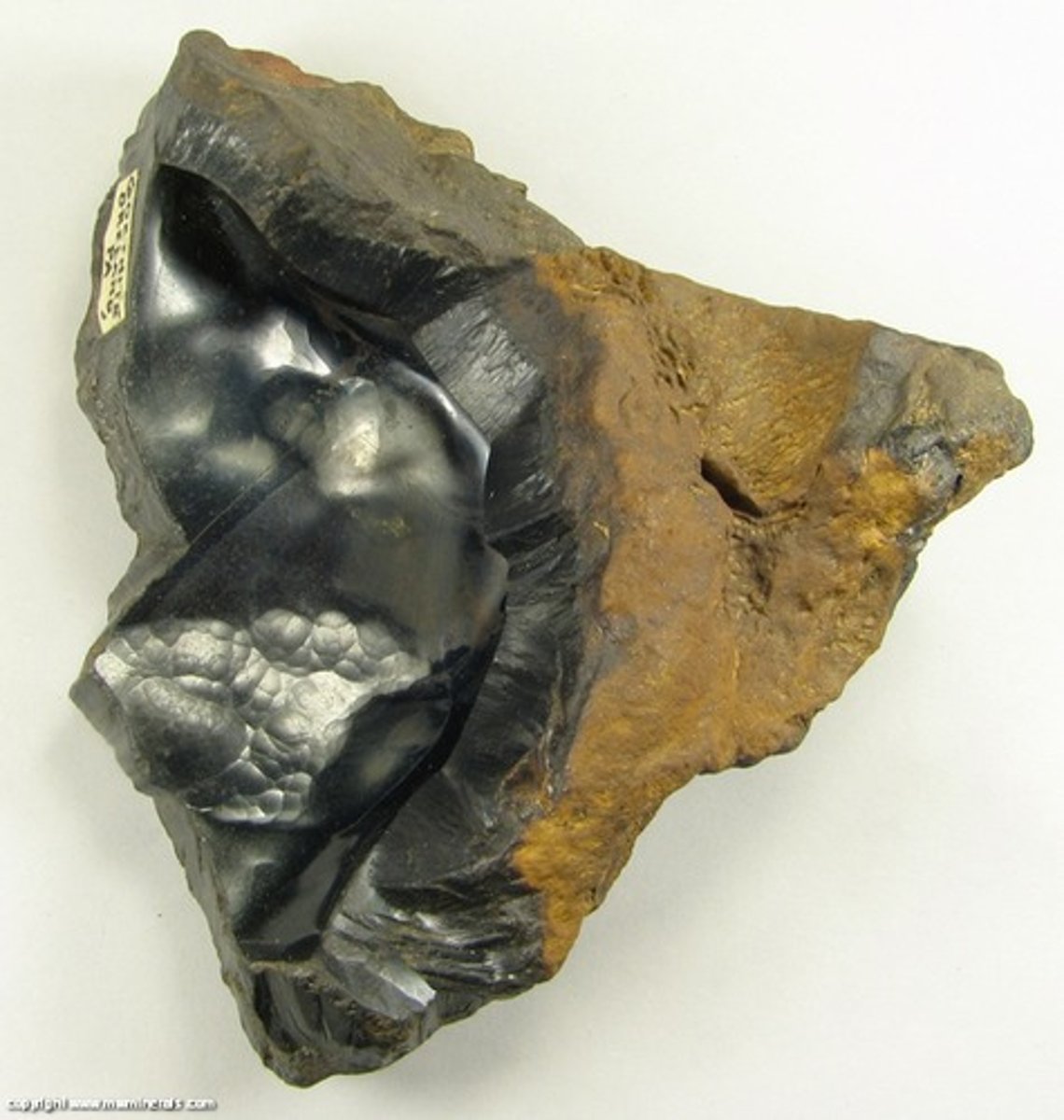
GOLD
Bright, rich yellow color.
hardness: 2.5-3
specific gravity: 19.3
Crystal habit: usually grains, flakes, nuggets, dendritic masses, crystals form as cubes or octahedral, but examples are rare
streak: golden-yellow Composition: Au
Luster: metallic, opaque
group: native elements
crystal shape: cubic
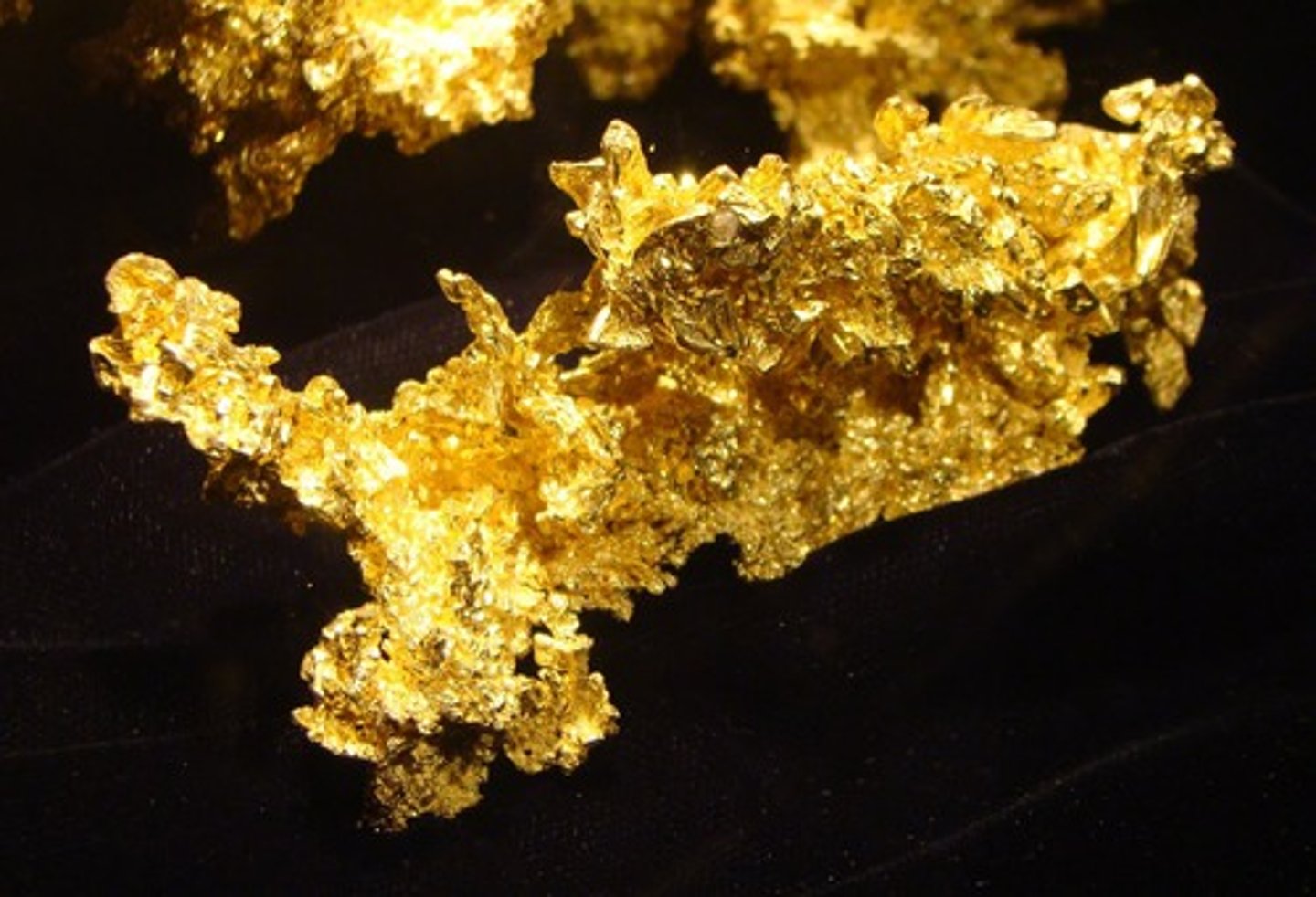
GRAPHITE
Dark gray to black and shiny. Leaves dark smudges on your hands. Used for pencil lead.
hardness: 1-2
specific gravity: 2.1-2.3
Crystal habit: crystals form as flattened, tabular, hexagonal plates, may also occur as massive, foliated, granular and earthy.
streak: dark gray or black Composition: C
Luster: dull metallic, opaque
group: native elements
crystal shape: trigonal/hexagonal
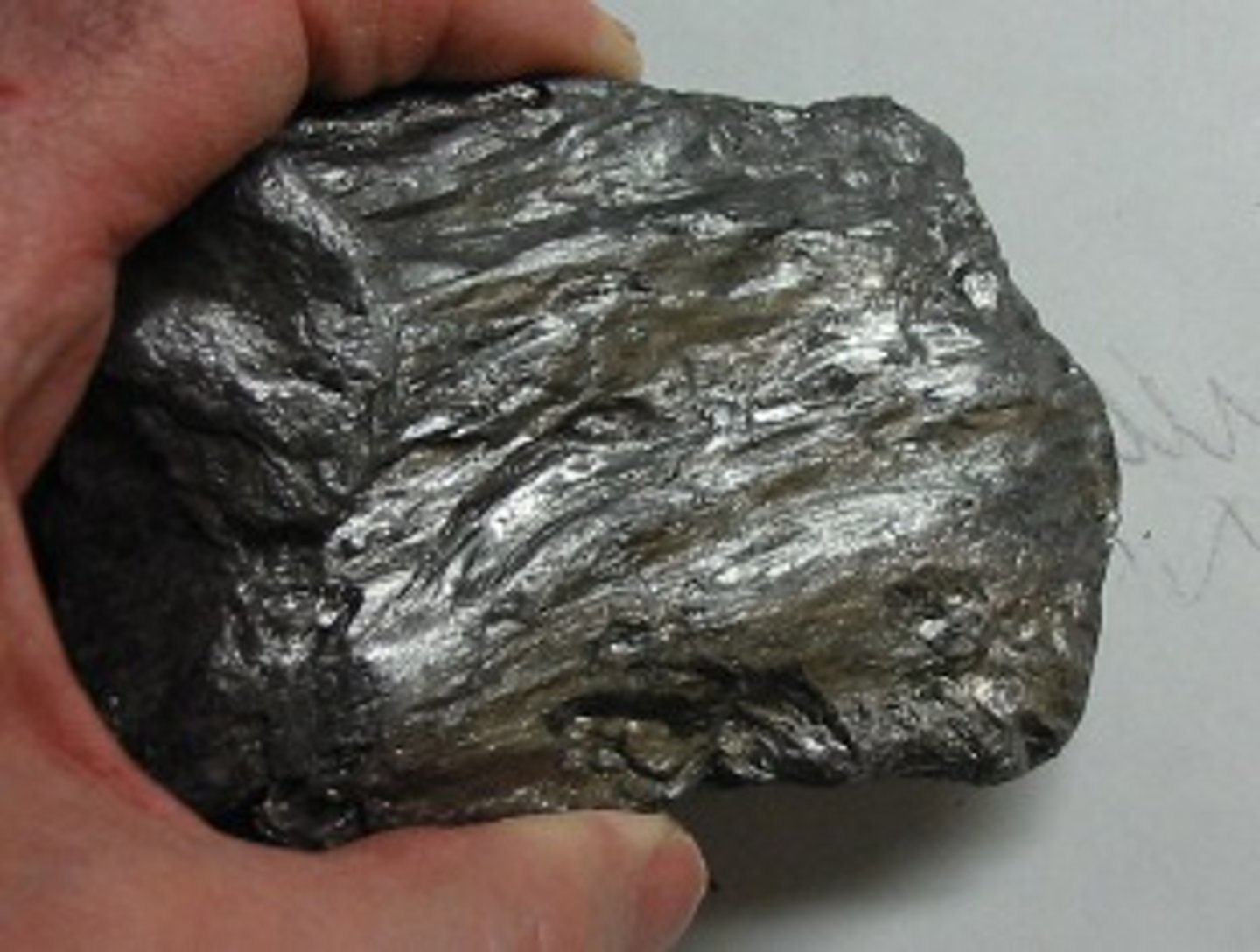
GYPSUM - ALABASTER
White, colorless, gray, yellow, red, brown. Forms as an evaporate around hot springs and in clay beds.
hardness: 2
specific gravity: 2.32
Crystal habit: Massive, granular, fine-grained variety of gypsum. Monoclinic untwined single crystals showing rhombic form common; may be twinned as arrowhead shape w/ beveled edges.
streak: White Composition: CaSO4.2H2O
Luster: vitreous, pearly on cleavage surfaces, massive forms are dull; opaque
group: Sulfates
crystal shape: monoclinic
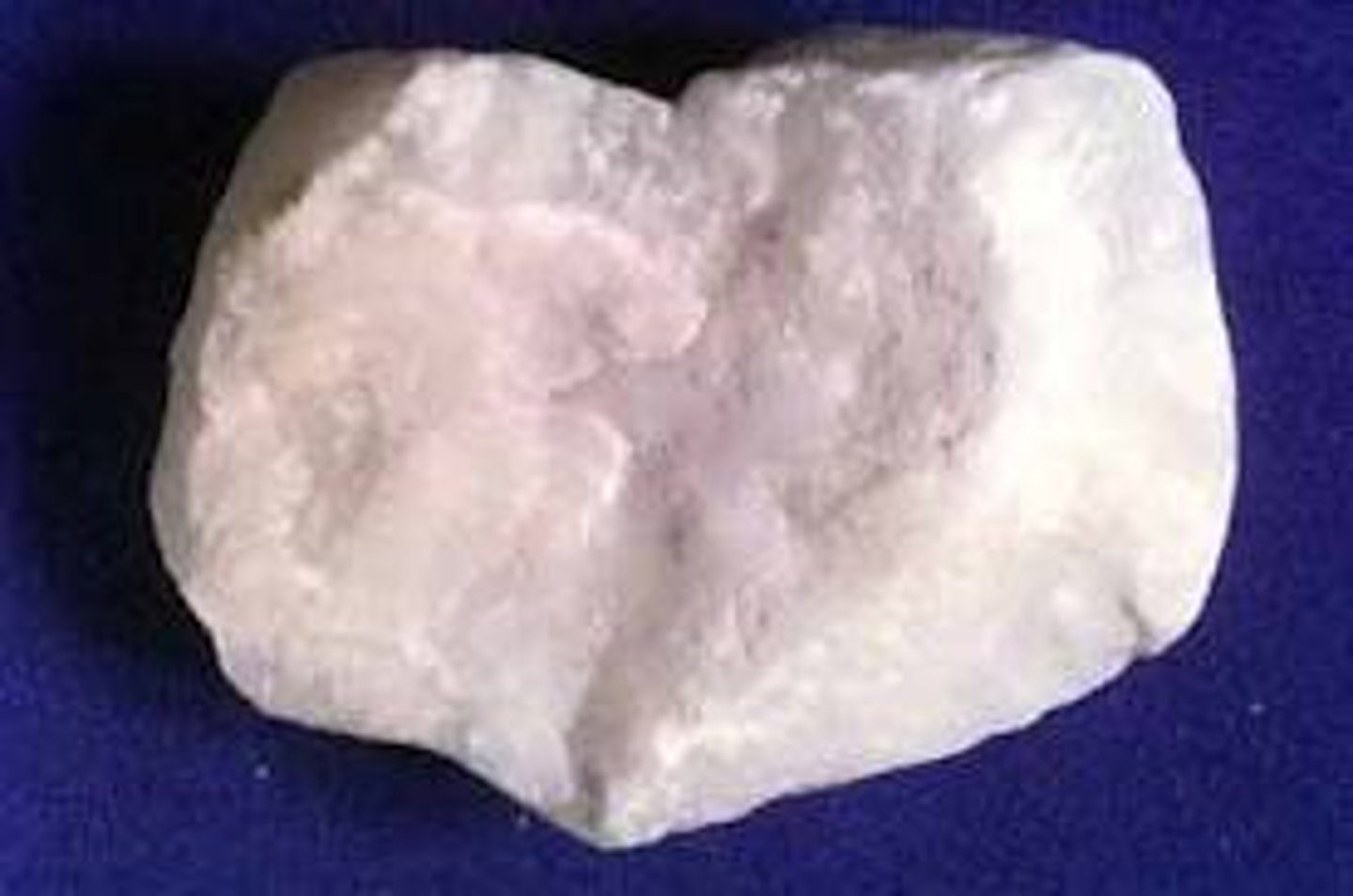
GYPSUM- SATIN SPAR
White, colorless, gray, yellow, red, brown. Forms as an evaporate around hot springs and in clay beds.
hardness: 2
specific gravity: 2.32
Crystal habit: Fibrous variety of gypsum. Monoclinic untwined single crystals showing rhombic form common; may be twinned as arrowhead shape w/ beveled edges.
streak: White Composition: CaSO4.2H2O
Luster: silky; opaque
group: Sulfates
crystal shape: monoclinic
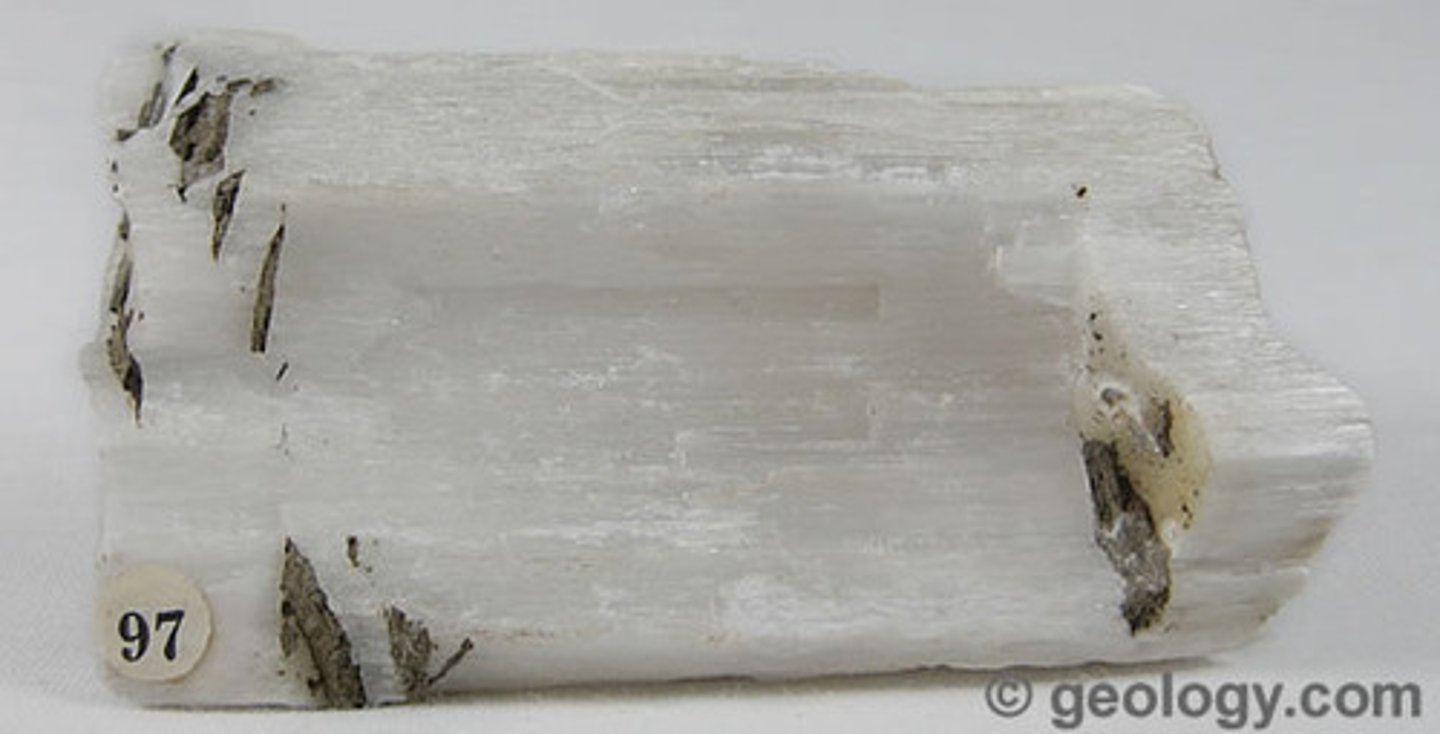
GYPSUM - SELENITE
White, colorless. Forms as an evaporate around hot springs and in clay beds. Transparent variety of gypsum.
hardness: 2
specific gravity: 2.32
Crystal habit: Monoclinic untwined single crystals showing rhombic form common; may be twinned as arrowhead shape w/ beveled edges.
streak: White Composition: CaSO4.2H2O
Luster: vitreous, pearly on cleavage surfaces; transparent
group: Sulfates
crystal shape: monoclinic
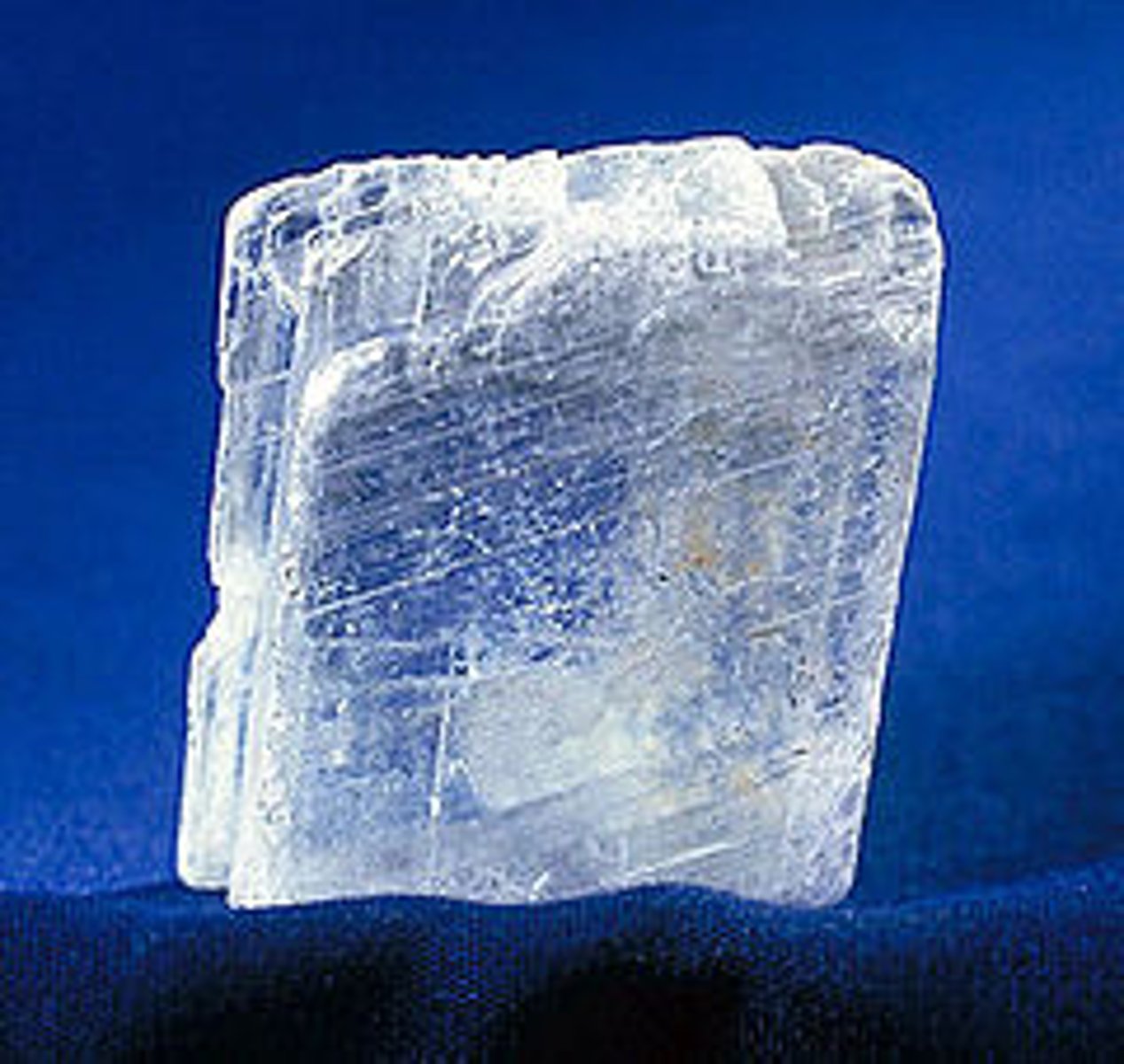
HALITE
White, colorless, orange, yellow, reddish, blue, pruple, black. Rock Salt, evaporite, readily soluble. Tasting specimens is against the rules in Science Olympiad, but smelling them is not and salt has a distinct smell along with a greasy feel.
hardness: 2
specific gravity: 2.1-2.2
Crystal habit: crystals are cube-shaped, frequently with concave faces, rarely crystals are octahedral; habit may also occur as massive, granular, and compact.
streak: White Composition: NaCl
Luster: vitreous, transparent to translucent
group: Halides
crystal shape: Cubic
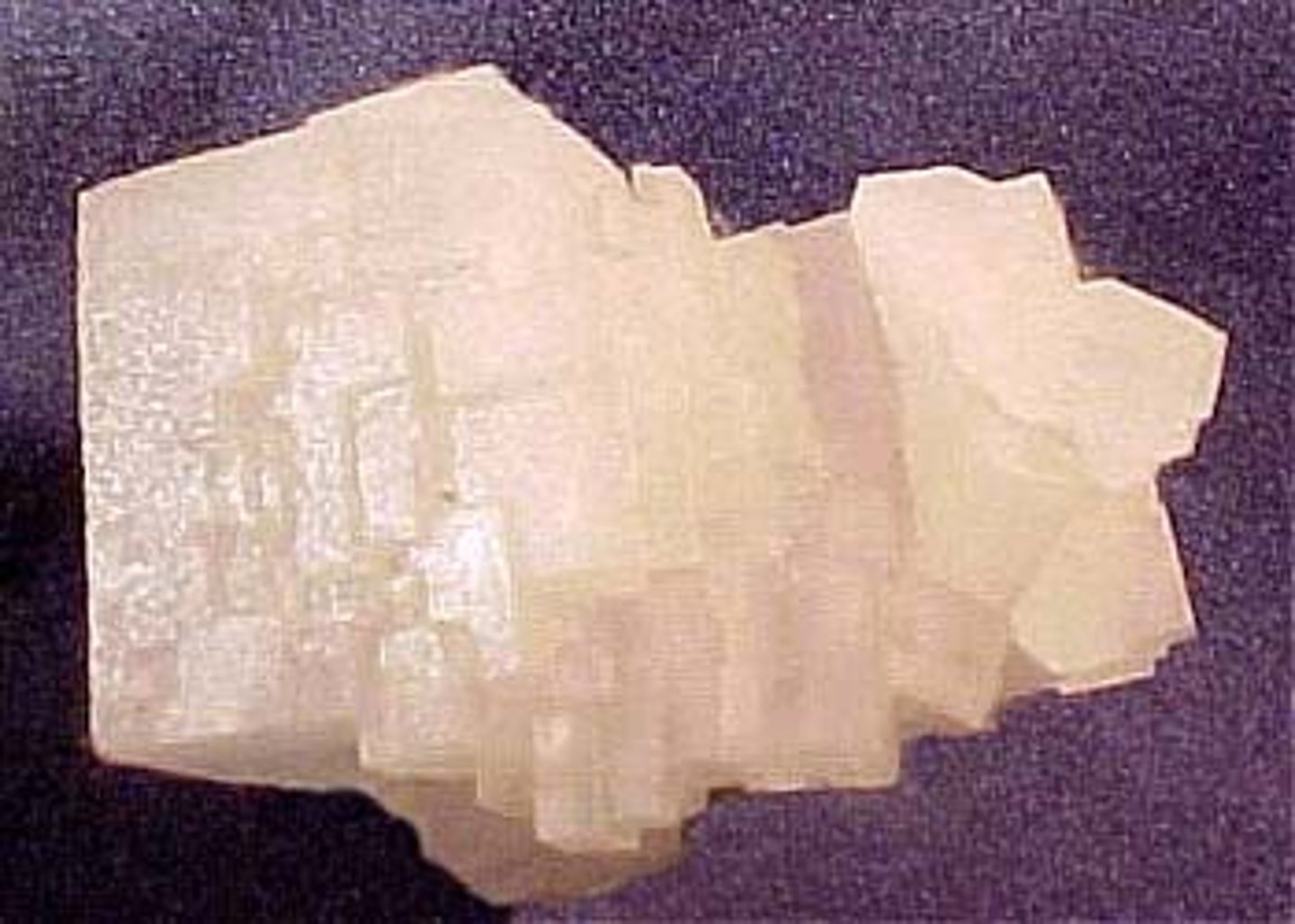
HEMATITE
Brownish, bright red, blood-red, and brownish red, steel-gray, iron-black. Iron ore, often metallic.
Hardness: 5-6
Specific gravity: 5.26
Crystal habit: Crystals are tabular or rhombohedral, occasionally prismatic or pyramidal. Tabular crystals may form rosettes. Other habits are massive, compact, columnar, fibrous, reniform, botryoidal, stalactic, foliated, and granular.
Streak: brownish-red Composition: Fe2O3
Luster: metallic to dull luster, opaque
Group: Oxides
Crystal shape: trigonal/hexagonal
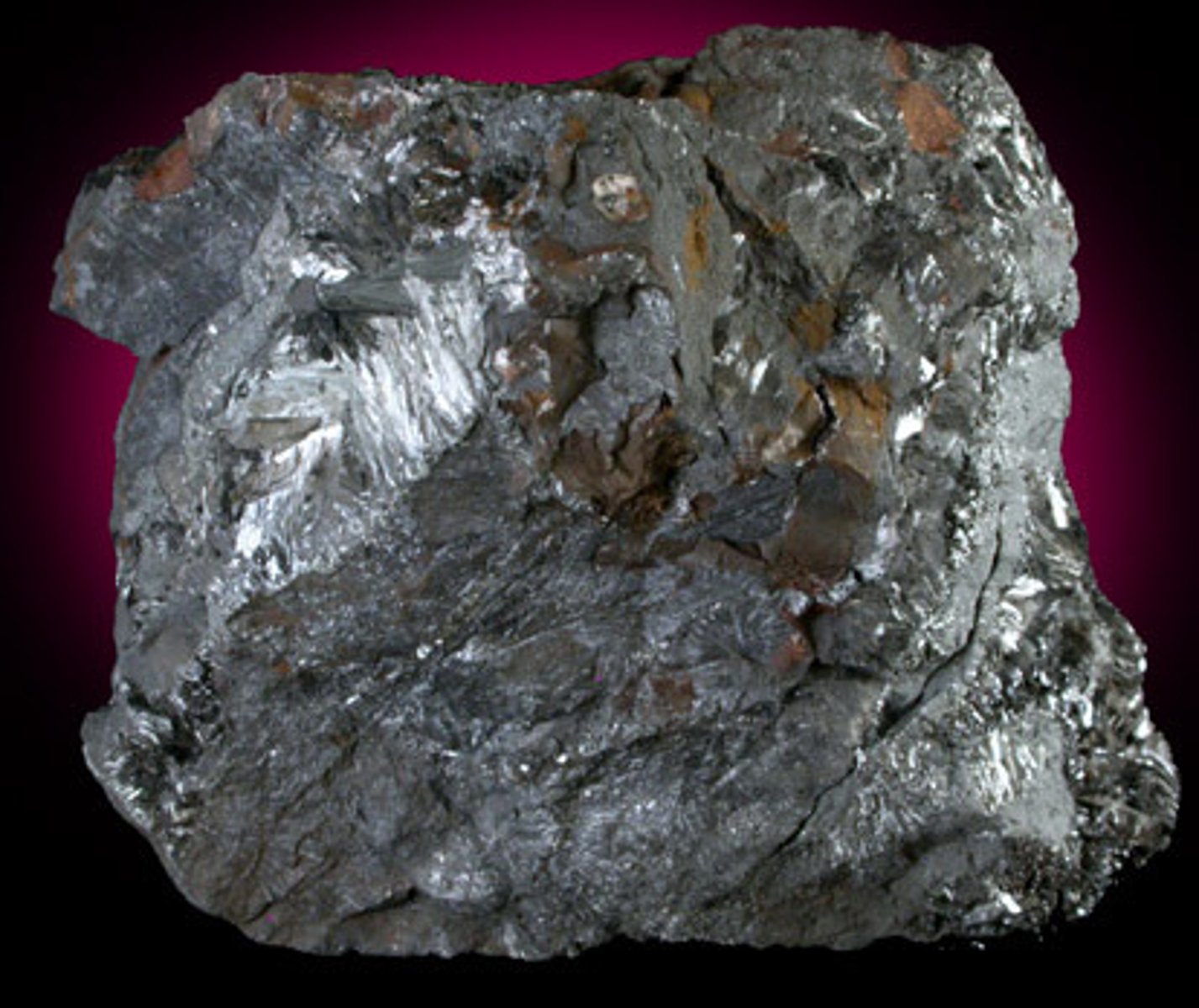
HORNBLENDE
Green, greenish brown, or black, amphibole group
Hardness: 5-6
Specific gravity: 3.28-3.41
Crystal habit: Prismatic crystals, often twinned, habit also occur as massive, compact, granular, columnar, bladed, fibrous.
Streak: white or gray
Composition: Ca2(Mg,Fe)4Al(Si7Al)O22(OH,F)2
Luster: vitreous, translucent to opaque
Group: Silicates
Crystal shape: monoclinic
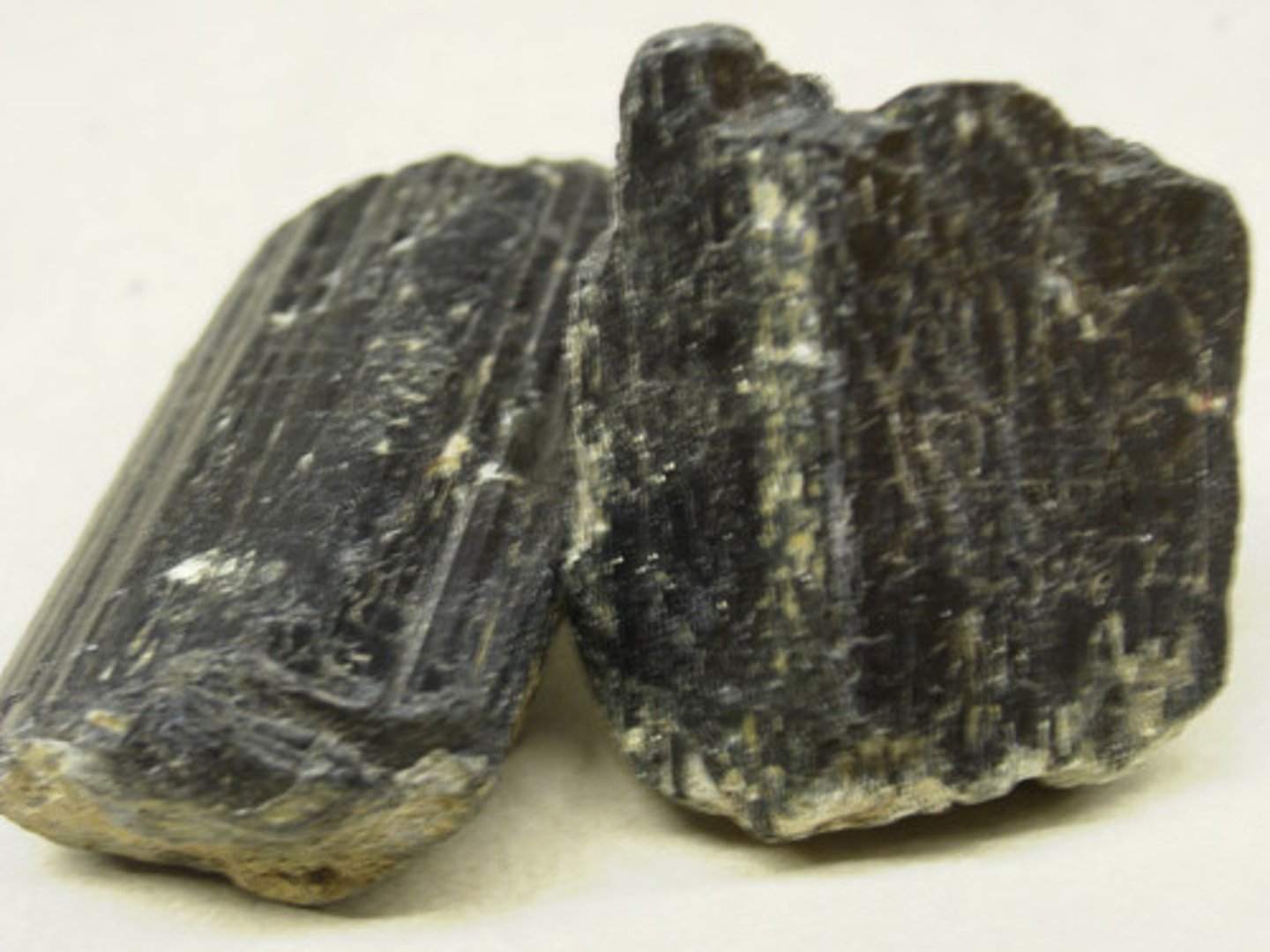
KAOLINITE
White and colorless, to yellowish, brownish, reddish, or bluish. Looks like chalk, but is actually clay.
Hardness: 2.0-2.5
Specific gravity: 2.6-2.63
Crystal habit: forms very small pseudo-hezagonal platelets or scales, habit may also occur as massive, compact, earthy, clayey.
Streak: white Composition: Al2Si2O5(OH)4
Luster: pearly to dull or earthy, transparent to translucent
Group: Silicates
Crystal shape: triclinic
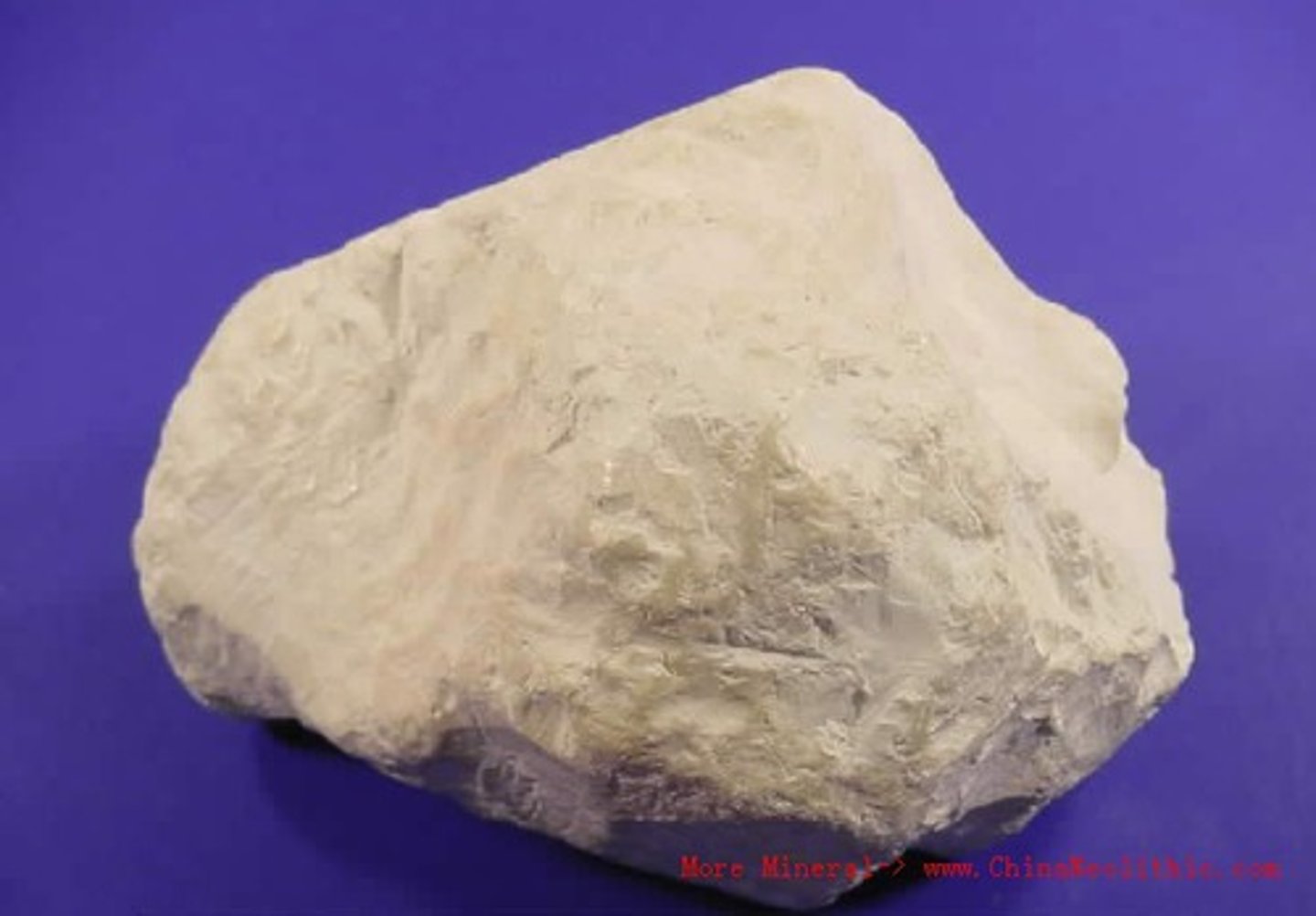
LEPIDOLITE
Pink, purple, grayish, white, colorless. A type of mica so it is sometimes found in sheets. Forms in igneous rocks such as granite and pegmatite.
Hardness: 2.5-4
Specific gravity: 2.8-3.3
Crystal habit: tabular, pseudo-hexagonal crystals, and as scaly aggregates and cleavable masses.
Streak: colorless
Composition: K(Li,Al)3(Si,Al)4O10(F,OH)2
Luster: pearly, transparent to translucent
Group: Silicates
Crystal shape: monoclinic
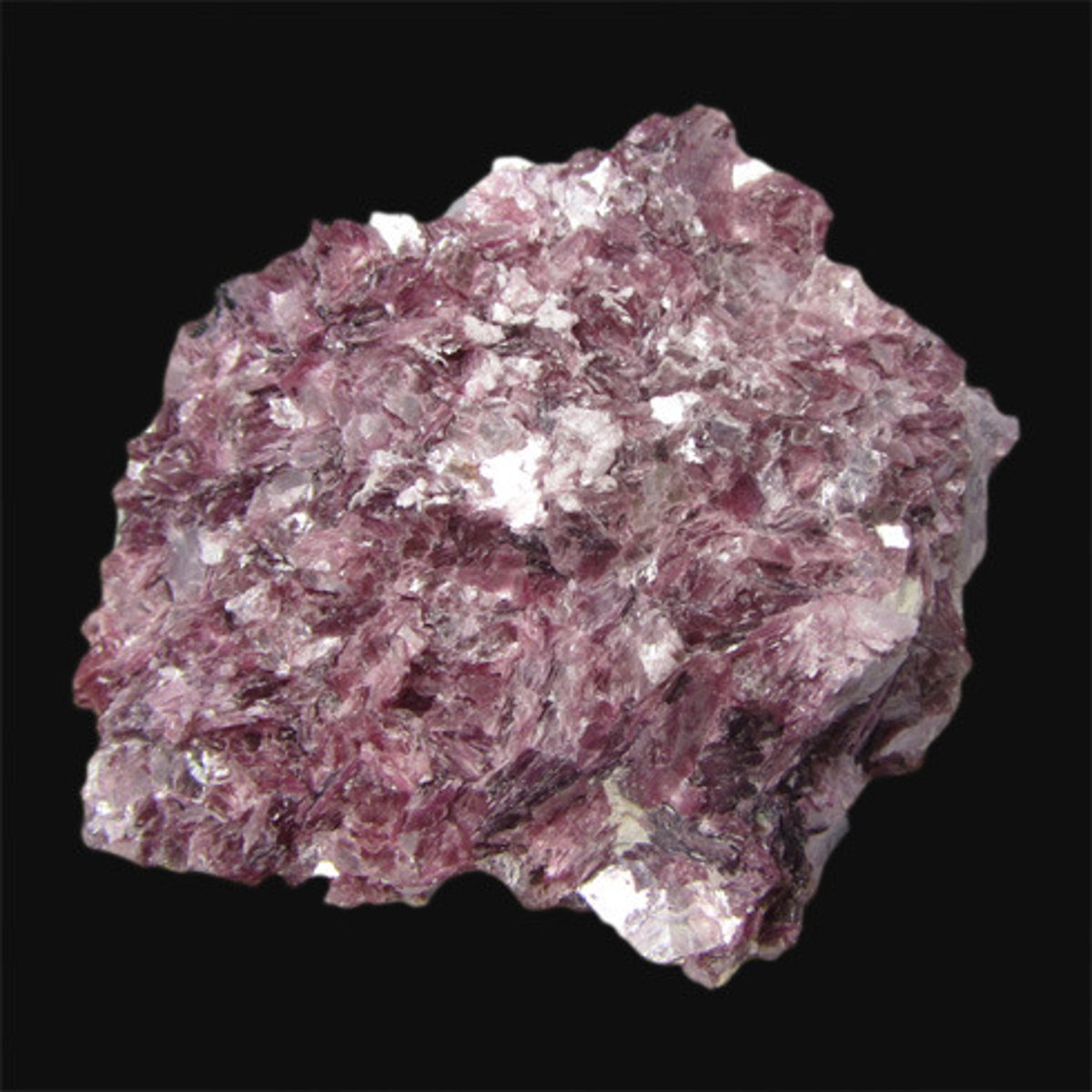
MAGNETITE
Dark gray to black. Looks a lot like hematite, except it's magnetic. If you don't have the equipment to check for that, it has a gray or black streak; hematite's streak is brownish-red.
Hardness: 4
Specific gravity: 4.3
Crystal habit: striated, prismatic crystals, often in bundles, twinning is common. May also occur in massive, fibrous, columnar, concretionary, and stalactitic habits.
Streak: gray to black, may be reddish brown
Composition: Mn+3O(OH)
Luster: submetallic, opaque
Group: Hydroxides
Crystal shape: monoclinic
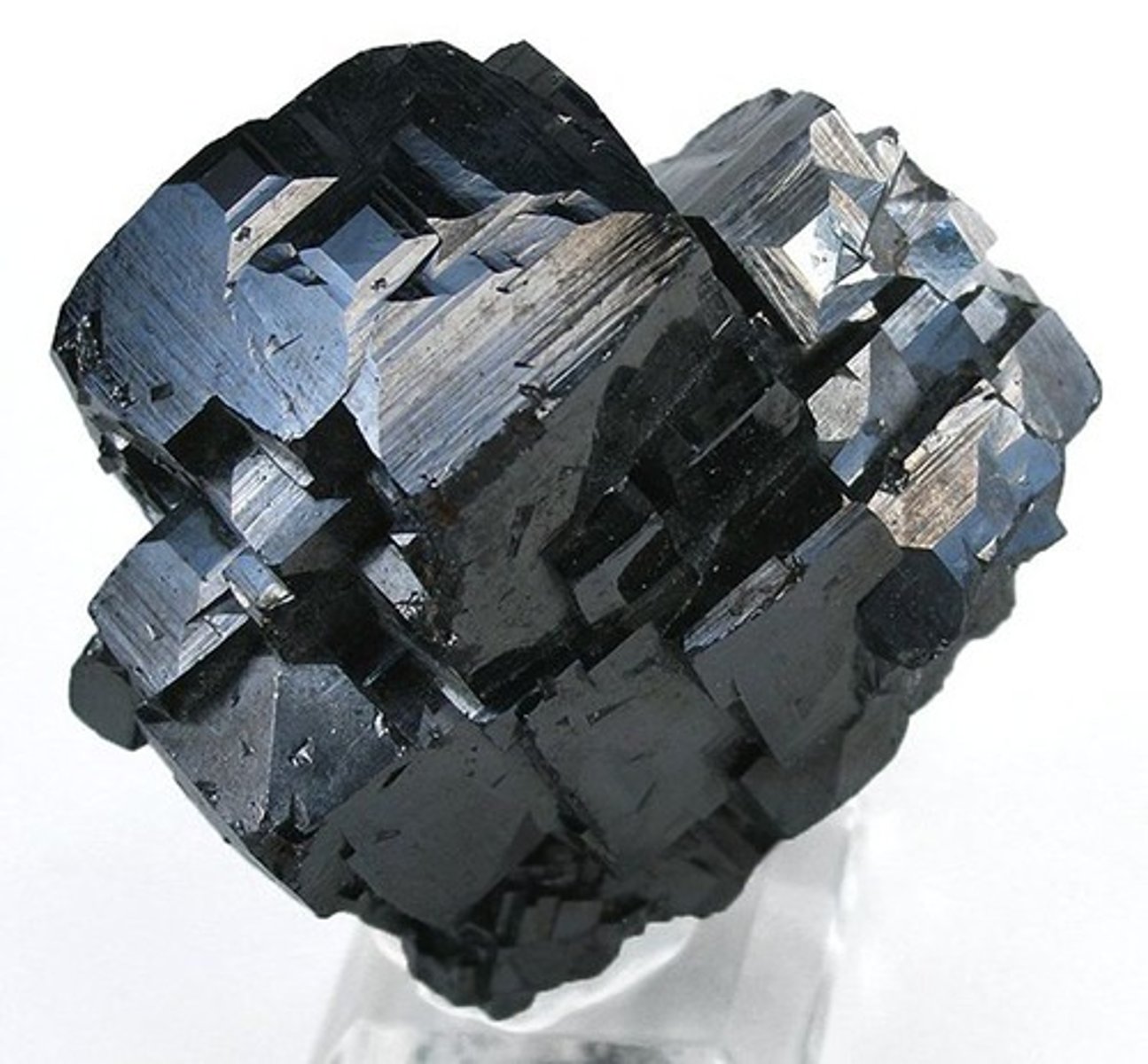
MALACHITE
Always a rich green. Forms in oxidized regions of copper deposits, often with azurite.
Hardness: 3.5-4
Specific gravity: 4.0
Crystal habit: Most usual habits are stalactitic, botryoidal masses with a fibrous, banded structure and crusts. When crystals occur, they are acicular or prismatic and often twinned.
Streak: pale green
Composition: Cu2(+2)(CO)3(OH)2
Luster: vitreous to adamantine on crystal faces; fibrous habits have a silky luster; translucent to opaque
Group: Carbonates
Crystal shape: monoclinic
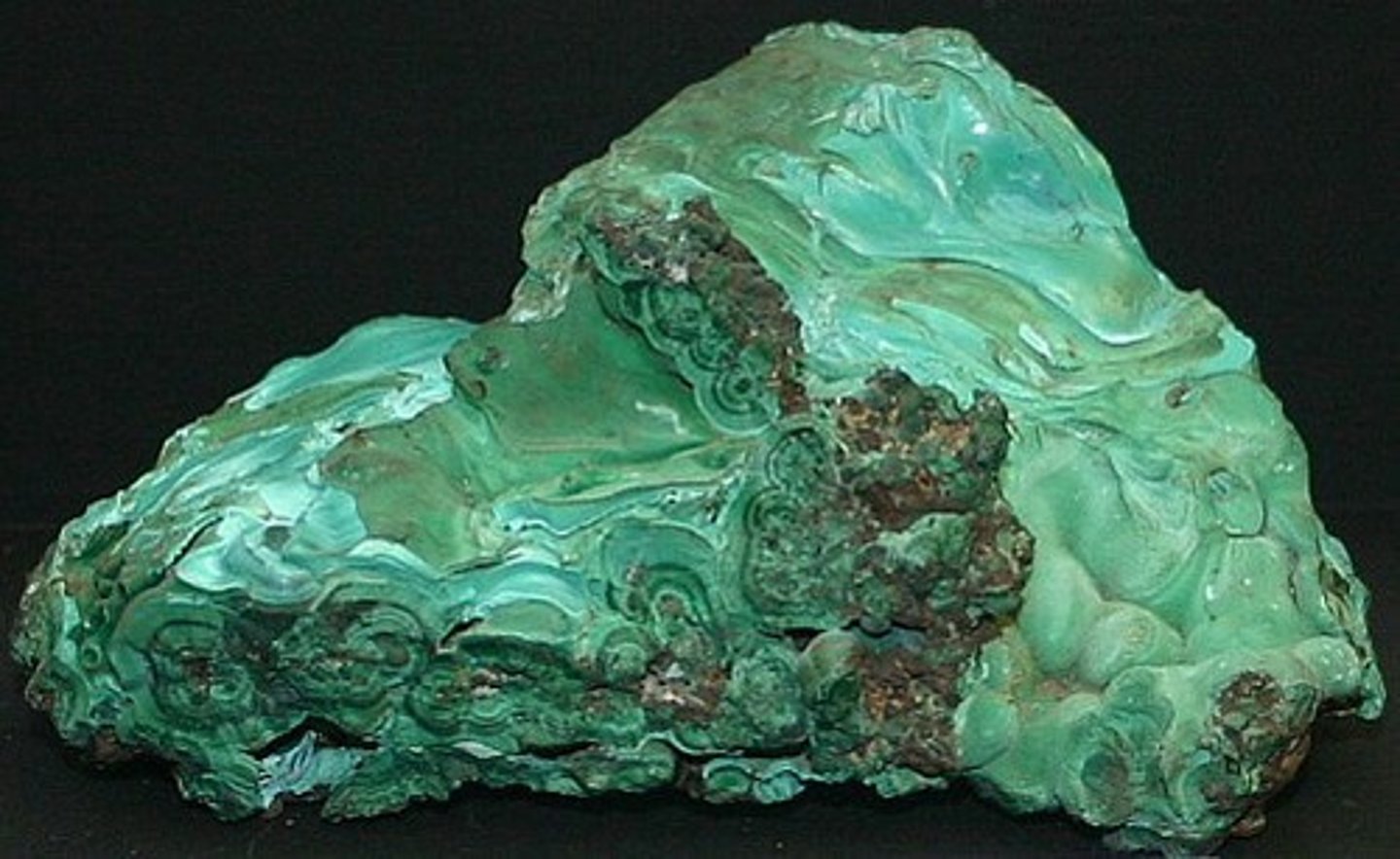
MUSCOVITE
Colorless, white, gray, may be tinged with yellow, green brown, red, or violet. Forms in igneous rocks, esp. granite and metamorphic rock, such as schist and gneiss, esp. mica schist.
Hardness: 2.5-4
Specific gravity: 2.77-2.88
Crystal habit: tabular, pseudo-hexagonal, often twinned crystals. Other habits are lamellar and cryptocrystalline. Also forms as scaly and compact masses and disseminated flakes.
Streak: colorless
Composition: KAl2(Si3Al)O10(OH,F)2
Luster: vitreous to pearly, transparent to translucent
Group: silicates
Crystal shape: monoclinic
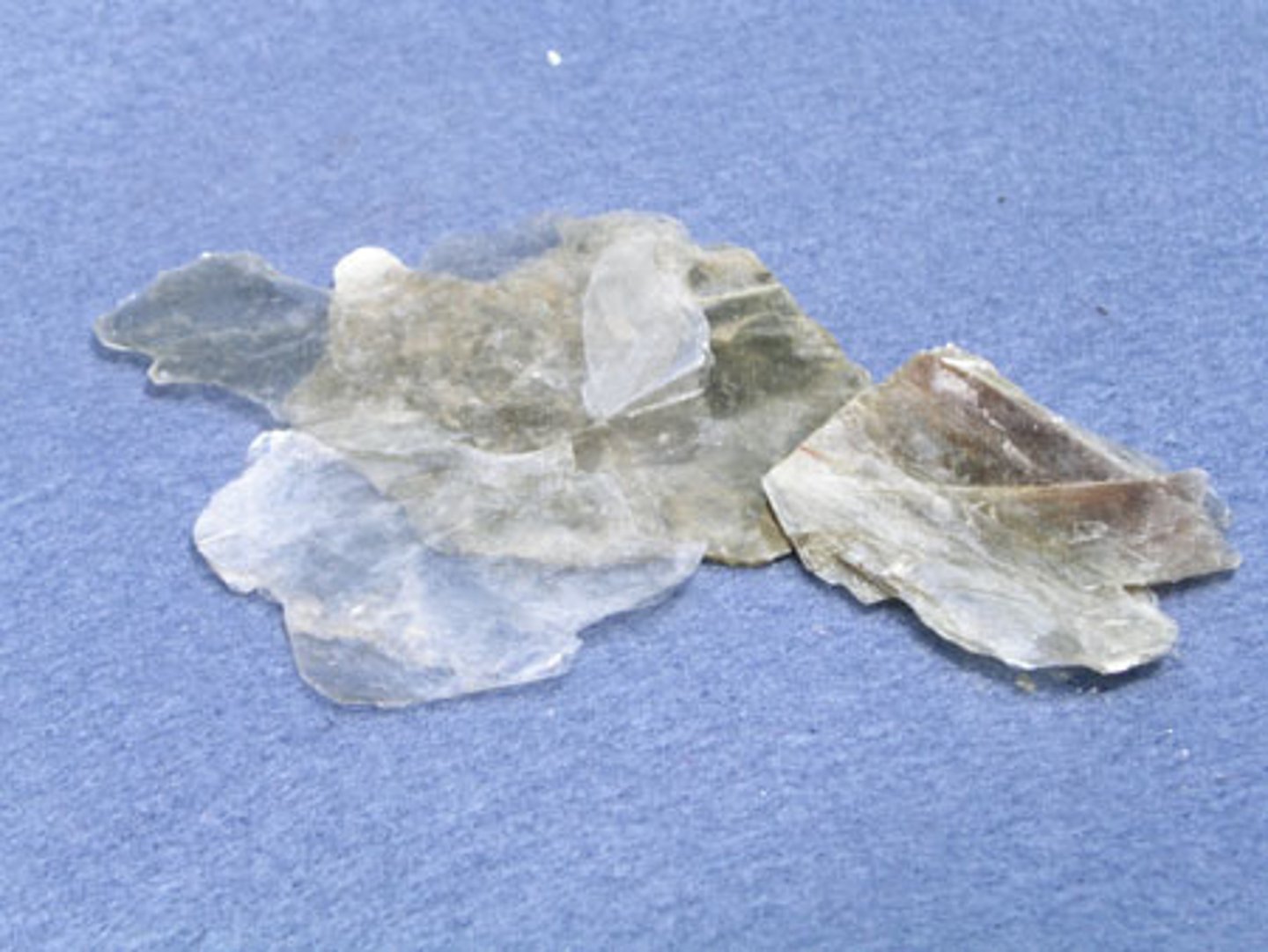
OLIVINE
Green, greenish yellow, yellowish brown, brown, and white. Gem variety is called peridot.
Hardness: 6.5-7
Specific gravity: 3.27-4.32
Crystal habit: thick, tabular crystals, frequently with wedge-shaped terminations. Other habits are massive, compact, and granular.
Streak: colorless
Composition: Mg2SiO4-Fe2SiO4
Luster: vitreous, transparent to translucent
Group: Silicates
Crystal shape: orthorhombic
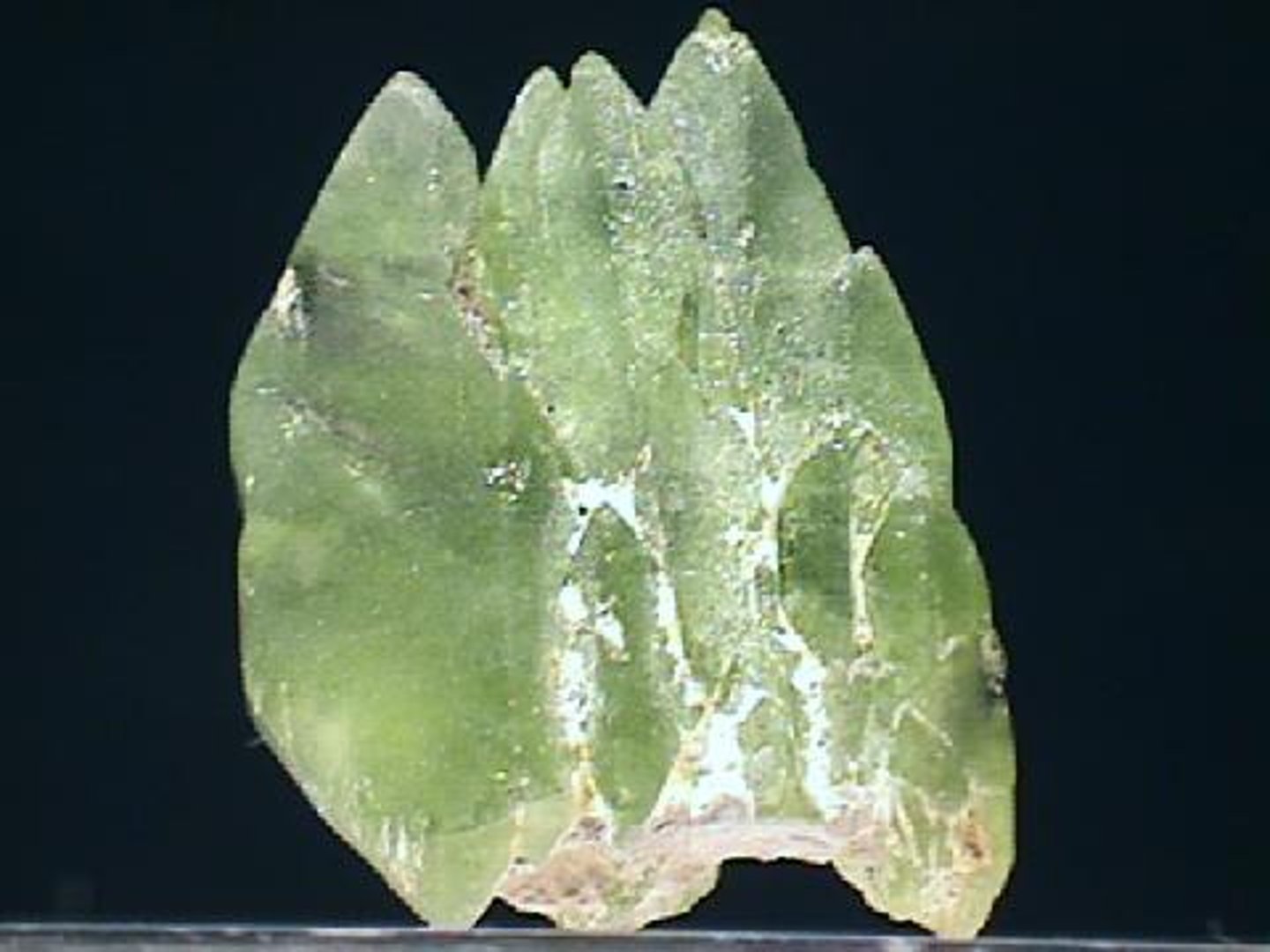
OPAL
Precious opal is white or black and iridescent with a brilliant interplay of colors, commonly red, blue, and yellow caused by included water. Common opal is gray, black, or green and has no interplay of colors.
Hardness: 5.5-6.6
Specific gravity: 1.9-2.3
Crystal structure: Crystal structure is amorphous, meaning without clearly defined structure or form. Opal forms in many habits including massive, botryoidal, reniform, stalactitic, globular, and concretionary.
Streak: white Composition: SiO2,nH2O
Luster: vitreous most common, also resinous, waxy, pearly; transparent to opaque
Group: Oxides
Crystal shape: amorphous
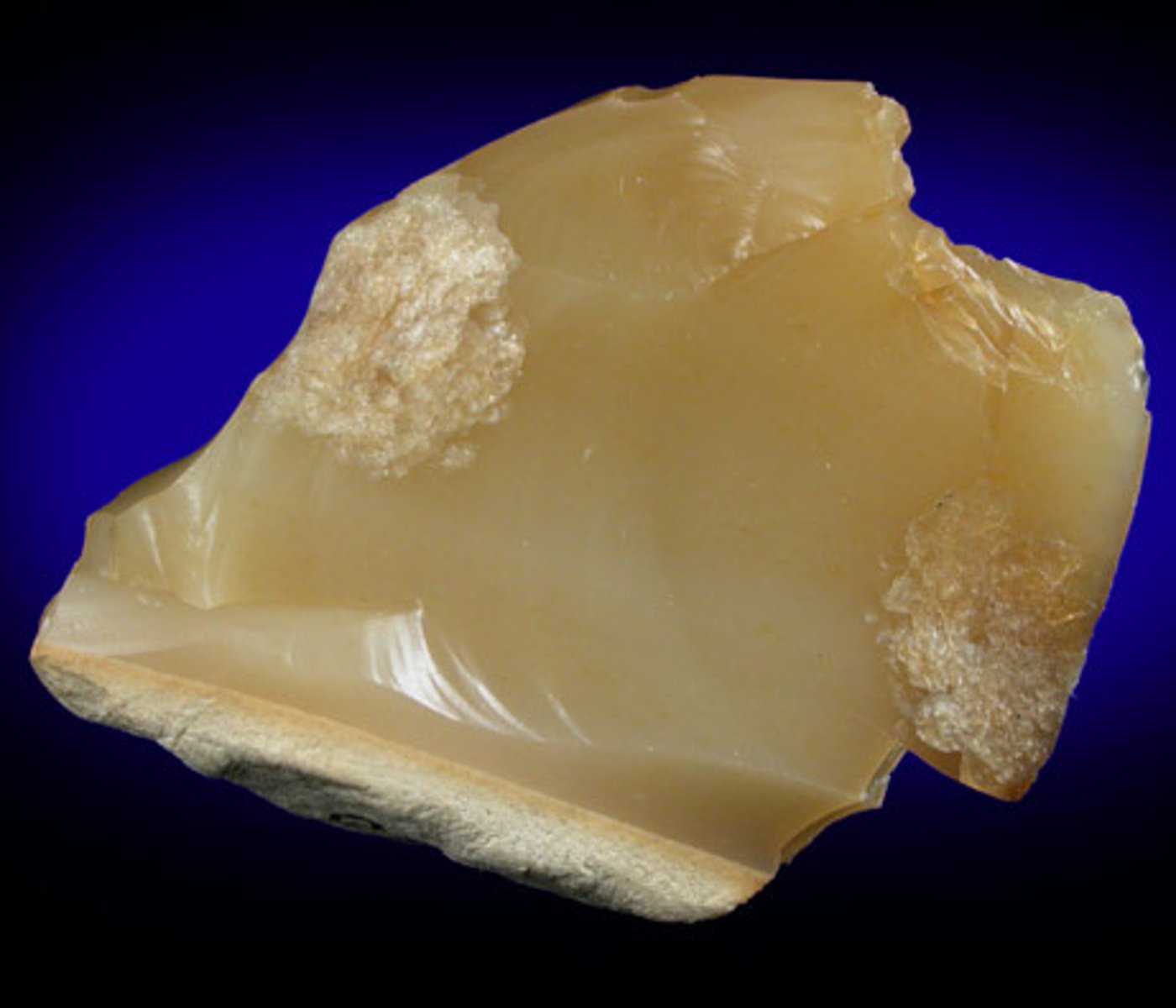
PYRITE
Pale yellow color, metallic "fool's gold."
Hardness: 6.0-6.5
Specific gravity: 5.0
Crystal Structure: Cubic, pyritohedral, or octahedral, often twinned crystals. Crystal faces often striated. Pyrite can be massive, granular, reniform, stalactitic, botryoidal, and nodular.
Streak: greenish-black Composition: FeS2
Luster: metallic, opaque
Group: Sulfides
Crystal shape: cubic
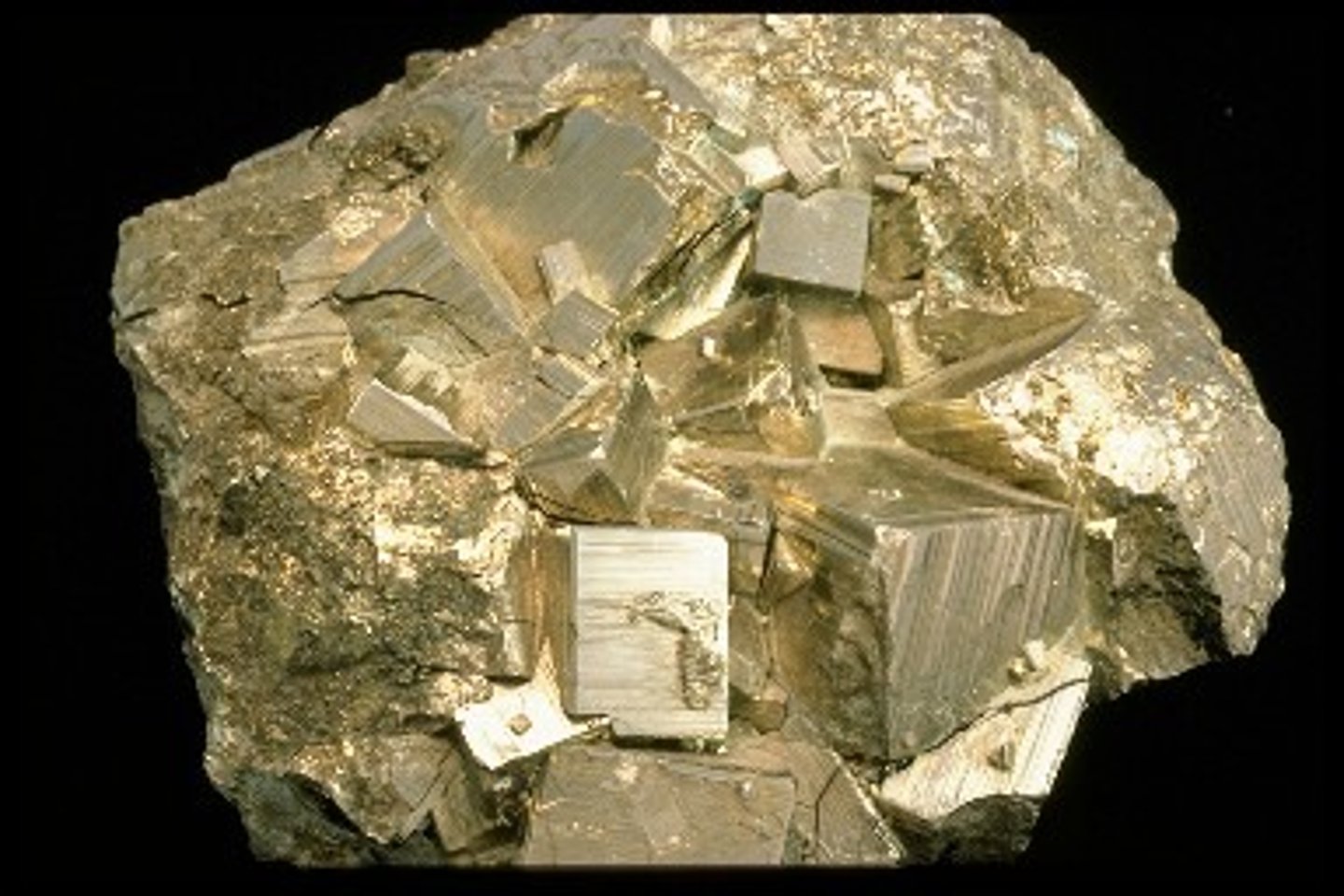
QUARTZ - agate/onyx
Agate comes in a wide variety of colors, variegated and banded. Onyx may be clear red to brownish red in layers.
Hardness: 7
Specific gravity: 2.65
Crystal habit: no crystals
Streak: white Composition: SiO2
Luster: waxy, vitreous, dull, translucent to transparent
Group: Oxides
Crystal shape:
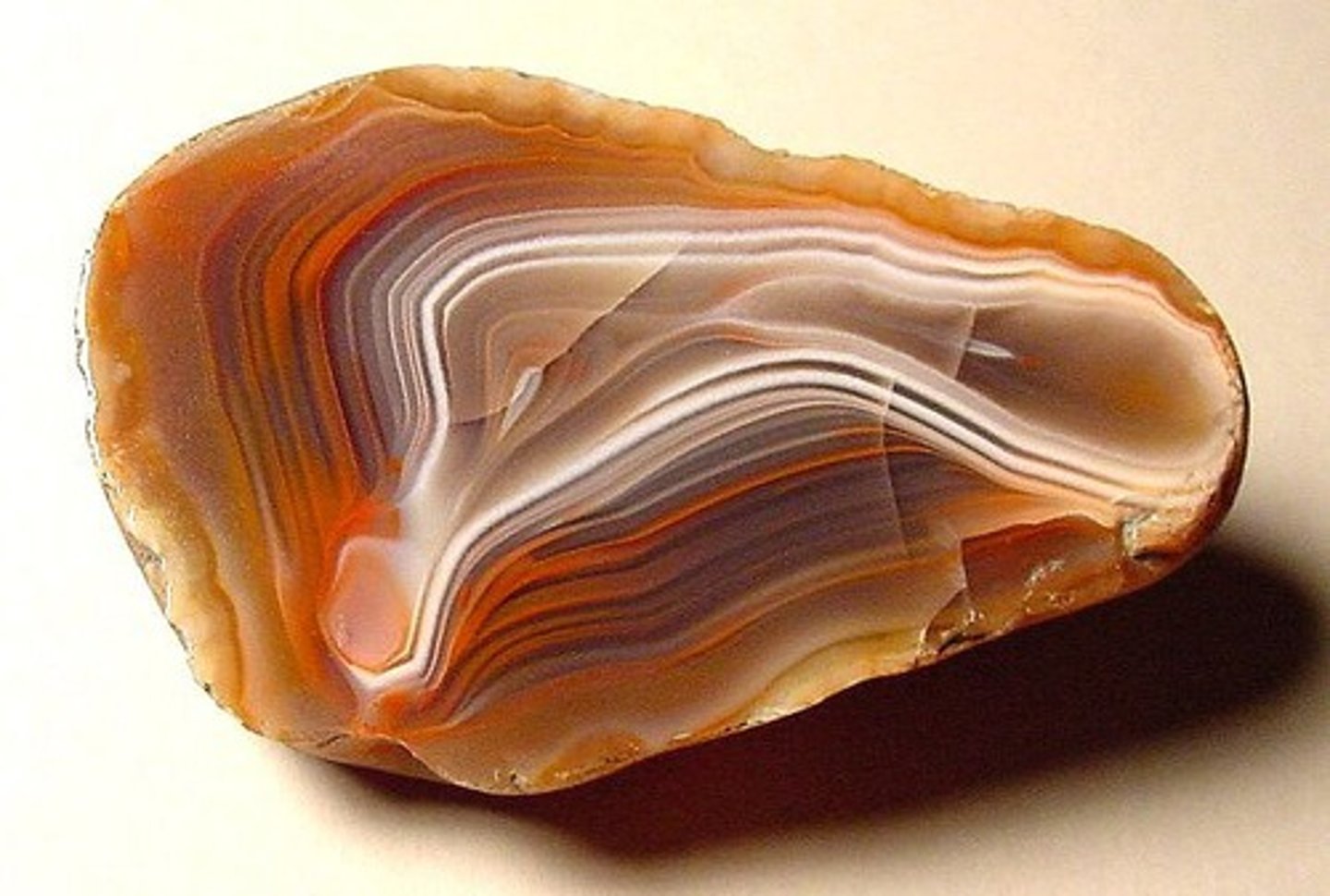
QUARTZ - amethyst
Purple. Constituent of granite, sandstone, contact metamorphic rocks like gneiss, schist, etc.
Hardness: 7
Specific gravity: 2.65
Crystal habit: Crystals are hexagonal, usu. prismatic crystals striated crosswise and ended like hexagonal pyramids.
Streak: white Composition: SiO2
Luster: vitreous, greasy, transparent to translucent
Group: Oxides
Crystal shape: trigona/hexagonal
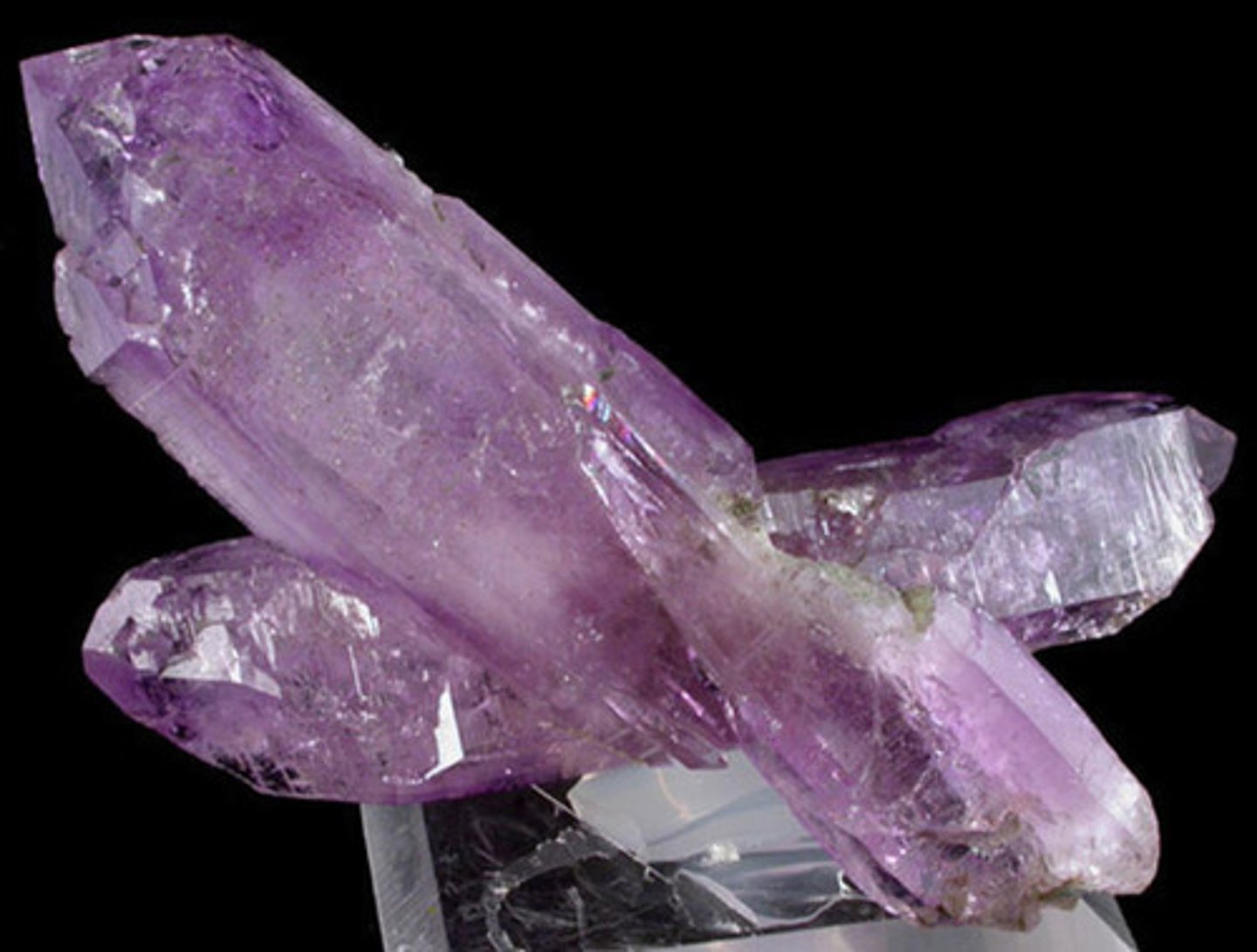
QUARTZ - chalcedony
White, gray, brown, blue, black. Microcrystalline variety of quartz.
Hardness: 7
Specific gravity: 2.65
Crystal habit: Crystals usually occur as crusts showing botryoidal and mammillary forms. Has no cleavage. Fracture is conchoidal.
Streak: white Composition: SiO2
Luster: waxy, vitreous, dull; transparent to translucent
Group: Oxides
Crystal shape:
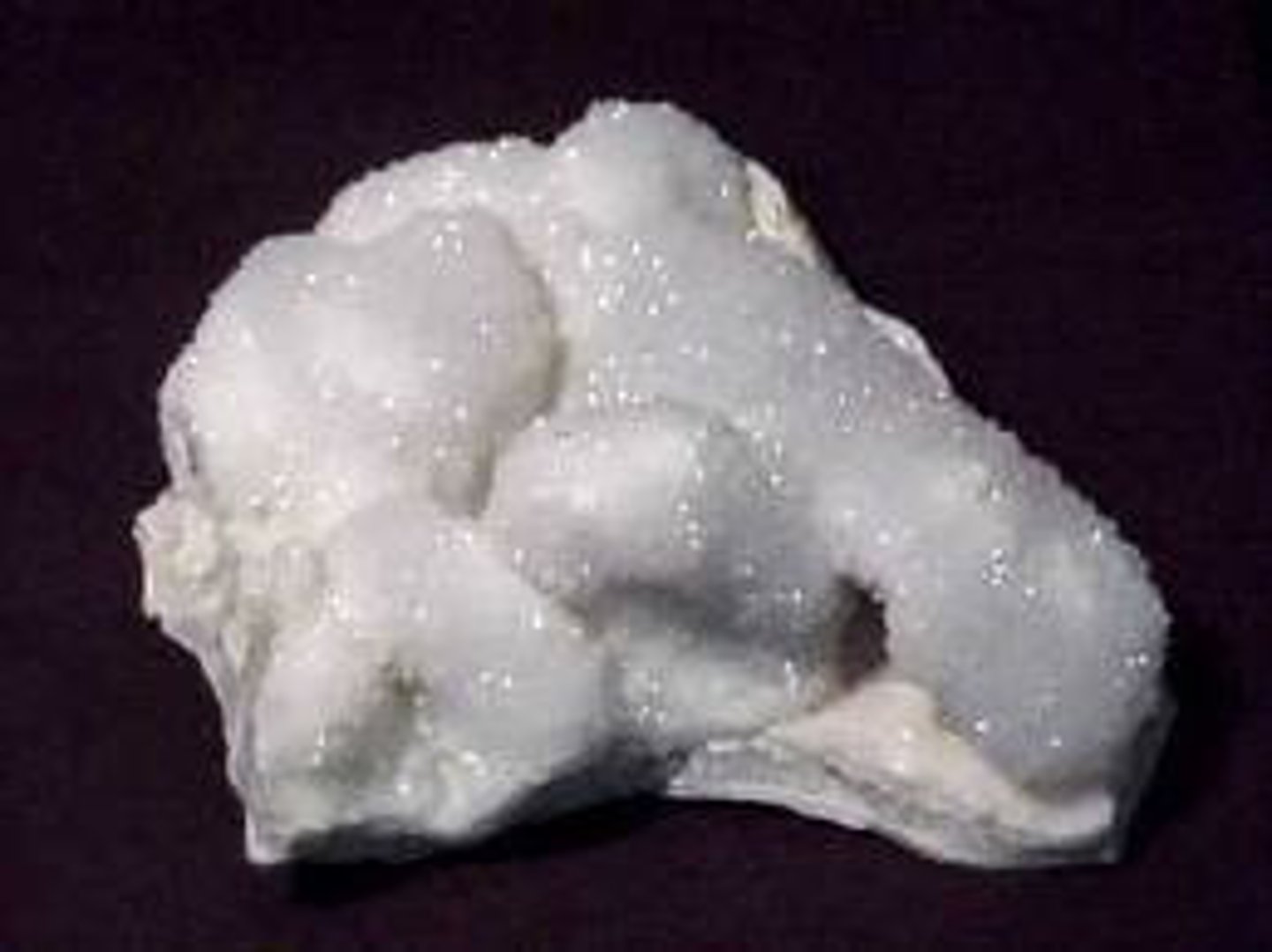
QUARTZ - citrine
Clear yellow, red-orange, orange-brown. Important rock forming mineral. Constituent of granite, sandstone, contact metamorphic rocks like gneiss, schist, etc.
Hardness: 7
Specific gravity: 2.65
Crystal habit: Crystals are hexagonal, usu. prismatic, striated crosswise and ended like hexagonal pyramids. No cleavage. Conchoidal fracture.
Streak: white Composition: SiO2
Luster: vitreous, greasy, transparent to subtranslucent
Group: Oxides
Crystal shape: trigona/hexagonal
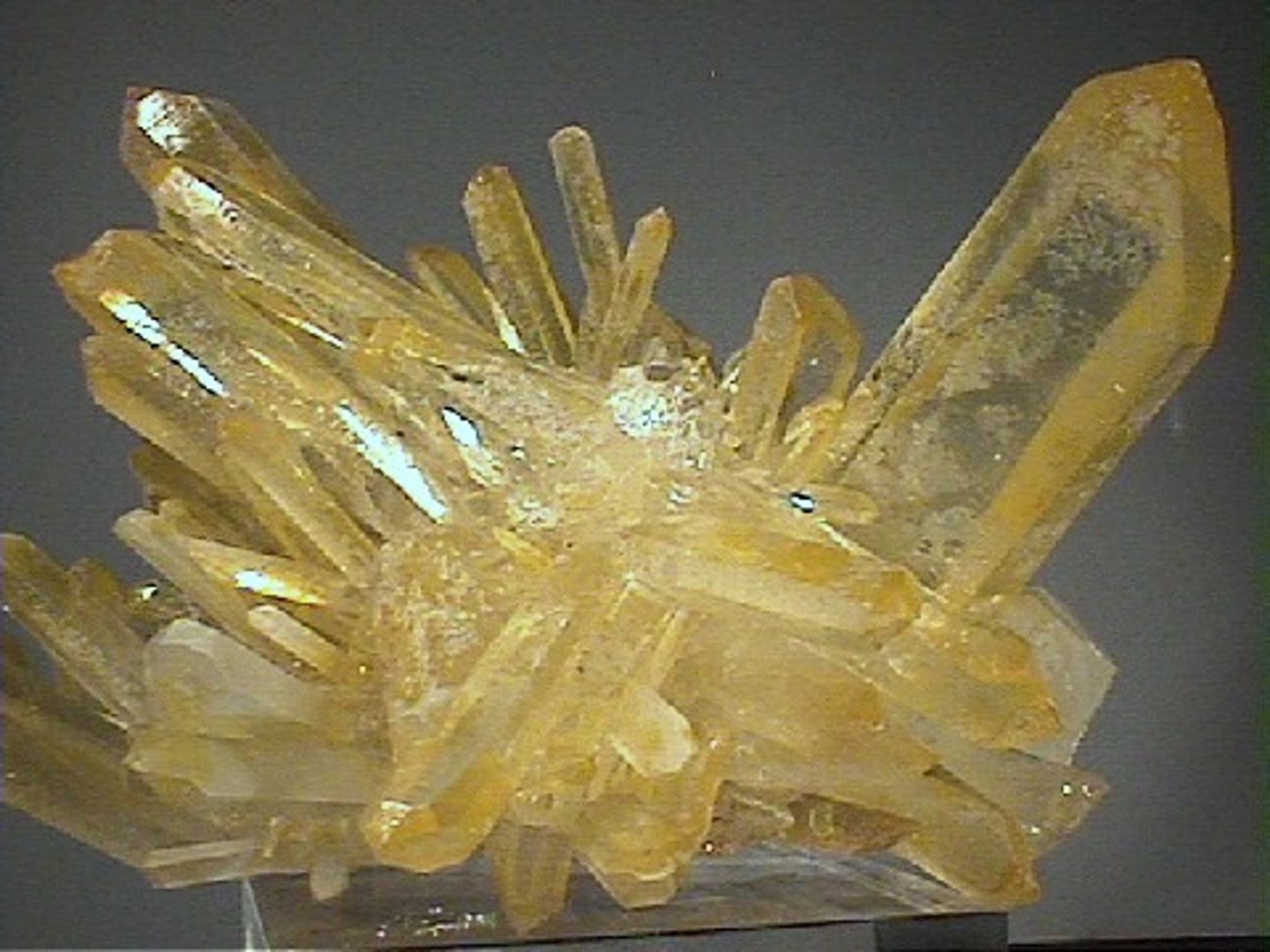
QUARTZ - crystal
Colorless. Most common type of quartz. An important rock-forming mineral, constituent of granite, sandstone, contact metamorphic rocks like gneiss, schist, etc.
Hardness: 7
Specific gravity: 2.65
Crystal habit: Crystals are hexagonal, usu. prismatic, striated crosswise and ended like hexagonal pyramids. No cleavage. Conchoidal fracture.
Streak: white Composition: SiO2
Luster: vitreous, greasy, transparent to subtranslucent
Group: Oxides
Crystal shape: trigonal/hexagonal
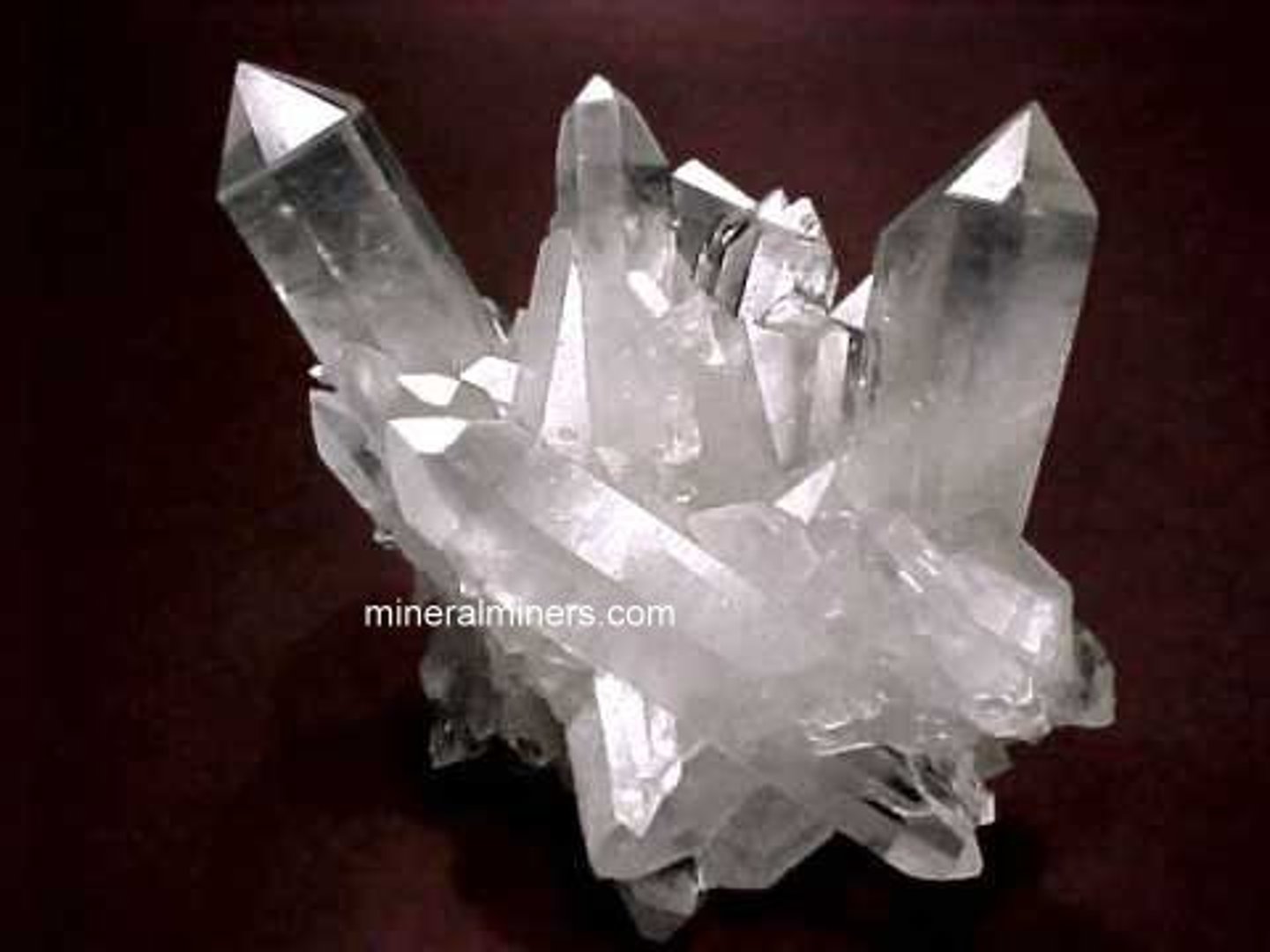
QUARTZ - jasper
Variegated and mottled red, yellow, brown.
Hardness: 7
Specific gravity: 2.65
Crystal habit: Crystals usually occur as crusts showing botryoidal and mammillary forms. Has no cleavage. Fracture is conchoidal.
Streak: white Composition: SiO2
Luster: waxy, vitreous, dull; transparent to translucent
Group: Oxides
Crystal shape:
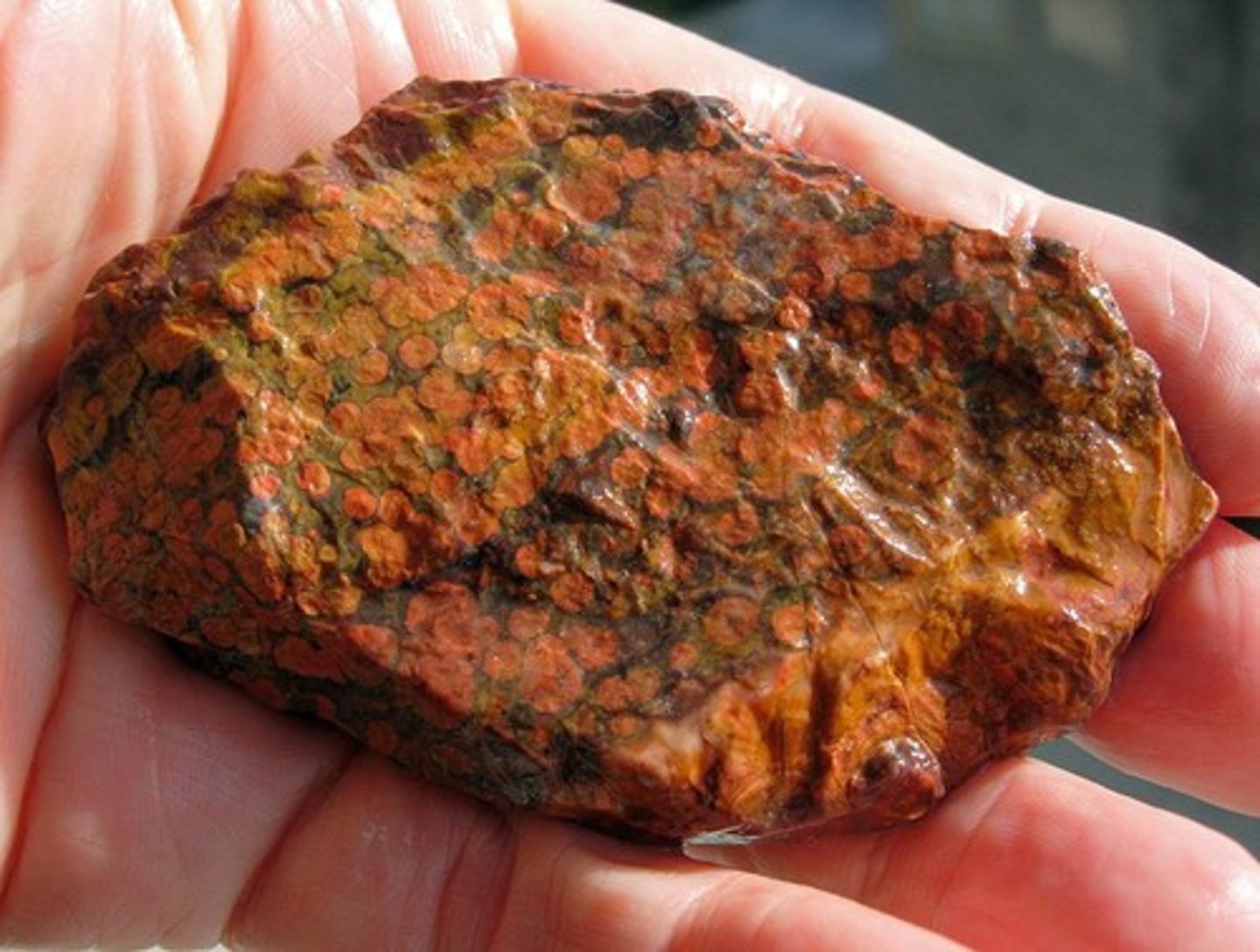
QUARTZ - milky
White color. An important rock-forming mineral, constituent of granite, sandstone, contact metamorphic rocks like gneiss, schist, etc.
Hardness: 7
Specific gravity: 2.65
Crystal habit: Crystals are hexagonal, usu. prismatic, striated crosswise and ended like hexagonal pyramids. No cleavage. Conchoidal fracture.
Streak: white Composition: SiO2
Luster: vitreous, greasy; transparent to subtranslucent
Group: Oxides
Crystal shape: trigonal/hexagonal
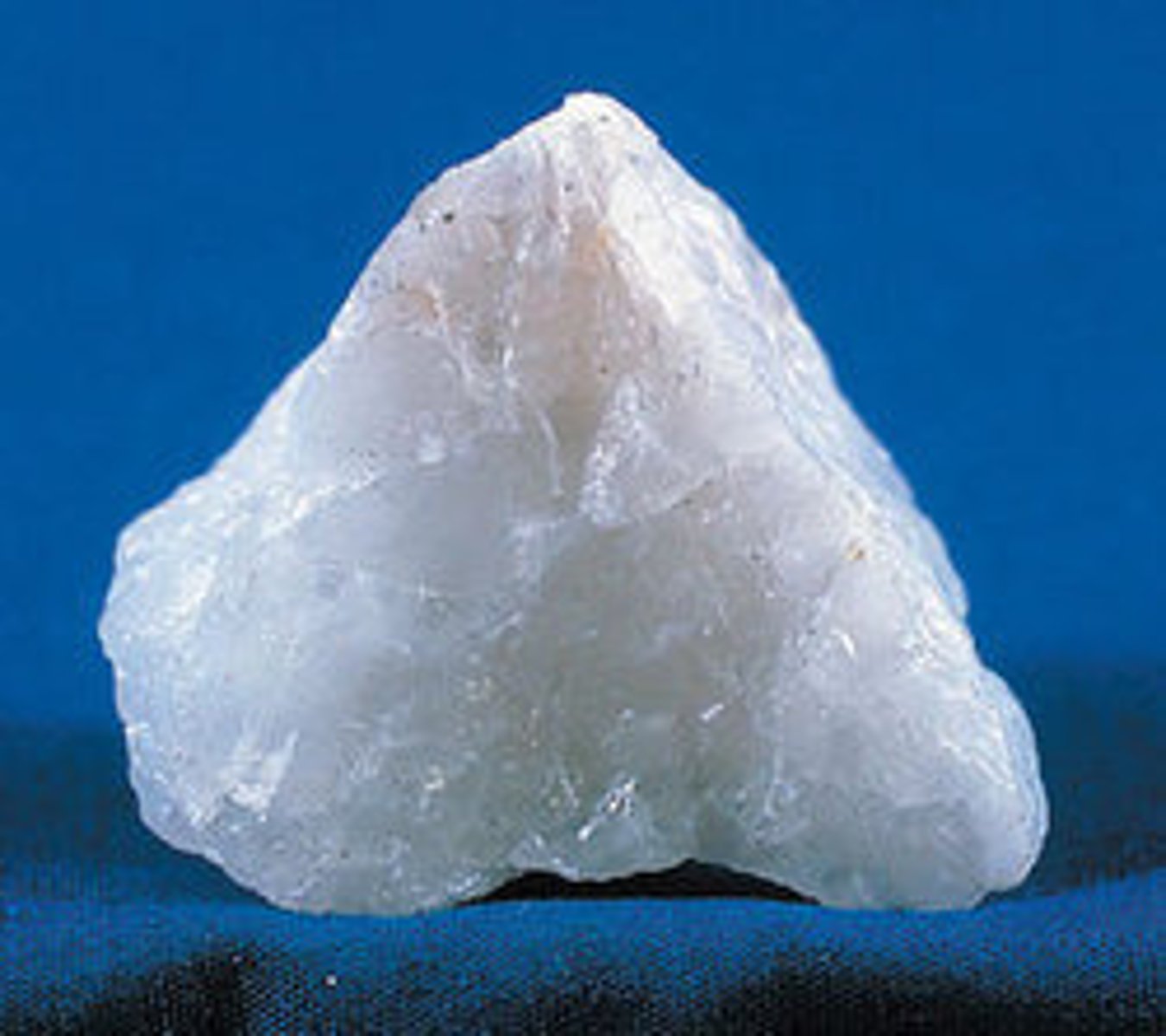
QUARTZ - rose
Pink, rose-red. An important rock-forming mineral, constituent of granite, sandstone, contact metamorphic rocks like gneiss, schist, etc.
Hardness: 7
Specific gravity: 2.65
Crystal habit: Crystals are hexagonal, usu. prismatic, striated crosswise and ended like hexagonal pyramids. No cleavage. Conchoidal fracture.
Streak: white Composition: SiO2
Luster: vitreous, greasy; transparent to subtranslucent
Group: Oxides
Crystal shape: trigonal/hexagonal
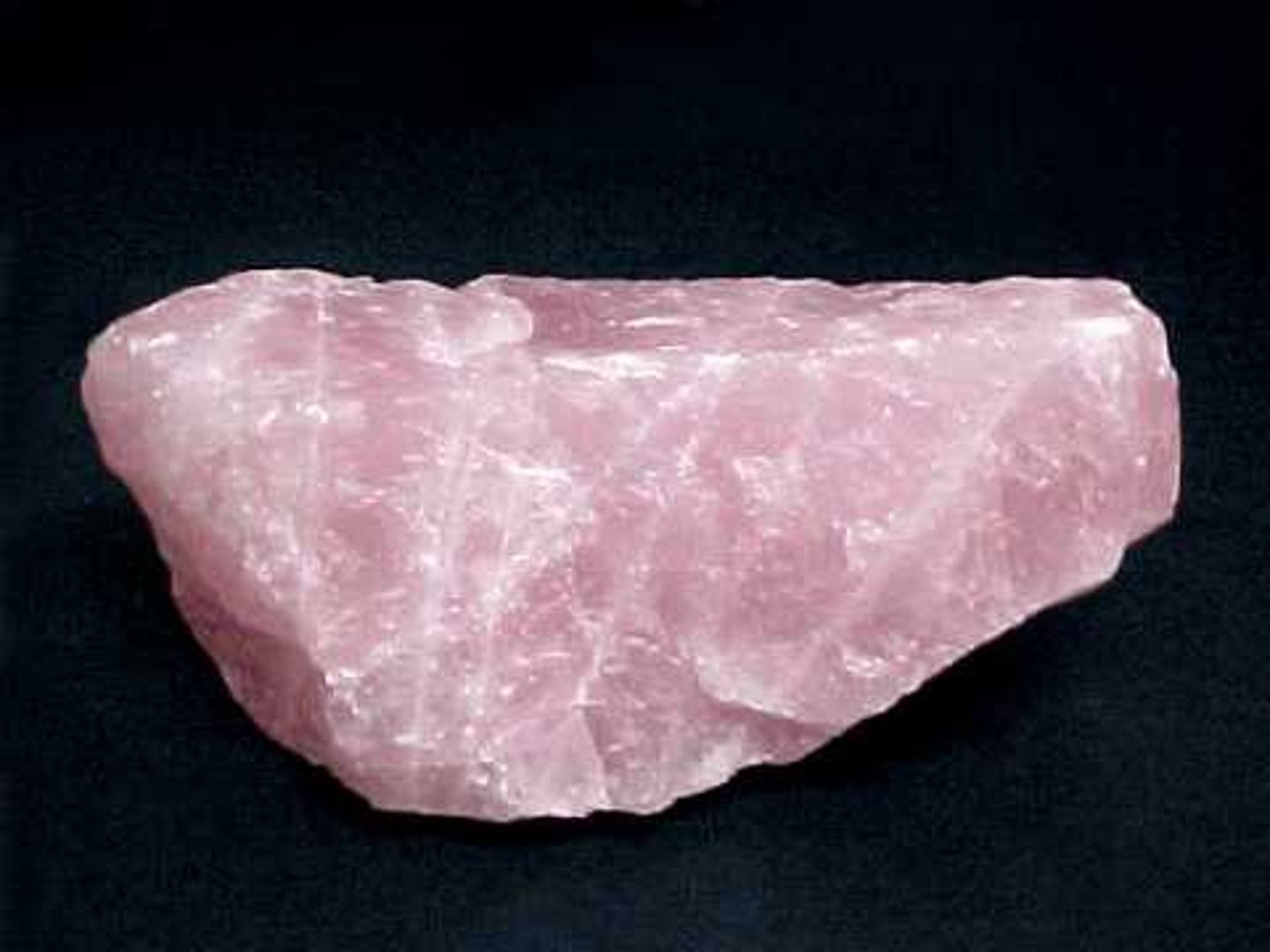
RHODONITE
Pink to rose-red or brownish red.
Hardness: 5.5-6.5
Specific gravity: 3.57-3.76
Crystal habit: tabular crystals, often with rounded edges; also in massive, compact, and granular habits.
Streak: white
Composition: (Mn+2,Fe+2,Mg,Ca)SiO3
Luster: vitreous on crystal faces, pearly on cleavage faces, transparent to translucent
Group: Silicates
Crystal shape: triclinic
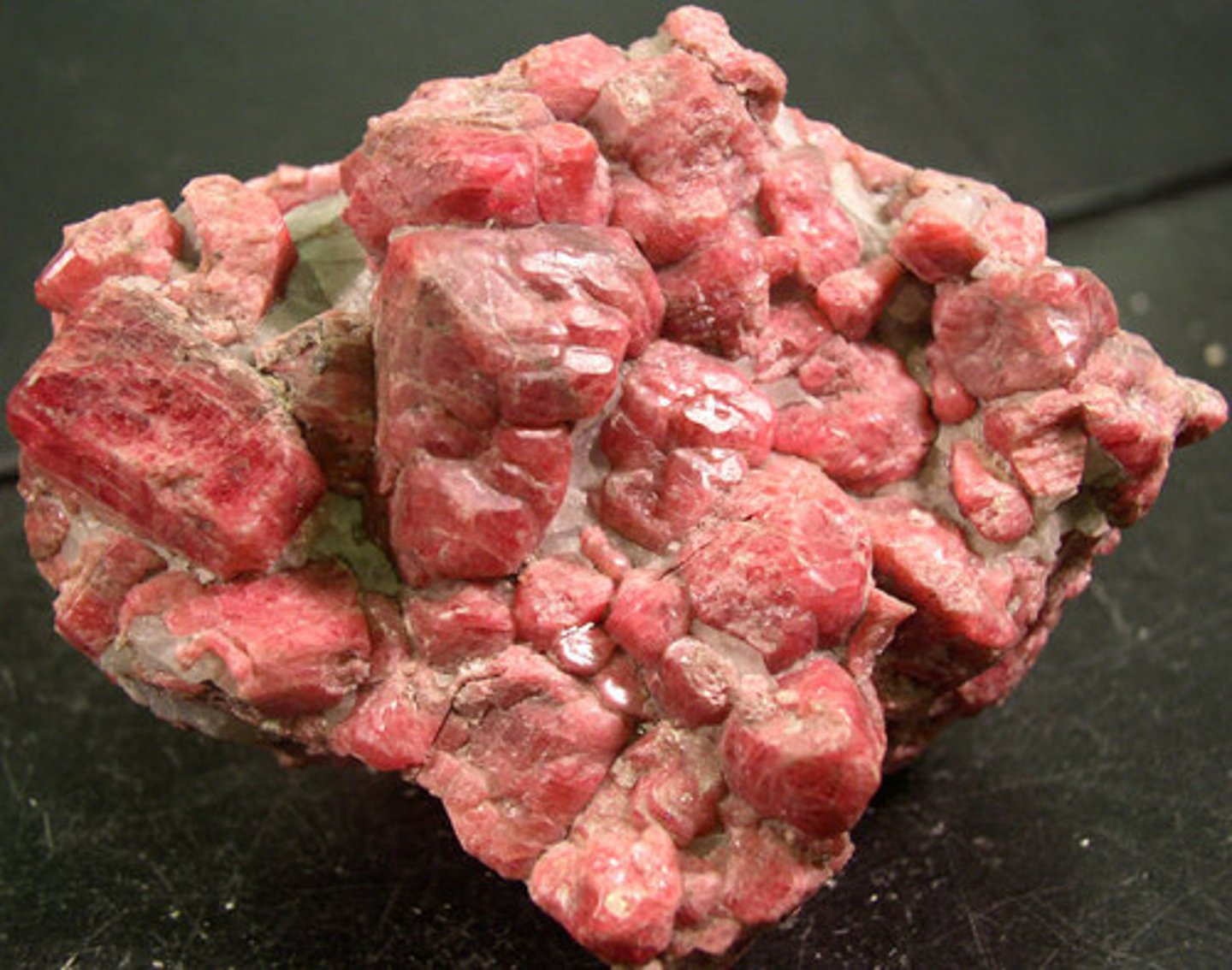
SILVER
Silver-white in color, tarnishes on exposure to atmosphere.
Hardness: 2.5-3
Specific gravity: 10.5
Crystal habit: Crystals rare, form as cubes and octahedral, sometimes in parallel bands. Usual habits are wires, scales, dendrites, and massive.
Streak: silvery white Composition: Ag
Luster: metallic, opaque
Group: native elements
Crystal shape: cubic
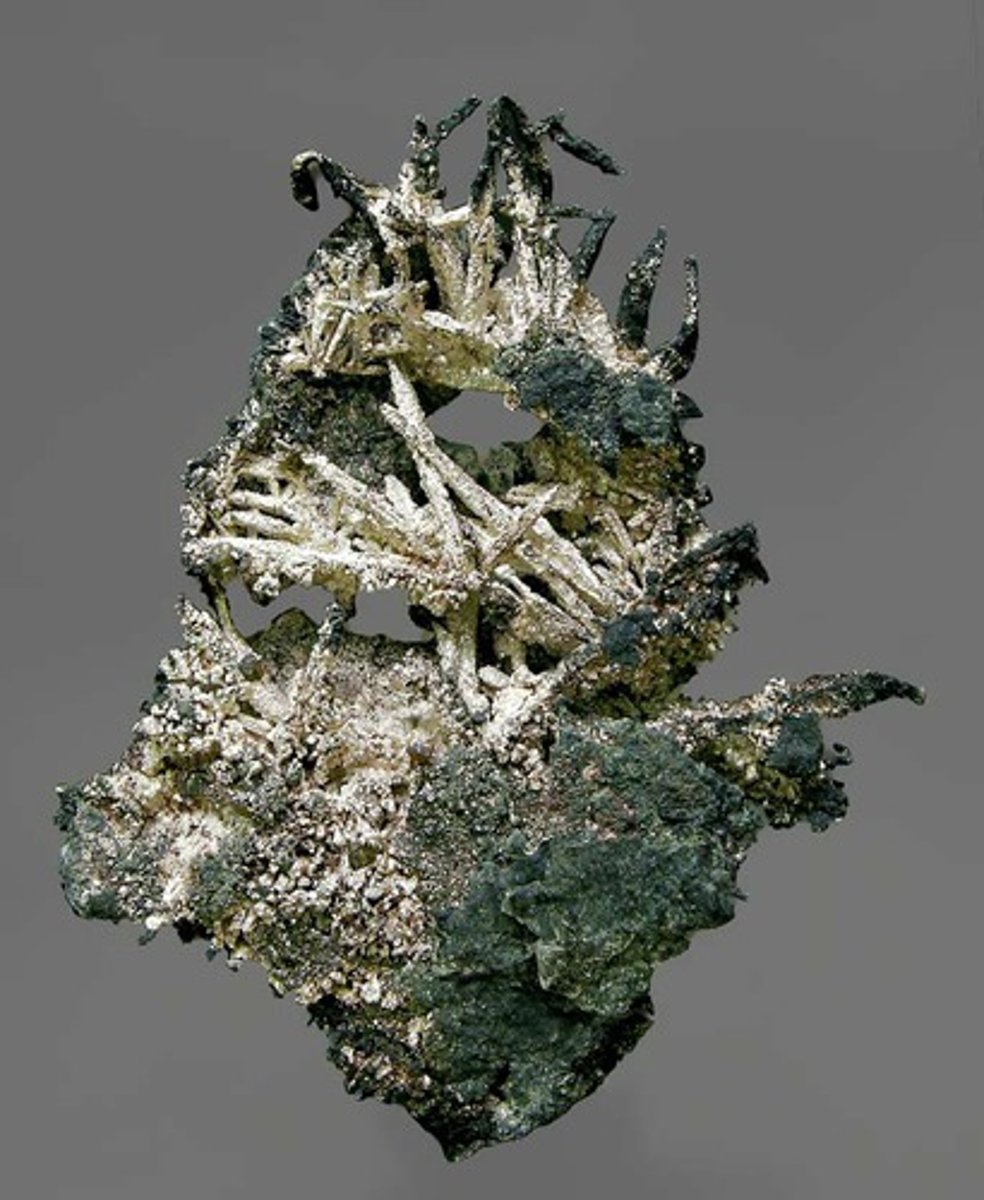
SODALITE
Light to dark blue, white, colorless, yellowish, greenish, or reddish. Forms in certain igneous rocks.
Hardness: 5.5-6
Specific gravity: 2.14-2.40
Crystal habit: Dodecahedral crystals, commonly twinned. Habits are also massive and granular with concentric internal structure.
Streak: colorless
Composition: Na8Al6Si6O24Cl2
Luster: vitreous to greasy, transparent to translucent
Group: Silicates
Crystal shape: cubic
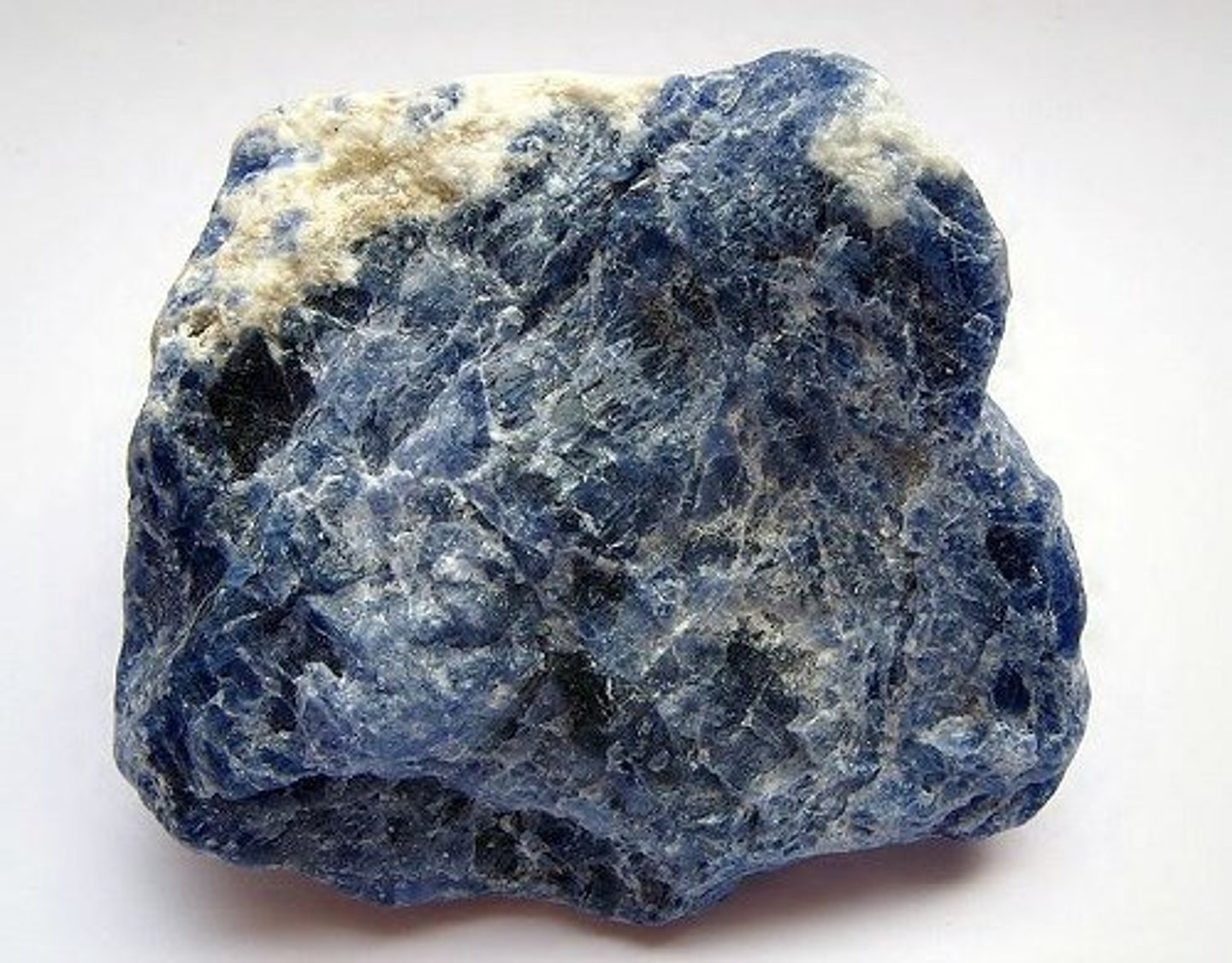
SPHALERITE
Black, brown, yellow, red, green, gray, white, colorless.
Hardness: 3.5-4
Specific gravity: 3.9-4.1
Crystal habit: tetrahedral and dodecahedral crystals, often with curved faces. Other habits include massive, granular, concretionary, and botryoidal.
Streak: pale brown to colorless Composition: ZnS
Luster: resinous to adamantine, translucent to transparent
Group: Sulfides
Crystal shape: cubic
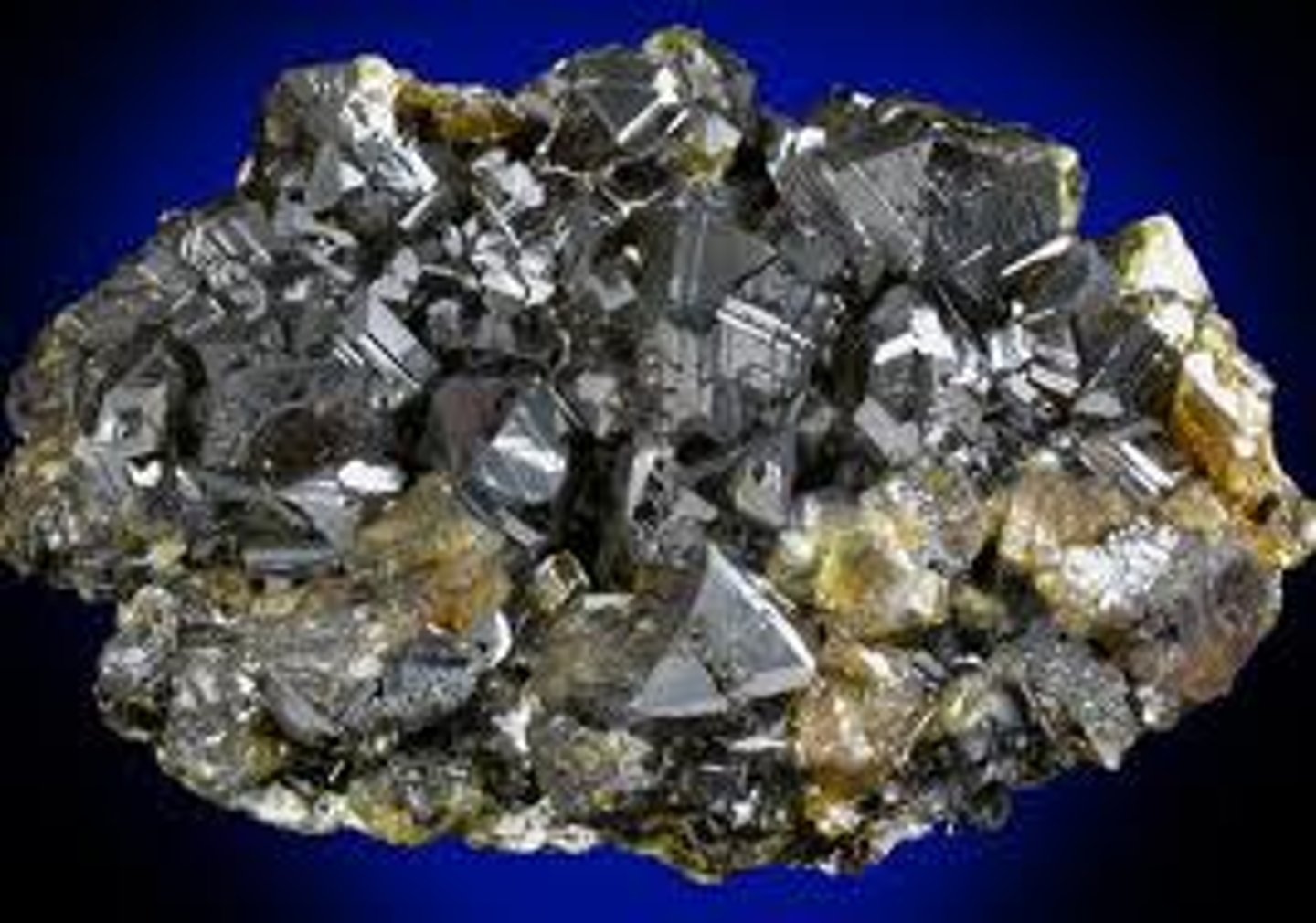
STAUROLITE
Dark brown, reddish brown, yellowish brown, brownish black. Forms deep in the earth in regionally metamorphosed rocks in extreme temp. and pressure, such as gneisses and mica schists. Associated with metamorphic minerals kyanite, muscovite, garnet, quartz.
Hardness: 7.0-7.5
Specific gravity: 3.65-3.83
Crystal habit: Short, prismatic crystals, often cruciform twins
Streak: colorless to grayish
Composition: (Fe+2,Mg,Zn)2Al9(Si,Al)4O22(OH)2
Luster: vitreous to resinous, translucent to nearly opaque
Group: Silicates
Crystal shape: monclinic
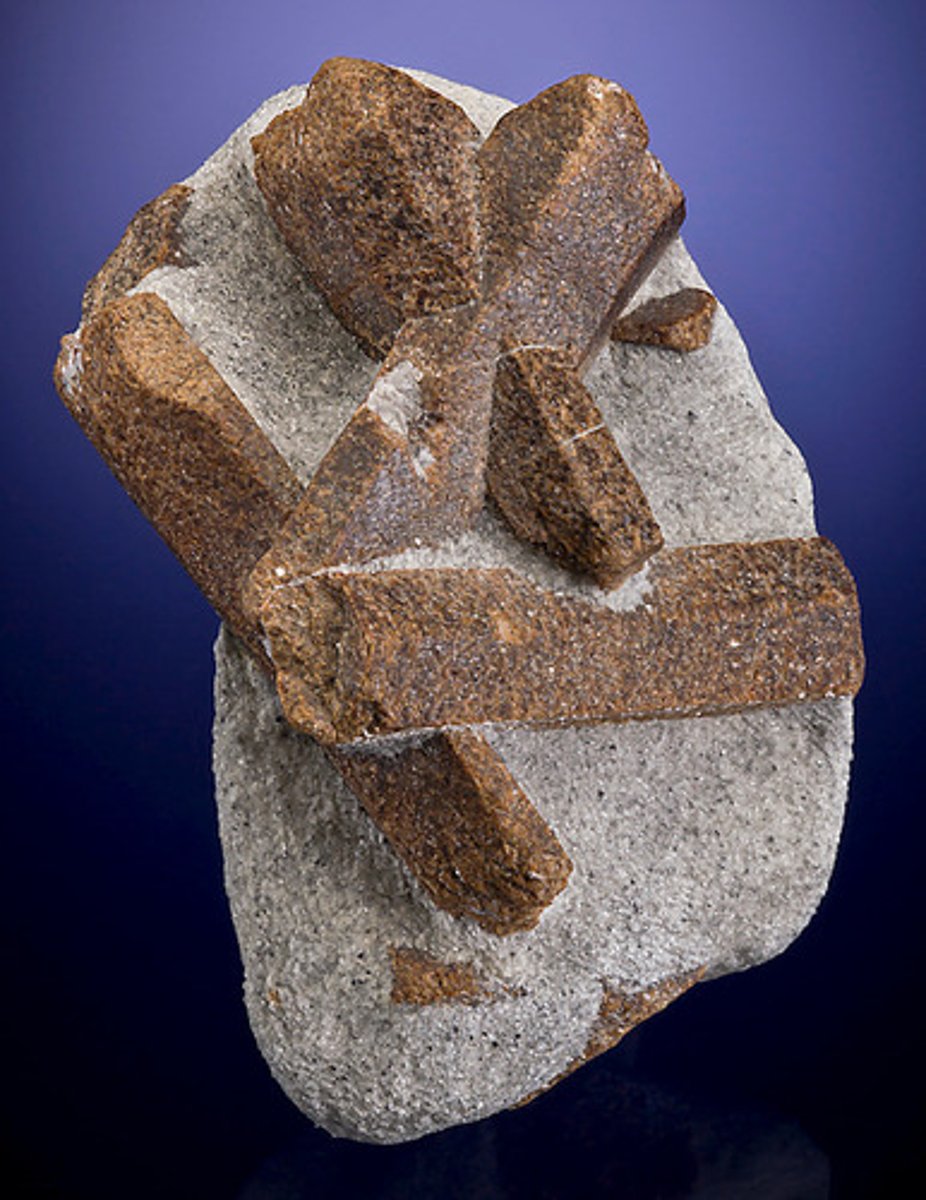
SULFUR
Bright lemon-yellow to yellowish brown, and it gives off a sulfurous odor when rubbed. Forms around volcanic craters and hot springs.
Hardness: 1.5-2.5
Specific gravity: 2.0-2.1
Crystal habit: Tabular and bipyramidal crystal forms. Also occurs in massive, encrusting, powdery, and stalactitic habits.
Streak: white Composition: S
Luster: resinous to greasy, transparent to translucent
Group: native elements
Crystal shape: orthorhombic
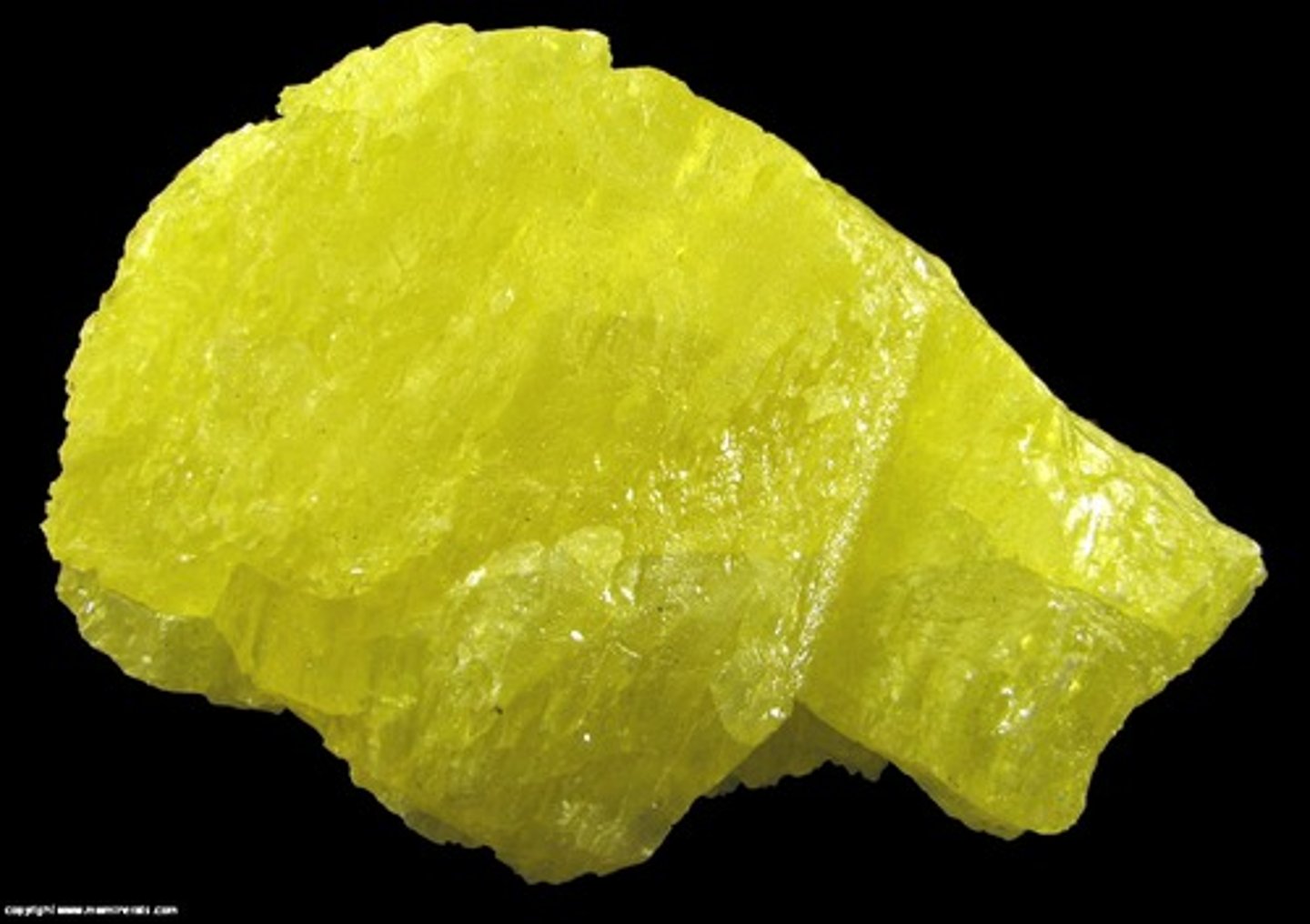
TALC
Pale to dark green, gray, brownish, or white. Forms by the alteration of ultrabasic igneous rocks and dolomites.
Hardness: 1.0
Specific gravity: 2.58-2.83
Crystal habit: Tabular crystals. Can also occur in massive, compact, foliated, and fibrous habits.
Streak: white Composition: Mg3Si4O10(OH)2
Luster: pearly to dull or greasy, translucent
Group: Silicates
Crystal shape: monoclinic
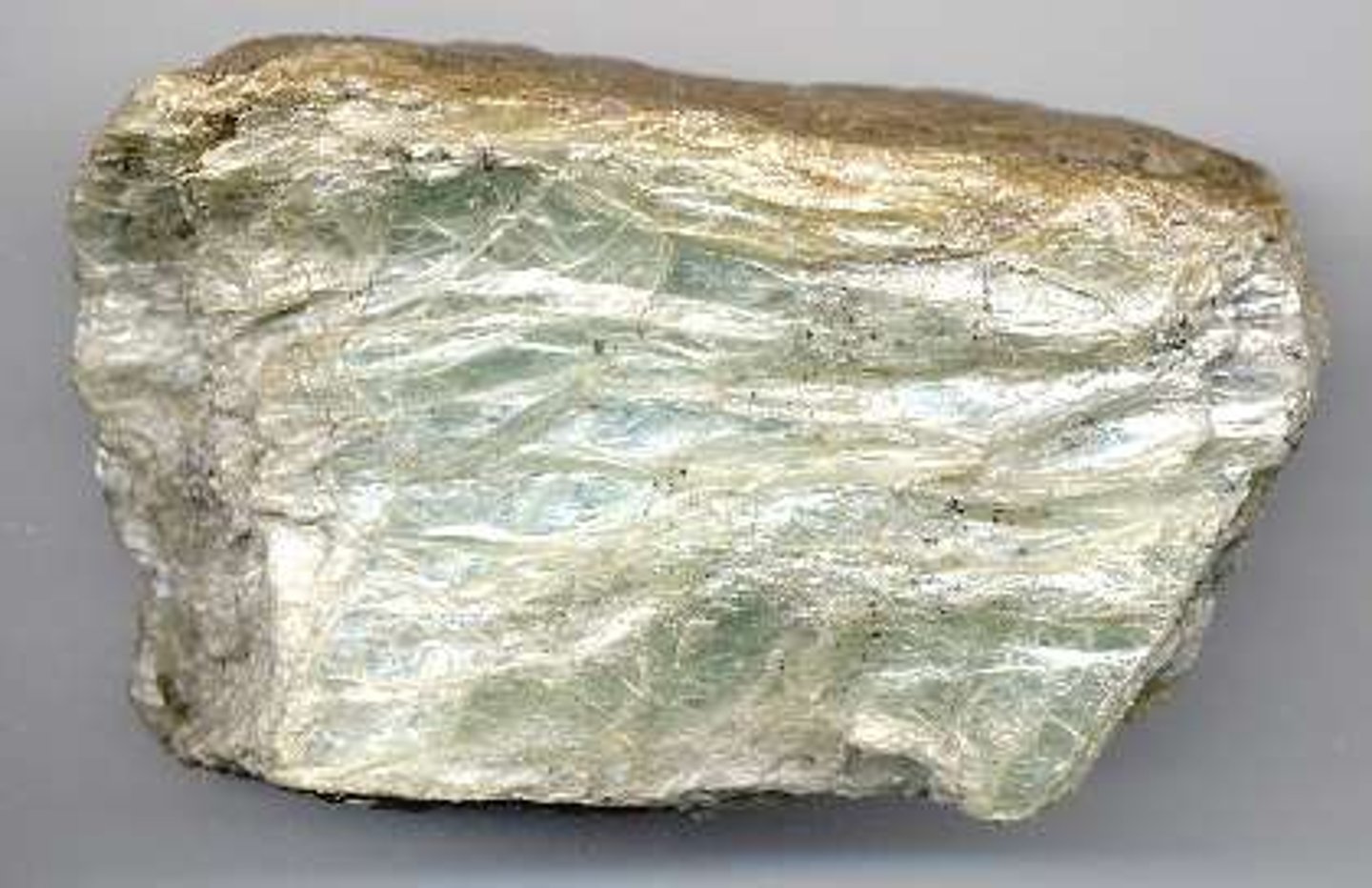
TOPAZ
White, colorless, gray, yellow, orange, brown, bluish, greenish, purple, pink. Forms most commonly in pegmatites, can also form in veins and cavities in granitic rocks; occurs with a variety of minerals, including quartz.
Hardness: 8
Specific gravity: 3.49-3.57
Crystal habit: Well formed prismatic crystals that can be of great size (>220 lbs); may also form in massive, granular and columnar habits.
Streak: colorless Composition: Al2SiO4(F,OH)2
Luster: vitreous, transparent to translucent
Group: Silicates
Crystal shape: orthorhombic
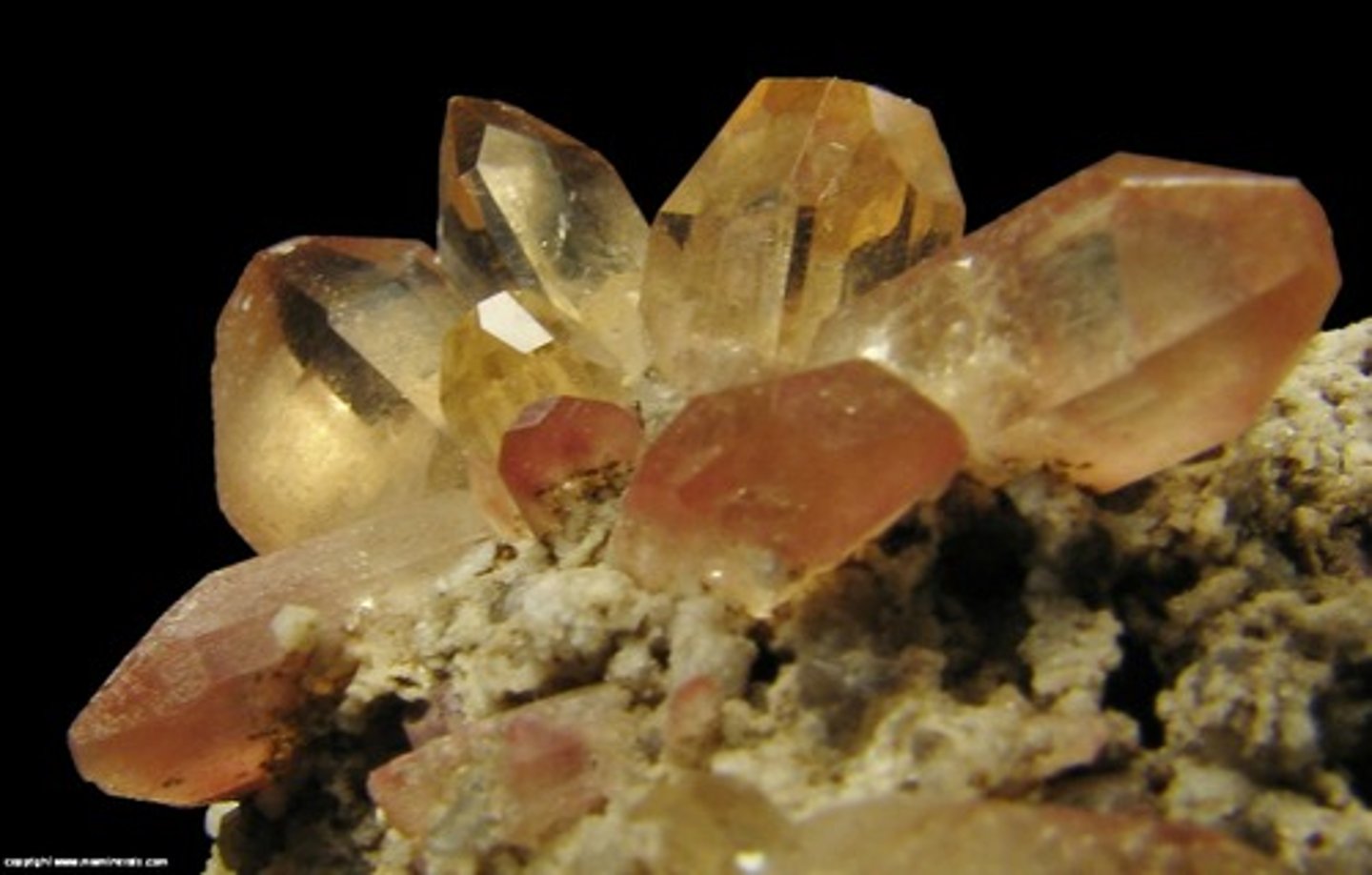
TOURMALINE GROUP
Pink, green, black, brown, multi-hued (pink on one end and green on the other or black, brown, yellowy green together). Forms in granites and pegmatites and in some metamorphic rocks. May be found with many mineral including beryl, zircon, quartz, feldspar.
Hardness: 7.0-7.5
Specific gravity: 3.0-3.2
Crystal habit: Prismatic crystals, often vertically striated; may also be in massive and compact habits.
Streak: colorless
Composition Na(Mg,Fe,Li,Mn,Al)3Al6(BO3)3Si6O18(OH,F)4
Luster: vitreous, transparent to opaque
Group: Silicates
Crystal shape: trigonal/hexagonal
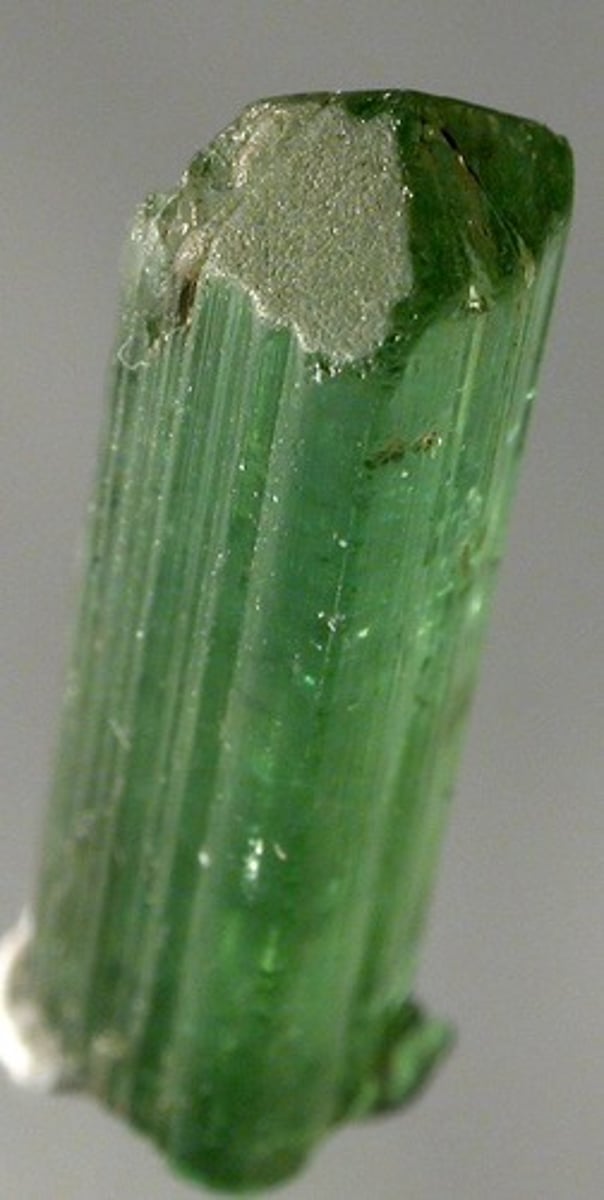
TREMOLITE
Colorless, white, gray, green, pink, brown. Forms in contact metamorphosed dolomites and in serpentinites.
Hardness: 5-6
Specific gravity: 2.9-3.2
Crystal habit: Long, bladed crystals, often twinned; also forms as columnar, fibrous, or plumose aggregates, often radiating, and in massive or granular habits.
Streak: white Composition: Ca2(Mg,Fe+2)5Si8O22(OH)2
Luster: vitreous, transparent to translucent
Group: Silicates
Crystal shape: monoclinic
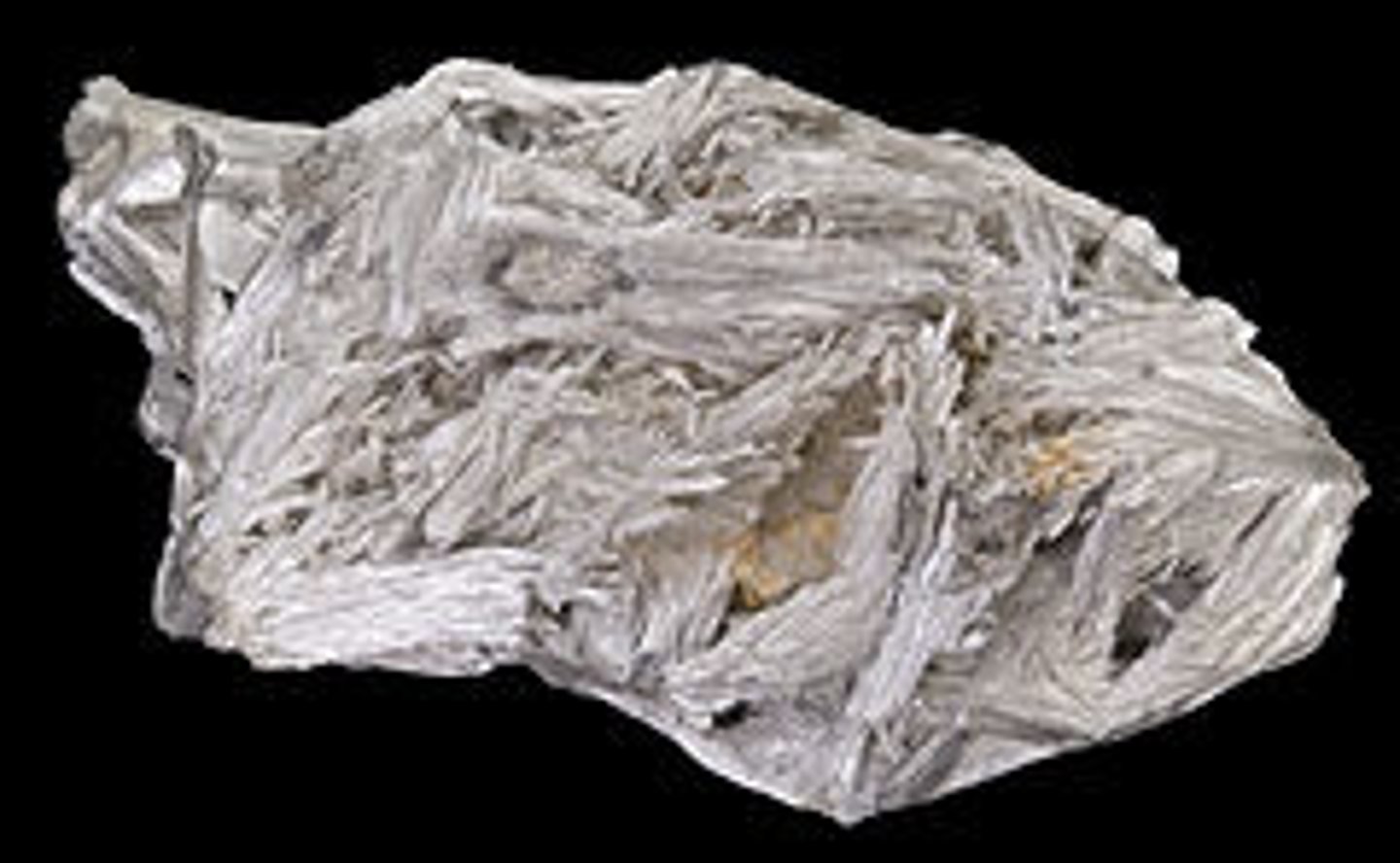
ULEXITE
White or colorless and looks like a densely-packed bundle of threads. Forms in evaporate basins.
Hardness: 2.5
Specific gravity: 1.96
Crystal habit: Crystals are acicular, often in rounded aggregates. The habit may also be fibrous or in tufted masses.
Streak: white Composition: NaCaB5O6(OH)6.5H2O
Luster: vitreous or silky, transparent to translucent
Group: Borates
Crystal shape: triclinic
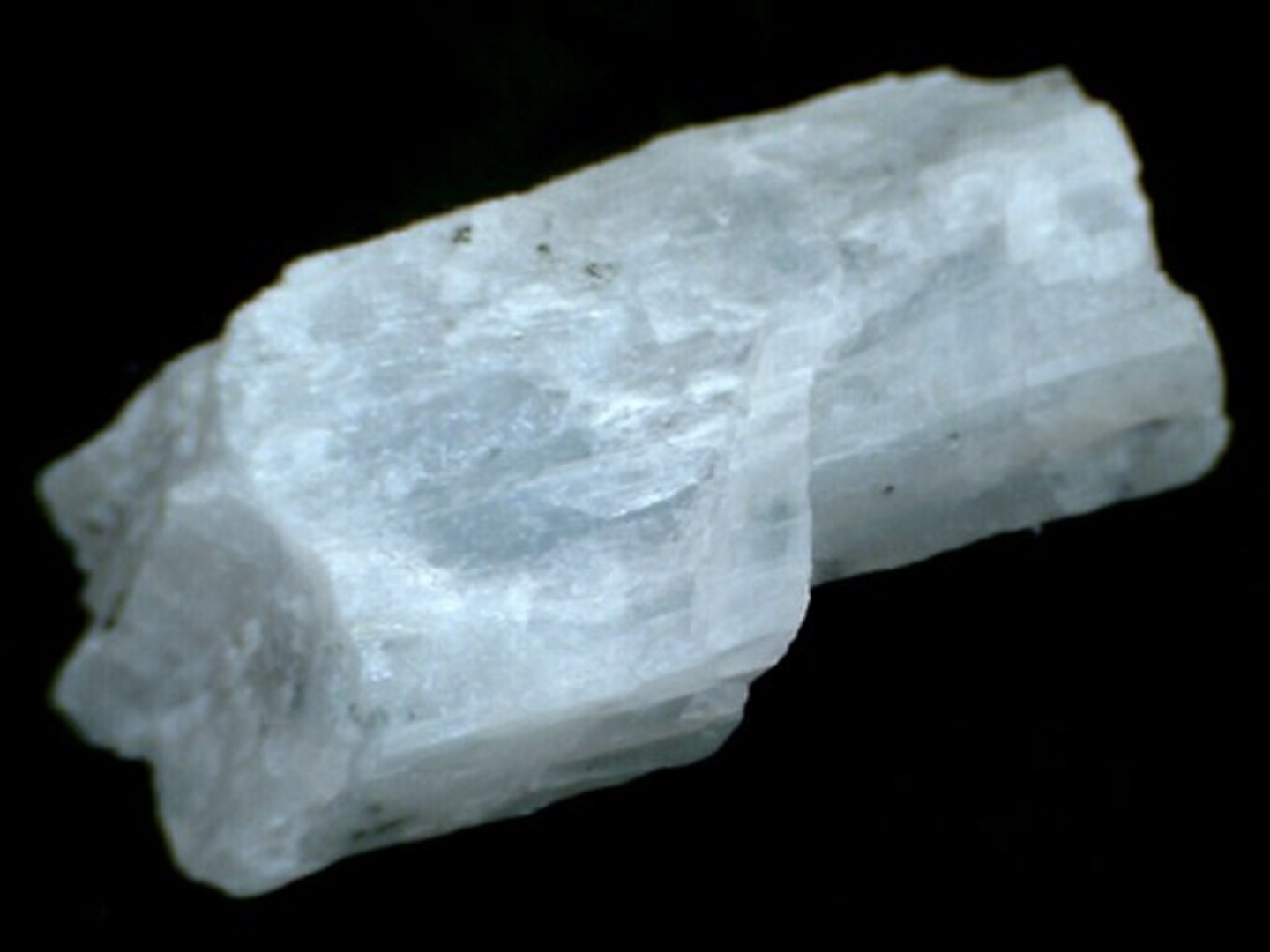
GNEISS
Metamorphic rock of discontinuous banding. Light colors consist of feldspar and quartz (white, gray, tan, pink). Dark color banding layers commonly consist of muscovite, biotite, and hornblende (black, dk gray, dk green, dk brown). Light layers have medium to coarse-grained, granular texture. Darker layer has foliated texture. Formed by regional metamorphism, in which sedimentary or igneous rock is deeply buried and subjected to high temp and pressure.
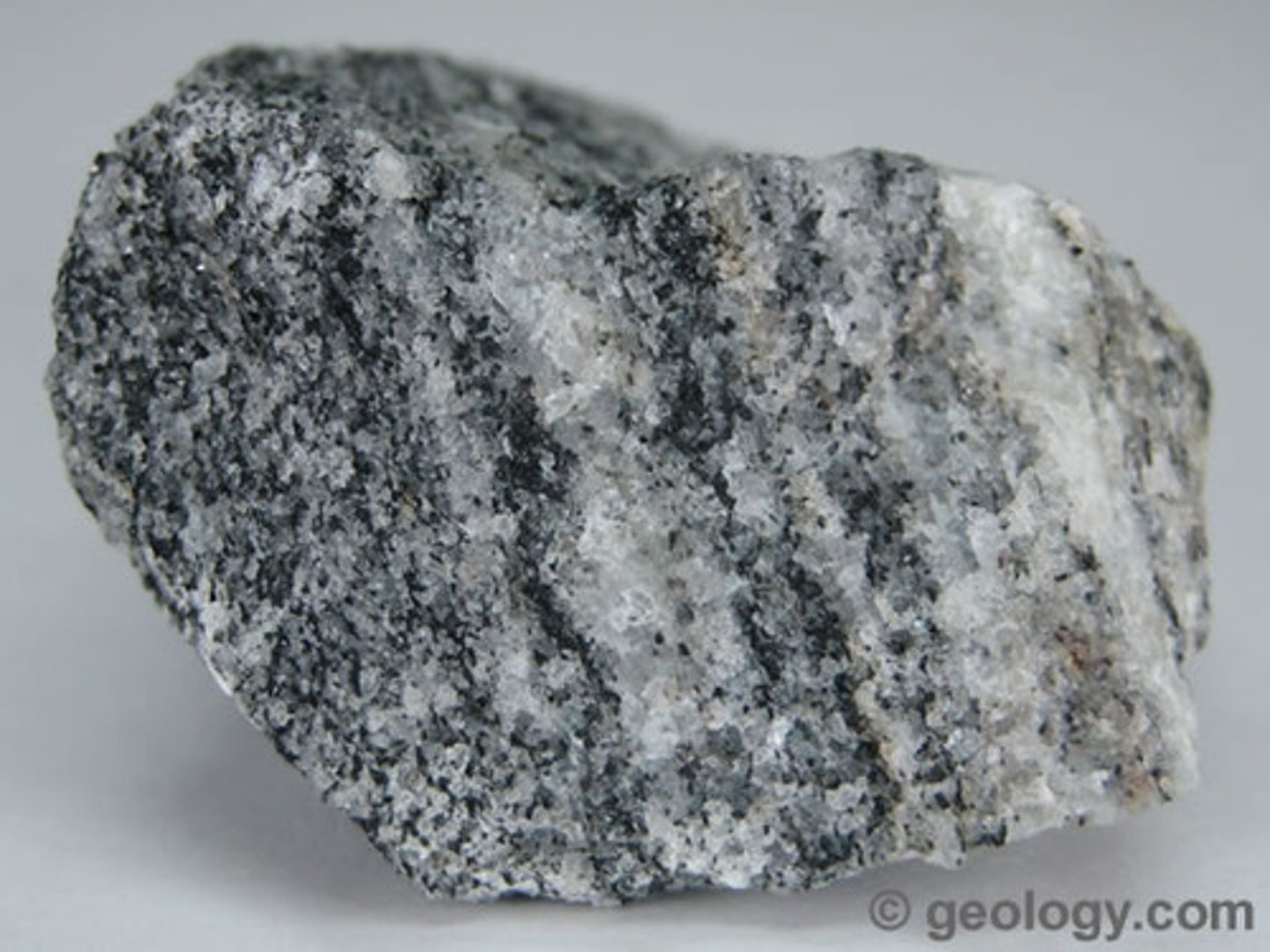
MARBLE
Metamorphic rock formed originally from limestone or dolomite, with traces of other minerals. Comes in many colors. Many have irregular lines in them. Many are fine-grained; may also be med- to coarse-grained.
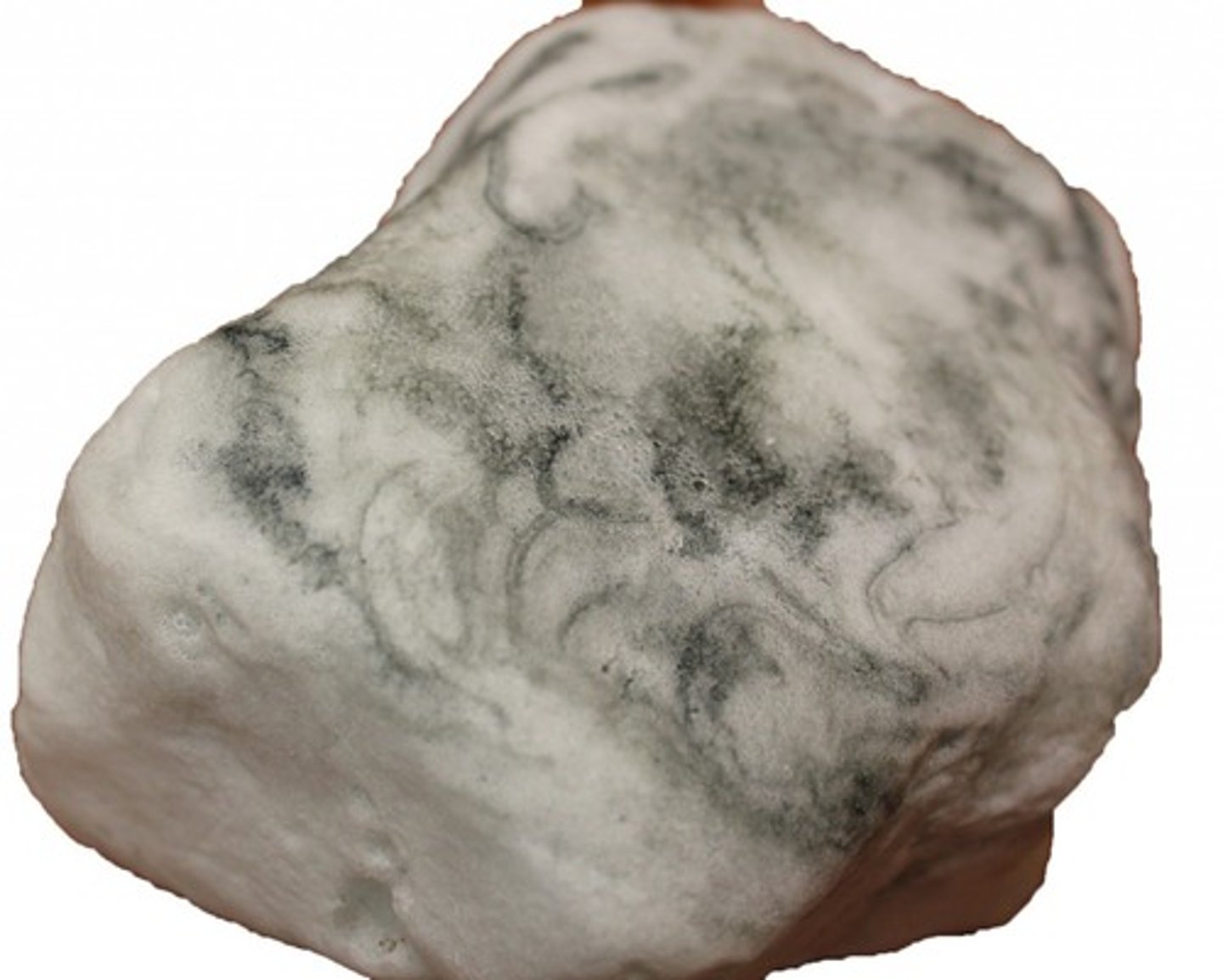
PHYLLITE
Metamorphic rock somewhat comparable with slates. Gray or green color with a sheen; fine to medium-grained. Quartz, feldspars, mica and chlorite are present. Often shows small-scale folding.
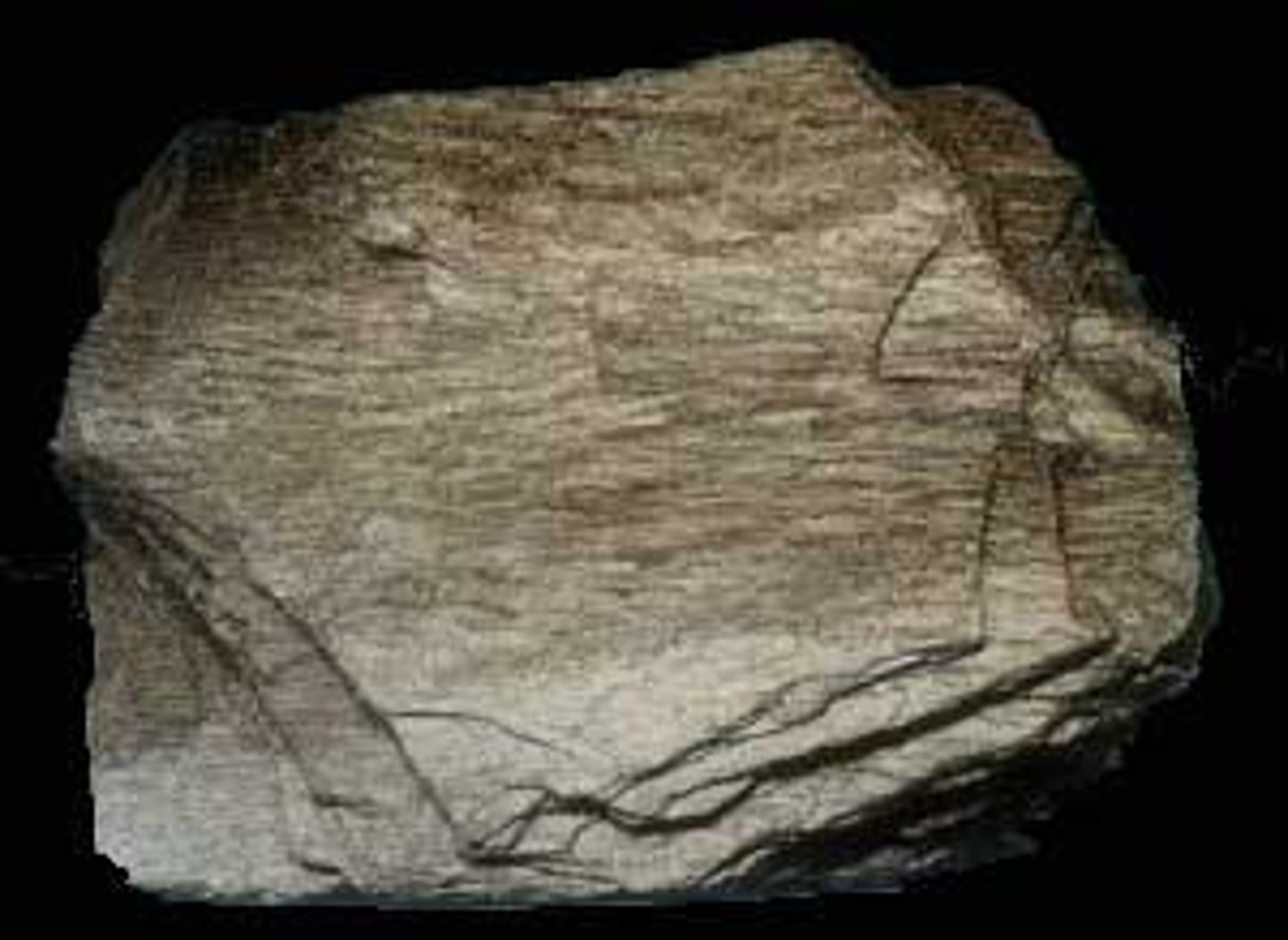
QUARTZITE
Metamorphic rock of various colors with quartz as the dominant mineral. It is grainy without much luster.
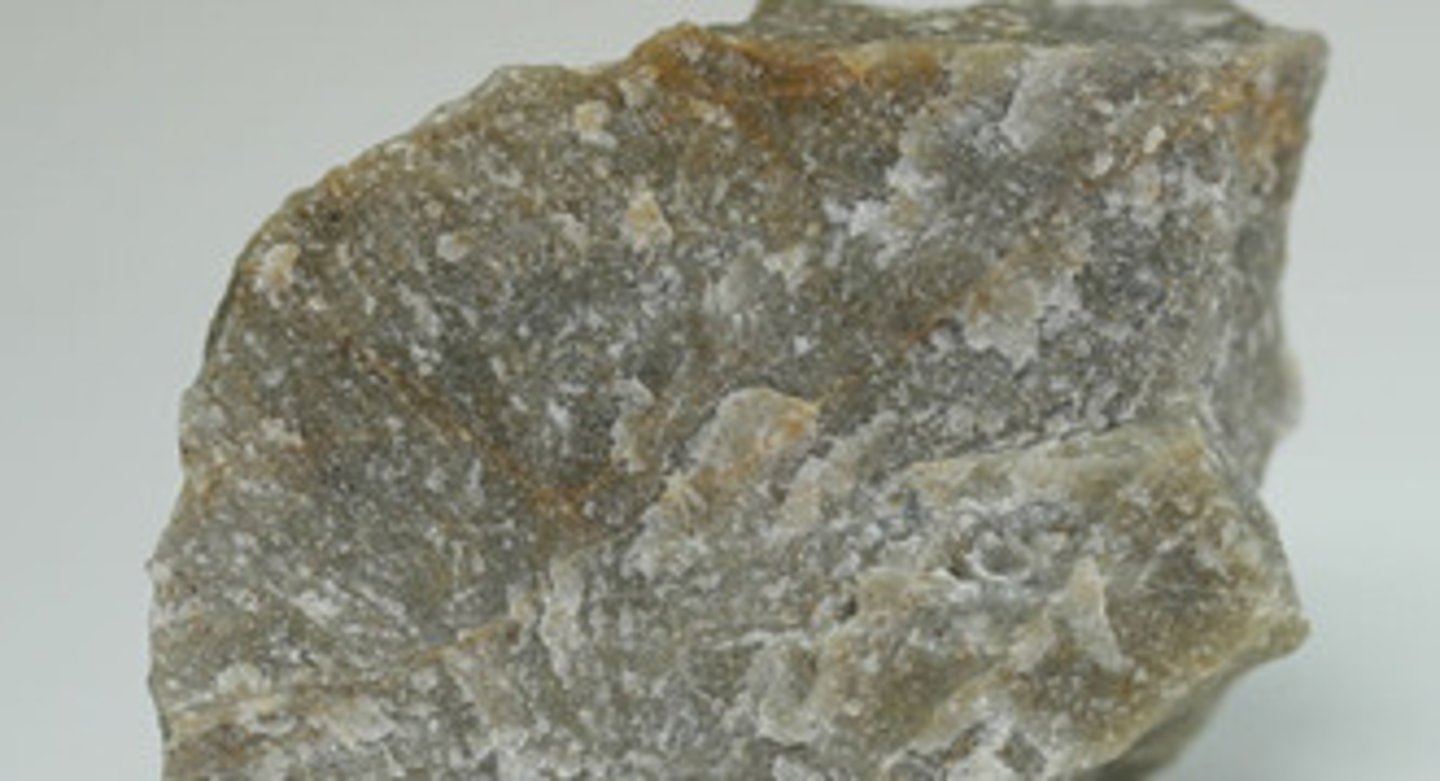
SCHIST (GARNET)
Metamorphic rock rich in micas, with quartz and feldspars also present. Medium to coarse-grained grained dark rock with garnet crystals (usually red variety "almandine"). Schistosity is well-developed due to parallel alignment of micas.
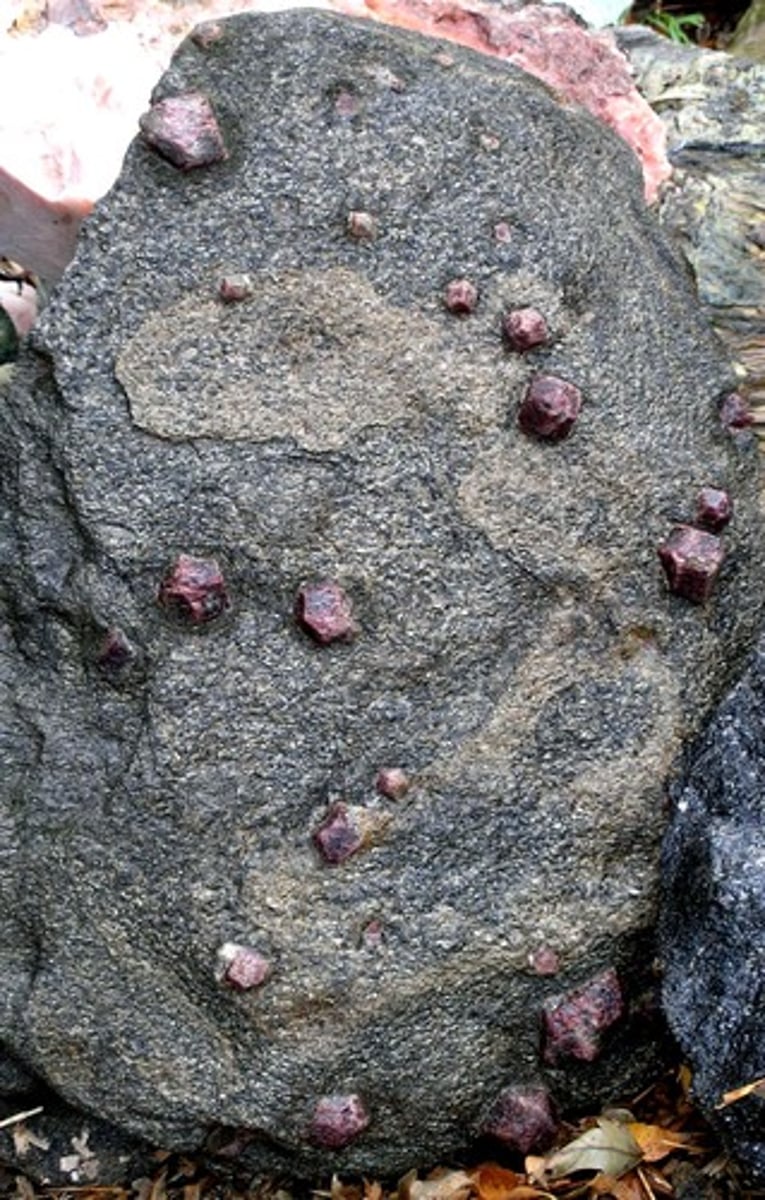
SCHIST (MICA)
Metamorphic rock that is rich in mica along with quartz and feldspar. May be darker if it is a biotite schist or more silvery if it is a muscovite schist. Medium-grained rock with crystals that are visible to the naked eye.
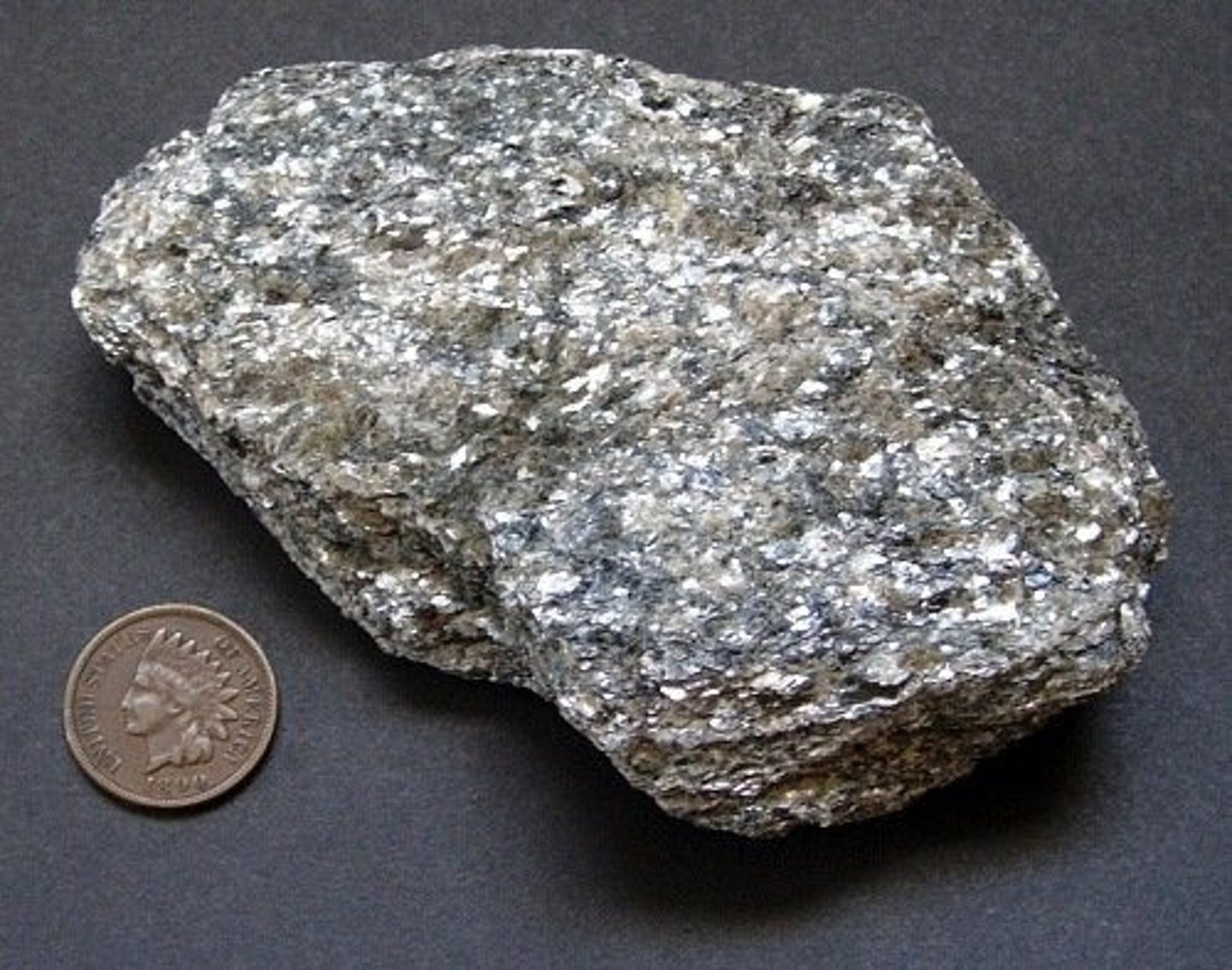
SLATE
Metamorphic rock; may be med. to dark gray to black. Sometimes green, dk red, purple, brown, yellow. Has perfect slaty cleavage and splits readily due to foliation of mica flakes. Also contains quartz, feldspar and small amounts of other minerals. Grain size too small to be seen w/o a microscope.
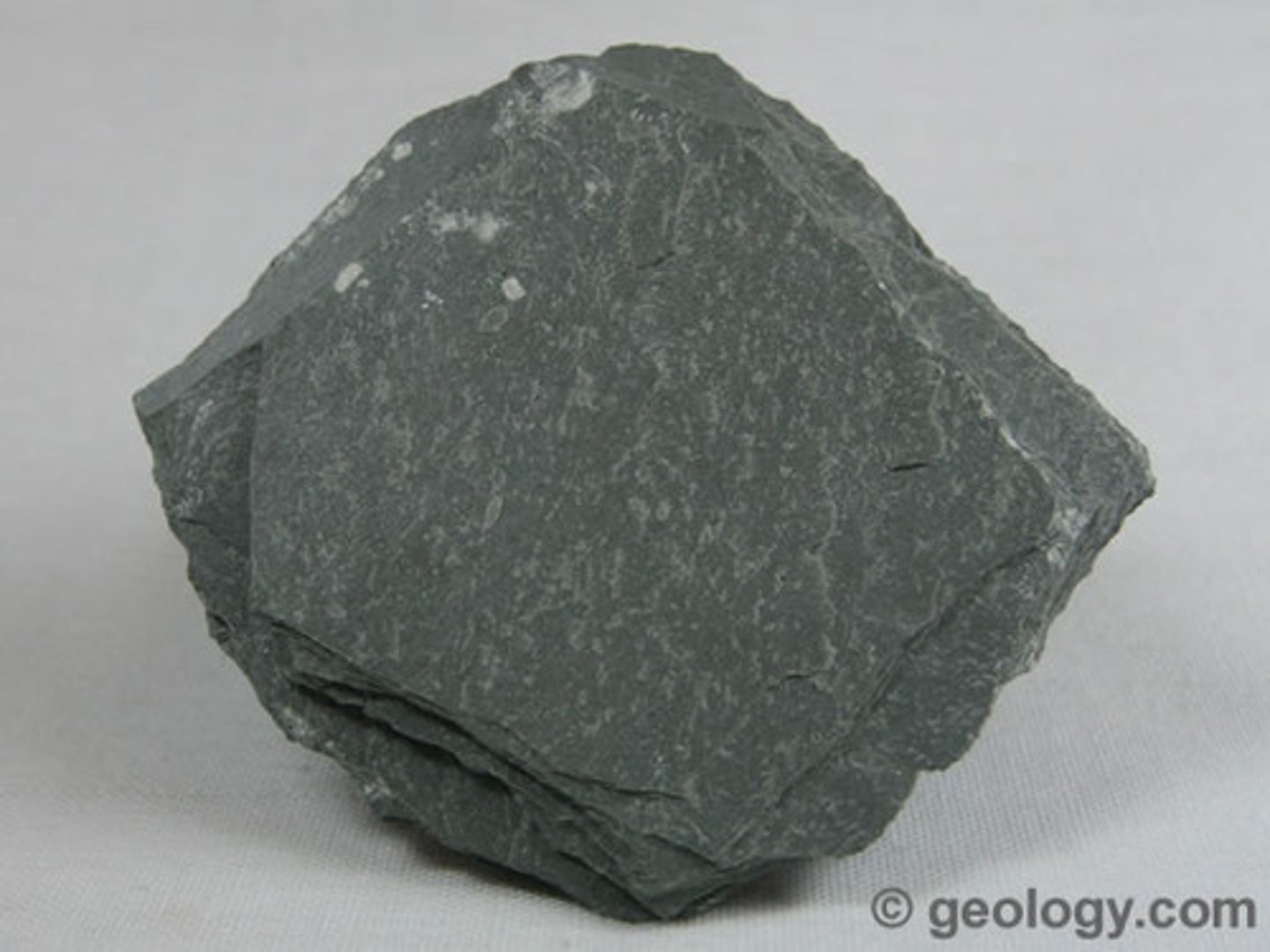
ANDESITE
Igneous rock
Color: medium
Grain size: fine
Origin: Extrusive, Volcano
Phenocrysts set into the matrix are usually white tabular feldspar crystals. Rock forms as lava flows from andesitic volcanoes, which are second only in abundance to basalt and are associated with subduction zones, as in the Andes mountains of South America.
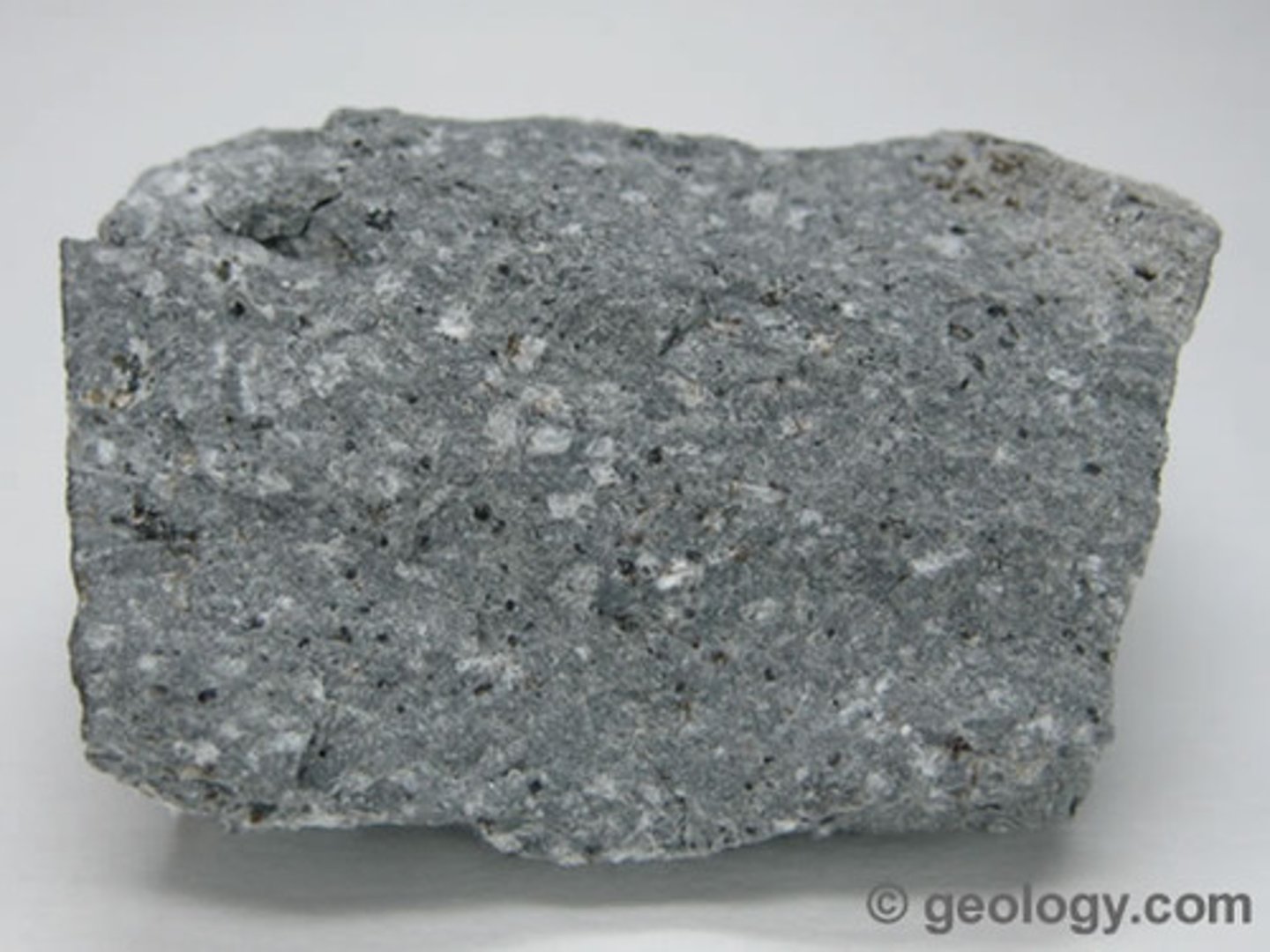
BASALT
Igneous rock
Color: dark
Grain size: fine
Origin: Extrusive, Volcano
Forms by cooling of highly mobile lavas. Occurs in many continental areas and is the principle rock of the ocean floor. Forms much of island of Hawaii.
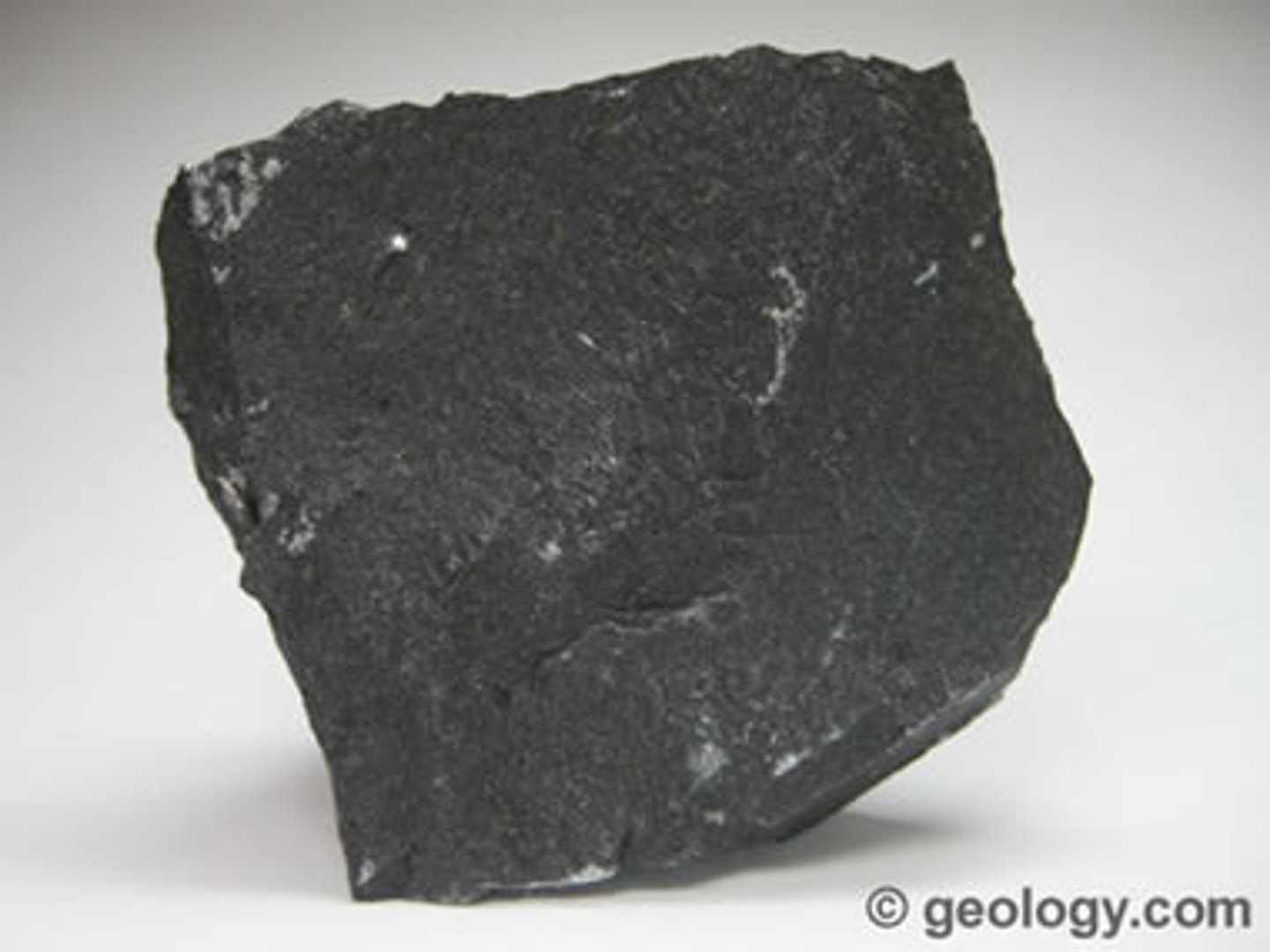
DIORITE
Igneous rock
Color: medium, dark
Grain size: coarse
Origin: Intrusive, Pluton, Dike
Mainly composed of plagioclase feldspar and hornblende.
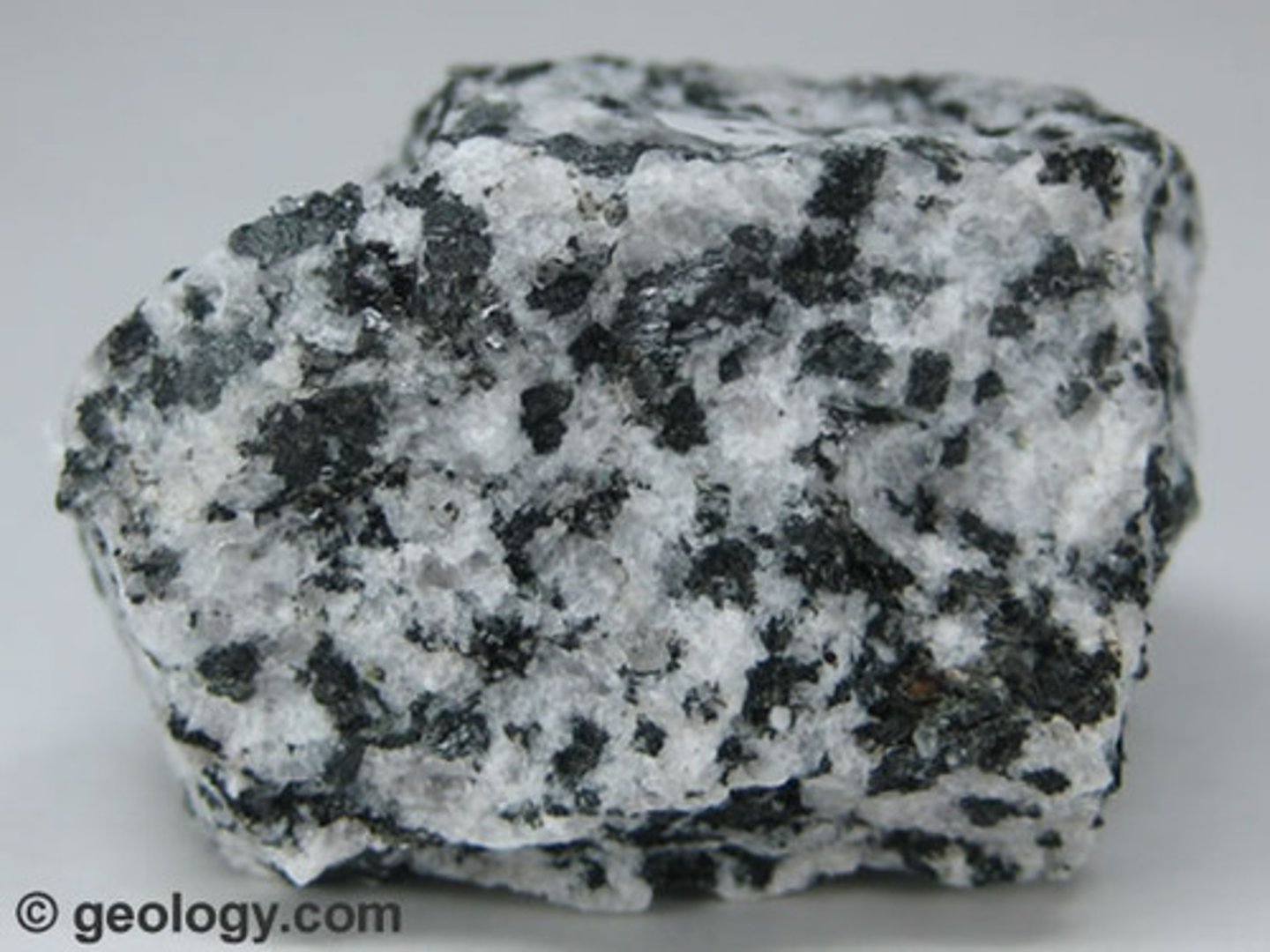
GABBRO
Igneous rock
Color: medium
Grain size: coarse
Origin: Intrusive, Pluton
Contains little quartz. Comprised mainly of calcic plagioclase, pyroxene (usually augite), olivine and magnetite. May be layered. May have distinct light and dark layers from several inches to feet thick.
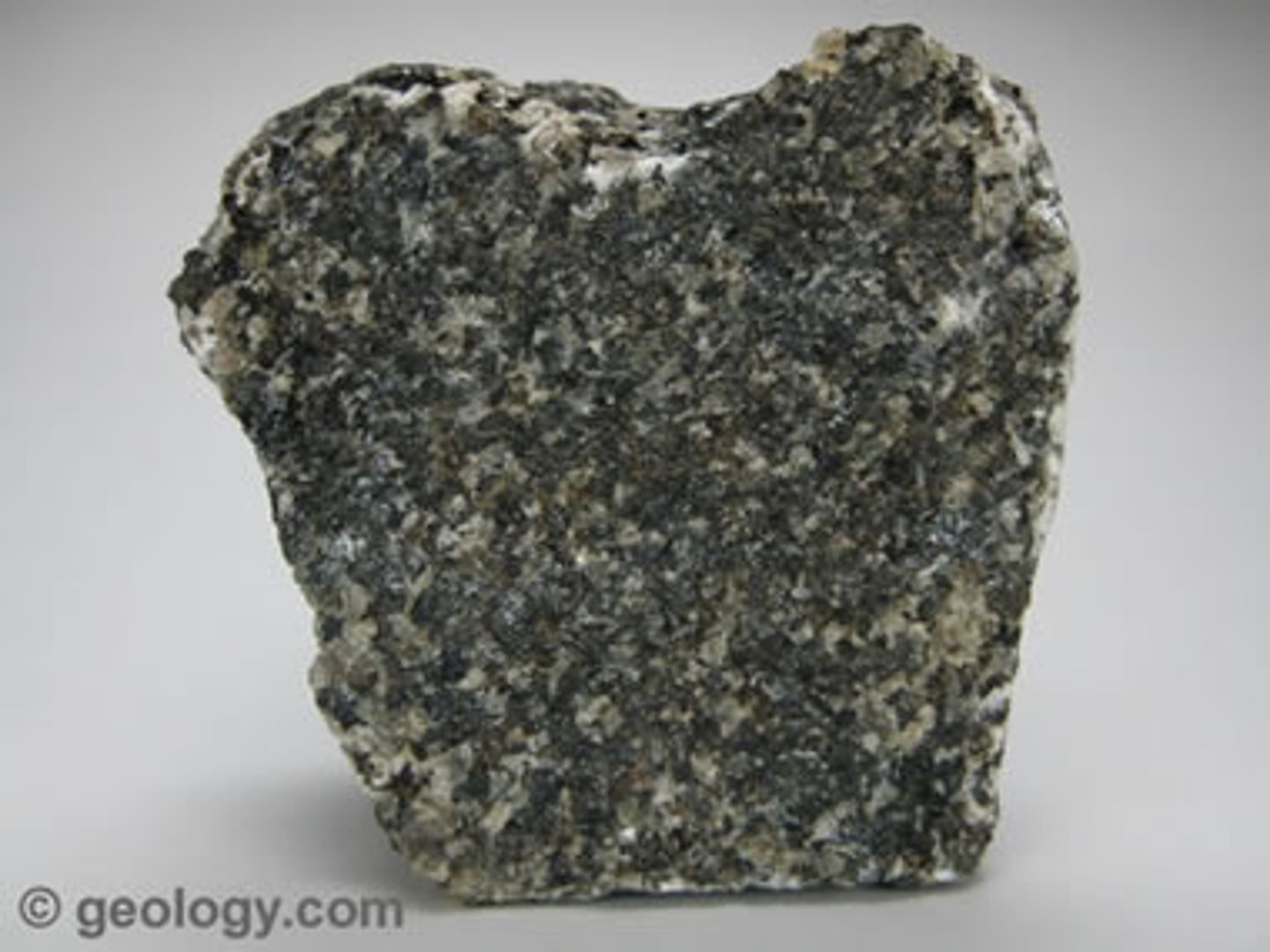
GRANITE
Igneous rock
Color: light
Grain size: coarse
Origin: Intrusive, Pluton
Commonest of all intrusive igneous rocks. Formed by slow cooling and crystallization of magma at depth in the earth's crust. Contains quartz, feldspars (orthoclase and others), and micas. May be more whitish, blackish, more evenly black and white, or more pinkish, depending on the mineral content.
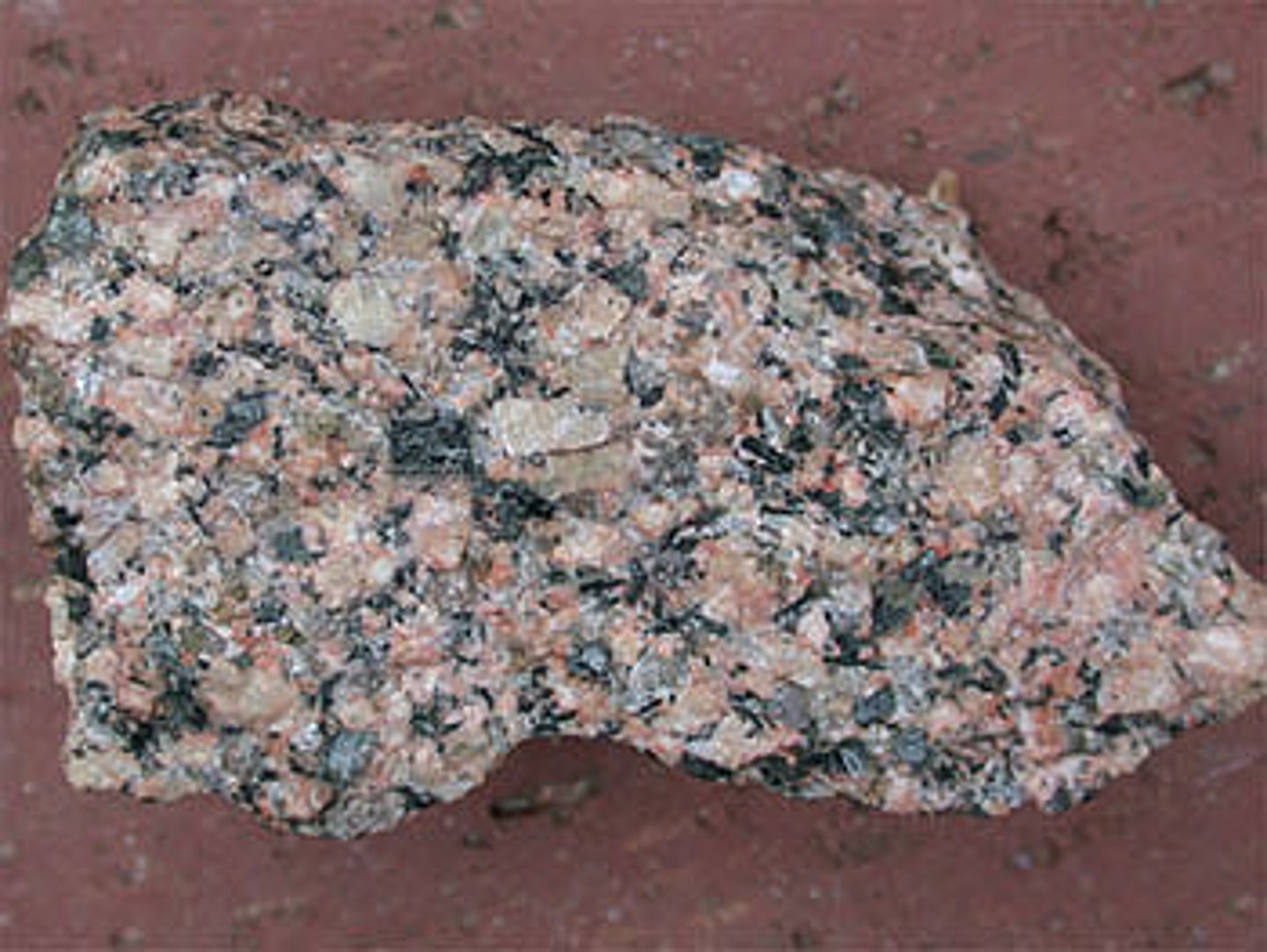
OBSIDIAN
Igneous rock
Color: dark
Grain size: very fine
Origin: Extrusive, Volcano
Silica-rich volcanic rock. Glass is its main component. Texture is glassy and it breaks with a very sharp conchoidal fracture. Forms by the very rapid cooling of viscous lava.
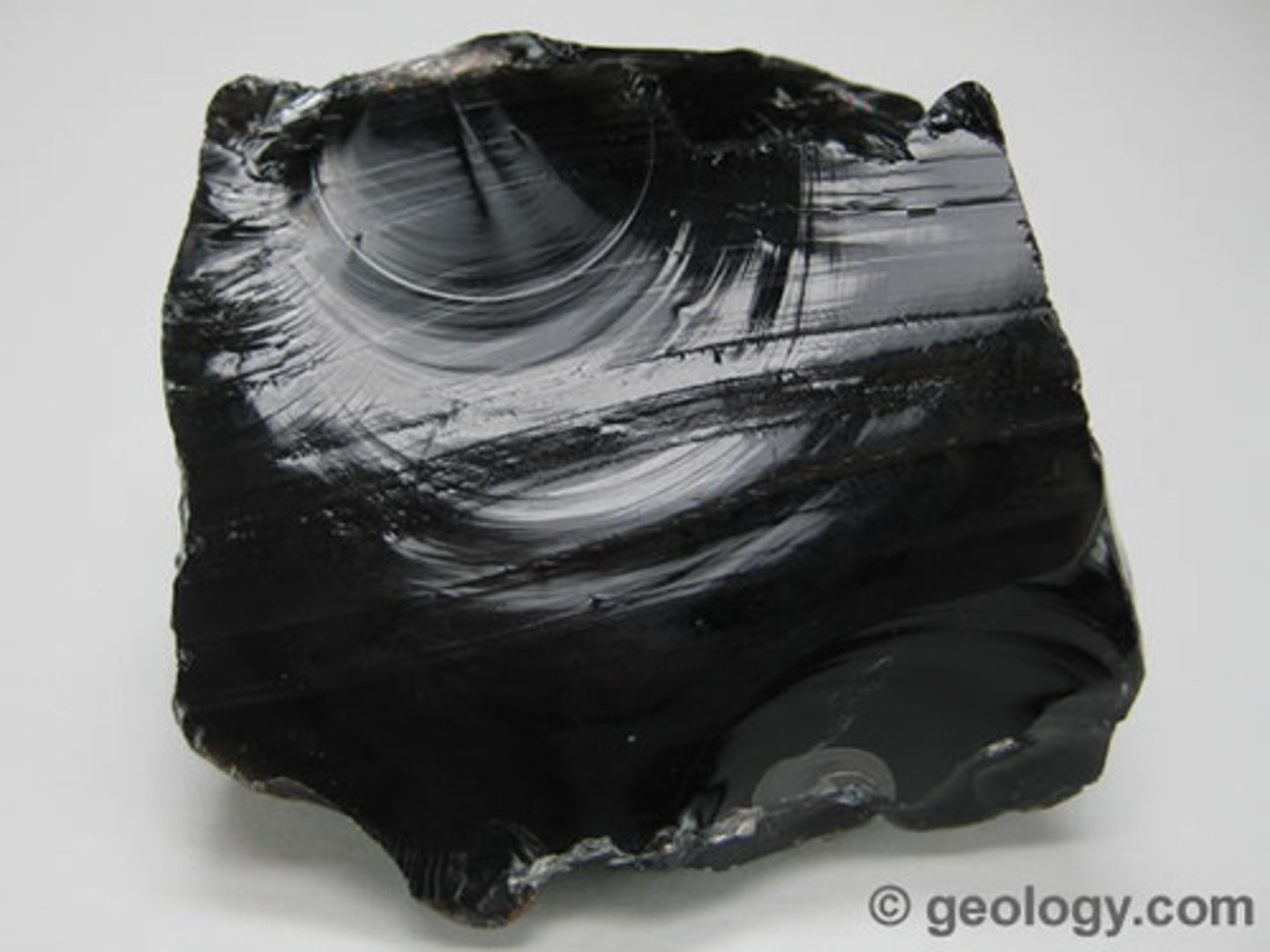
PEGMATITE
Igneous rock
Color: light
Grain size: very coarse
Origin: Intrusive, Pluton, Dike, Sill
Very coarse-grained; grain size and mineral distribution are highly variable. All contain more than 65% silica, but may also contain a high percentage of feldspar, mica, and/or tourmaline along with quartz and other minerals.
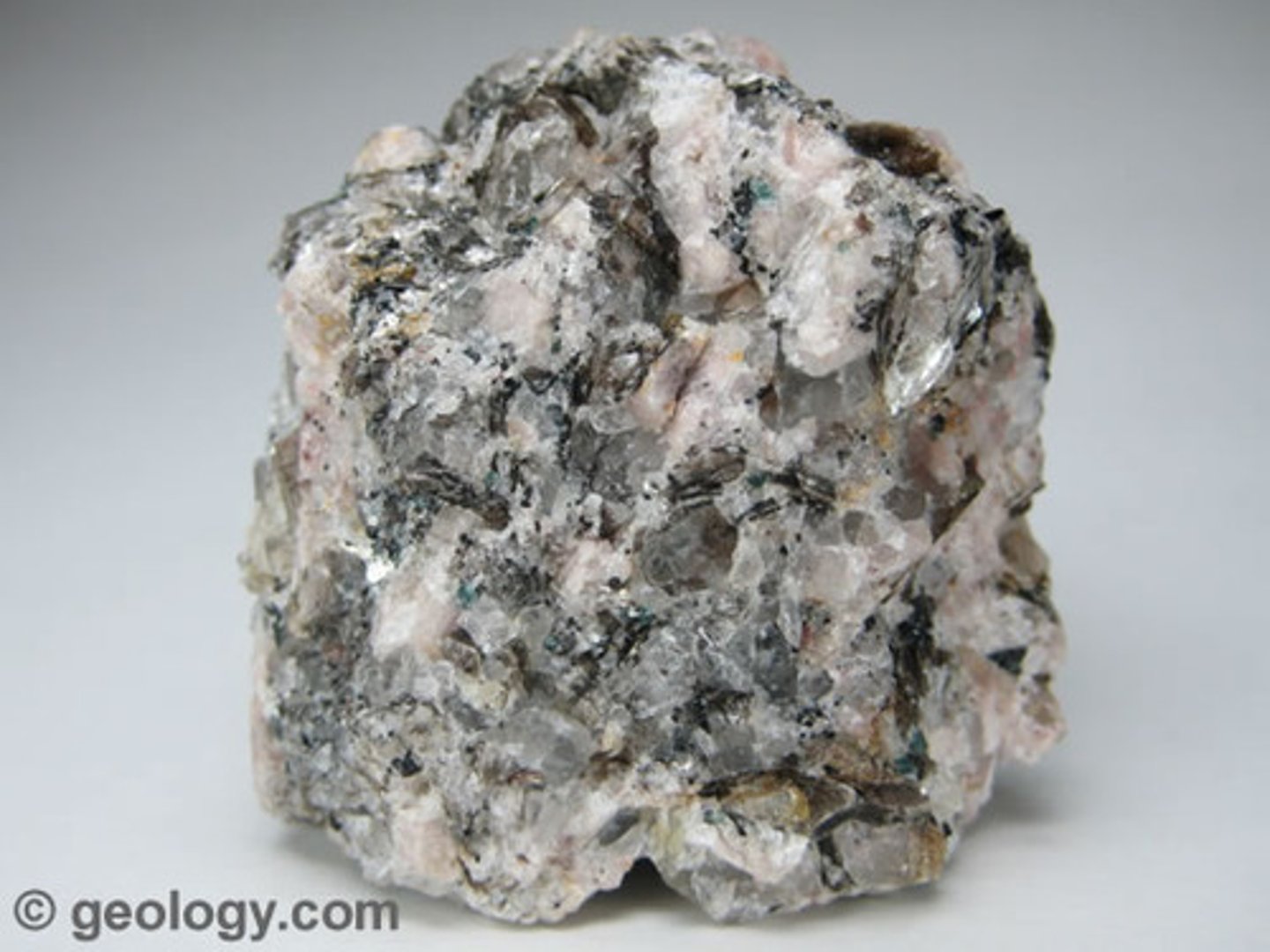
PUMICE
Igneous rock
Color: medium, shades of gray, yellow, brown, pale to deep red
Grain size: fine
Origin: Lava, Ash
Forms as frothy lavas associated with rhyolitic volcanic eruptions. Contains many hollows and cavities, making the density of the rock so low that it can easily float in water. Contains variety of silicate minerals such as feldspar and a considerable amount of glass.
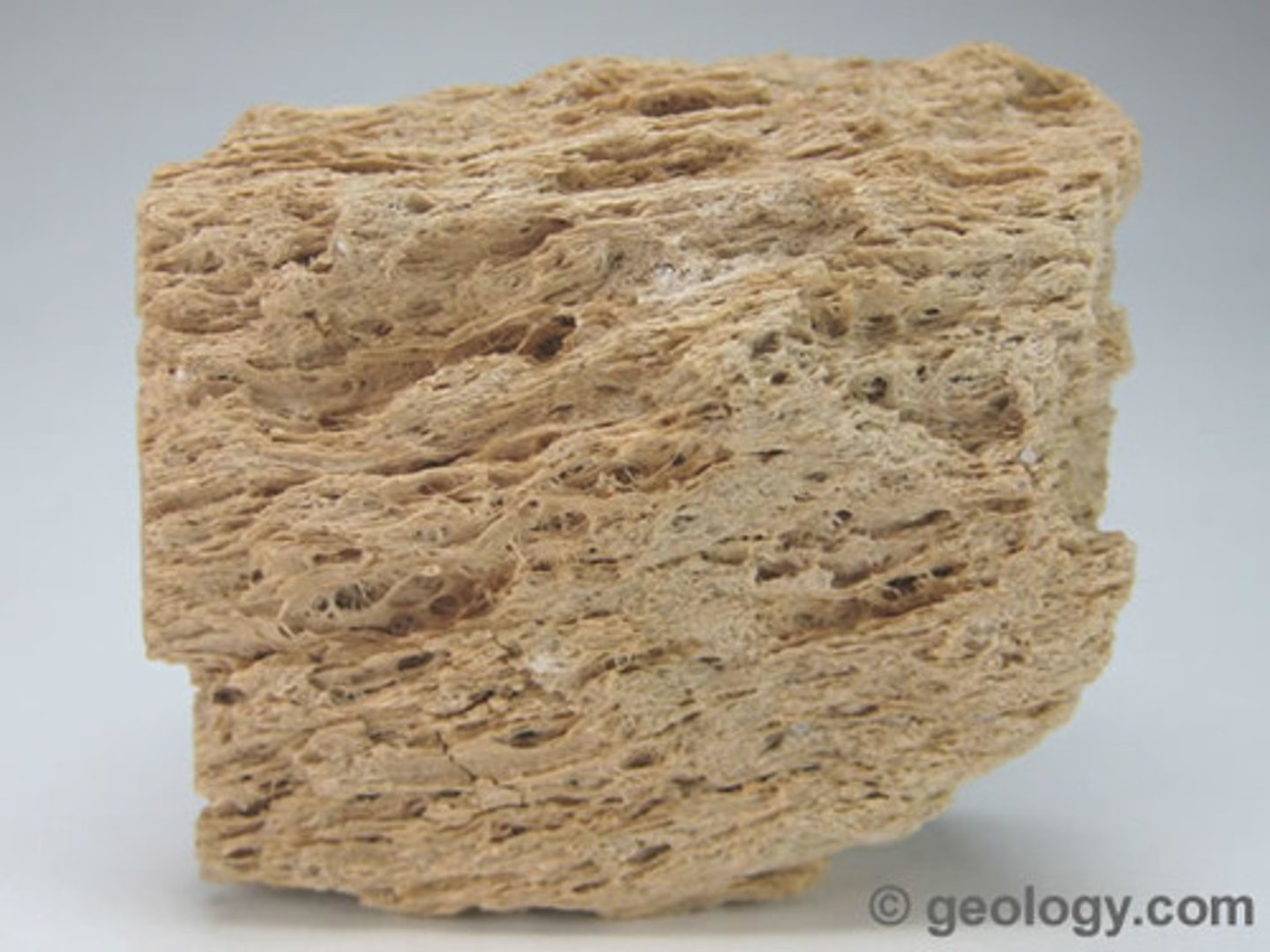
RHYOLITE
Igneous rock
Color: light; shades of pale to deep red, gray, yellow, brown
Grain size: fine
Origin: Extrusive, Volcano
Same general composition as granite, but fine-grained, and with glass as a major component. May have small phenocrysts. Biotite usually present. These rocks erupt from volcanoes with explosive violence, and are the result of the cooling of viscous lava.
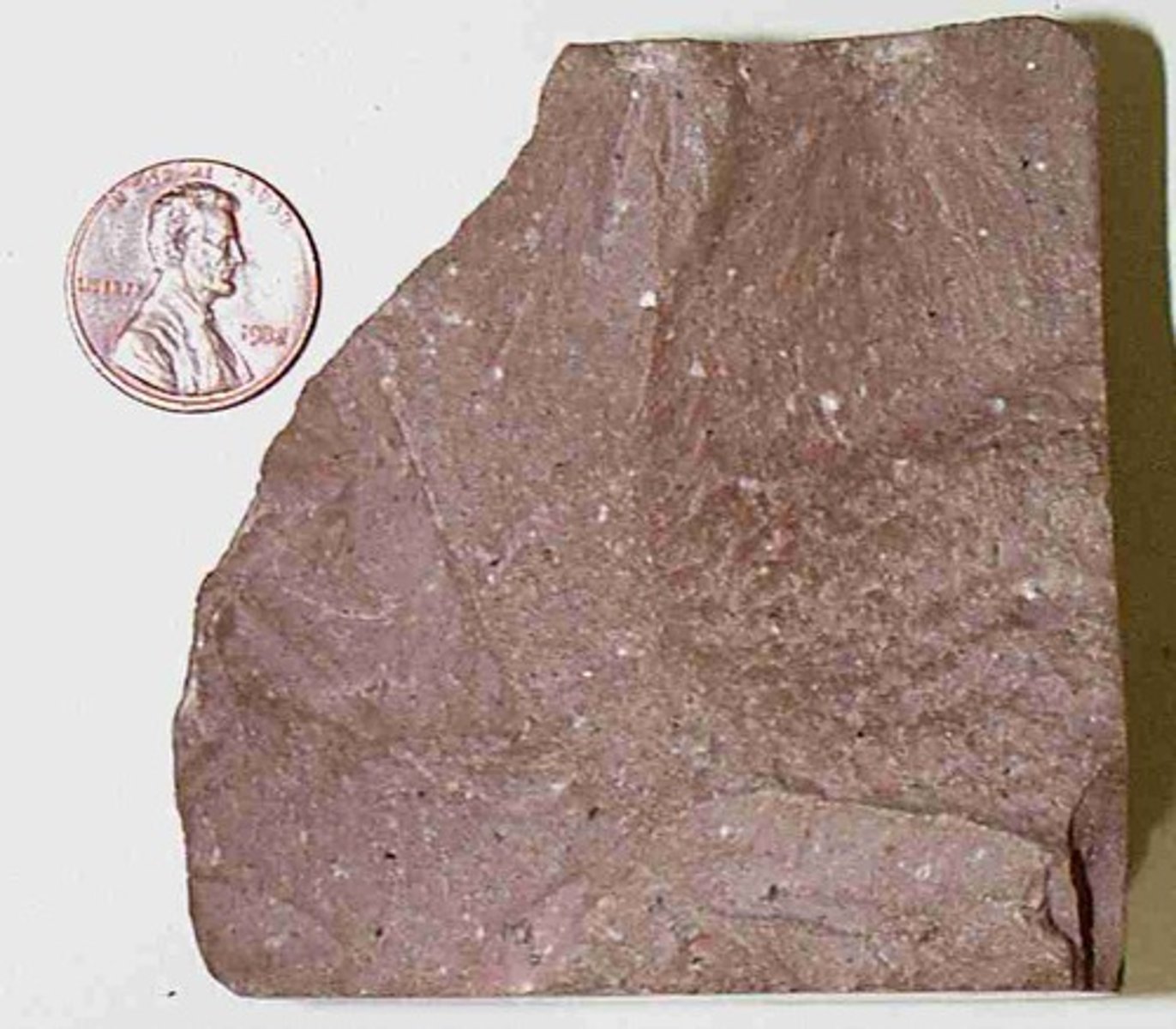
SCORIA
Igneous rock
Color: dark
Grain size: fine
Origin: Extrusive, Volcano
Dark-colored, vesicular, extrusive igneous rock. Associated with basaltic lava flows. The vesicles are a result of trapped gas within the melt at the time of solidification. It often forms as a frothy crust on the top of a lava flow or as material ejected from a volcanic vent and solidifying while airborne.
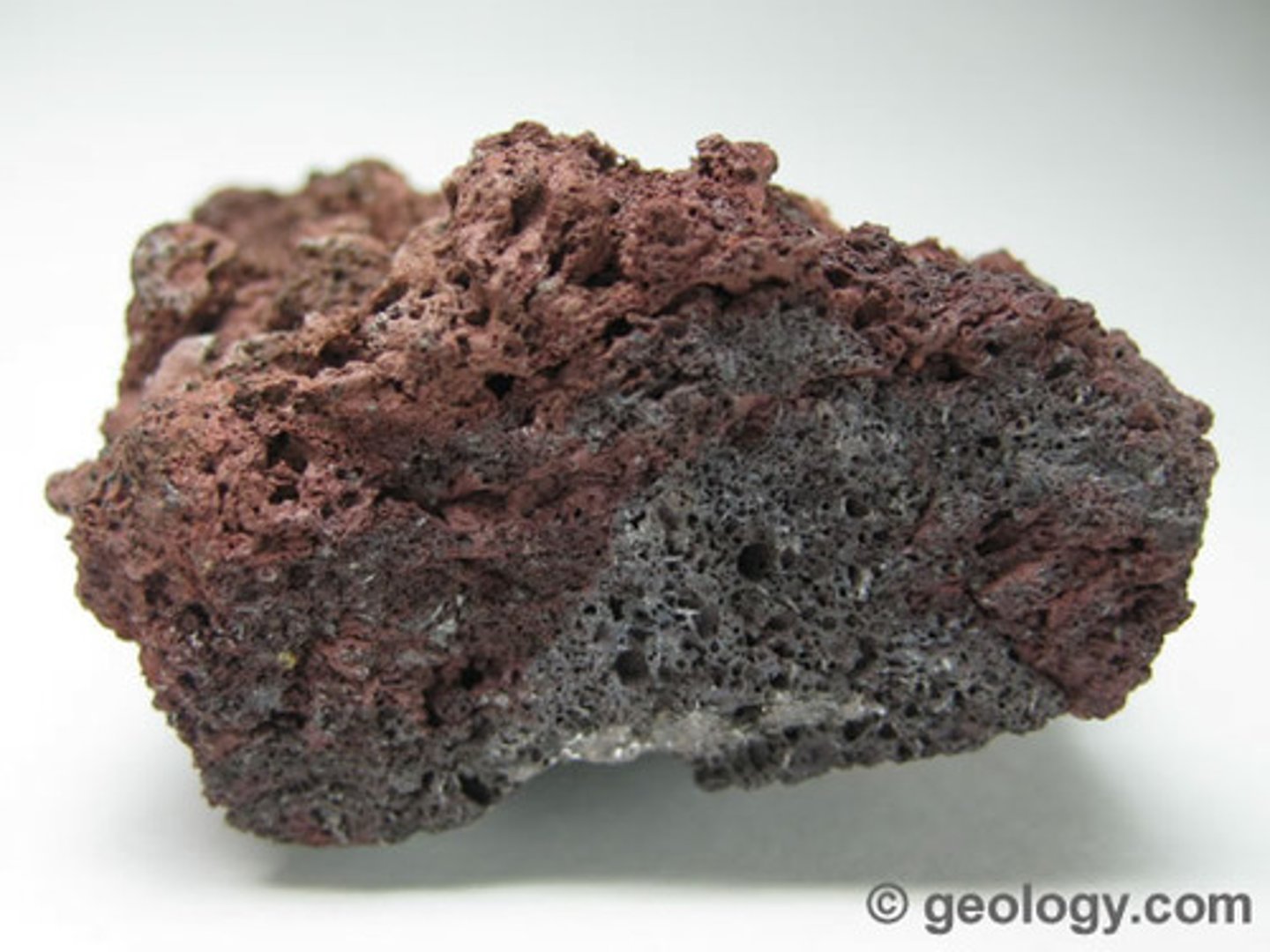
ANTHRACITE COAL
Sedimentary rock
Color: black
Grain size: fine-medium
Texture: more glassy in appearance, cleaner to handle than bituminous coal. Formed by "destructive distillation of plant remains," which starts out as peat, then becomes lignite, then bituminous coal, and finally anthracite, by elevated temps and pressures. If higher pressure, then graphite or pure carbon will form.
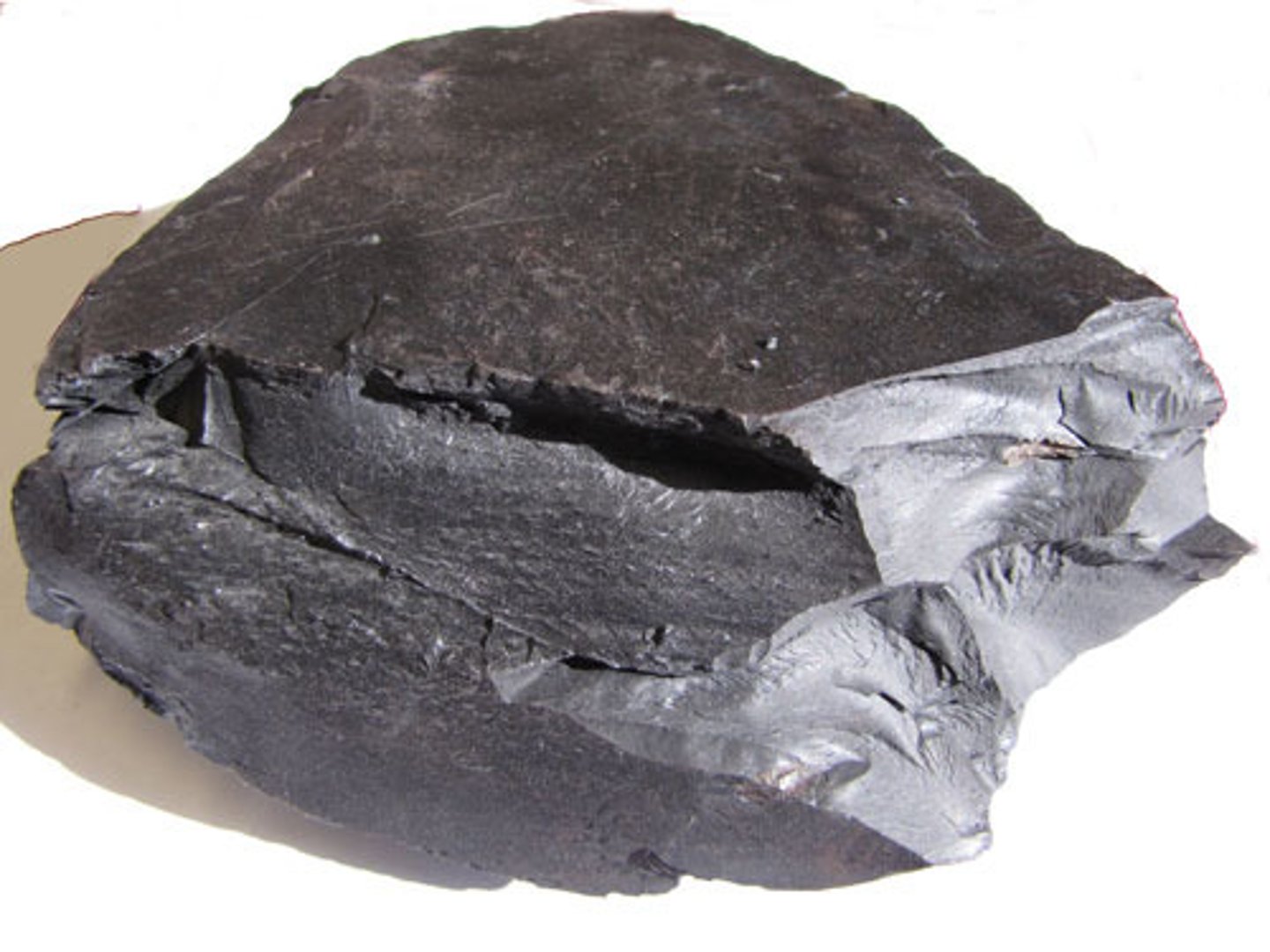
ARKOSE
Sedimentary rock
Color: pinkish or gray
Grain size: medium
Origin: marine, fresh water, fossils rare
Predominanly quartz with some feldspar, mica, calcic cement. Angular grains in a sandstone-like rock.
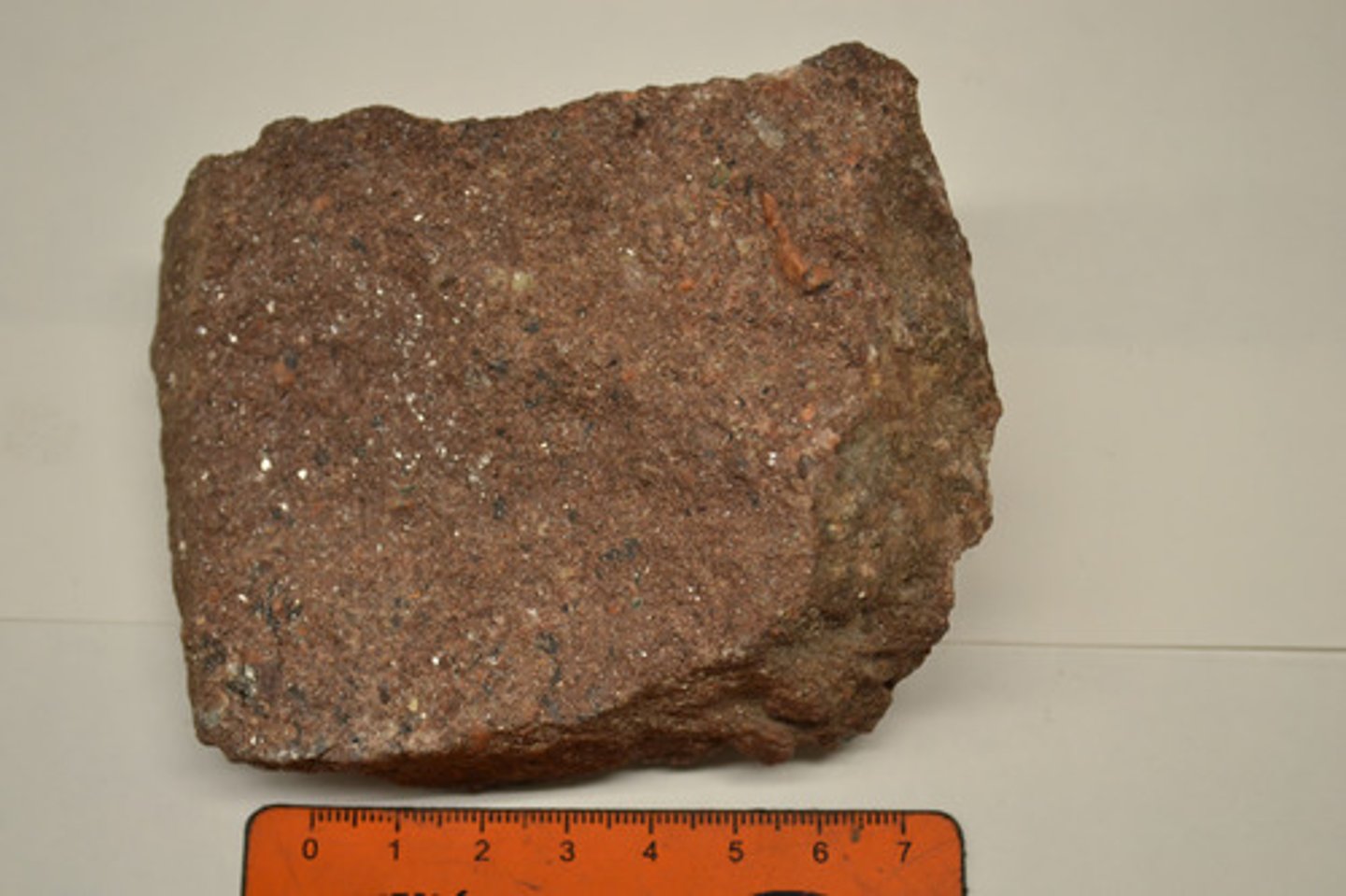
BITUMINOUS COAL
Sedimentary rock
Color: black
Grain size: medium-fine
Texture: hard, brittle, alternating shiny and dull layers, may contain some recognizable plant material. Dirty to handle. Formed by "destructive distillation of plant remains," which starts out as peat, then becomes lignite, then bituminous coal, and finally anthracite, by elevated temps and pressures. If higher pressure, then graphite or pure carbon will form.
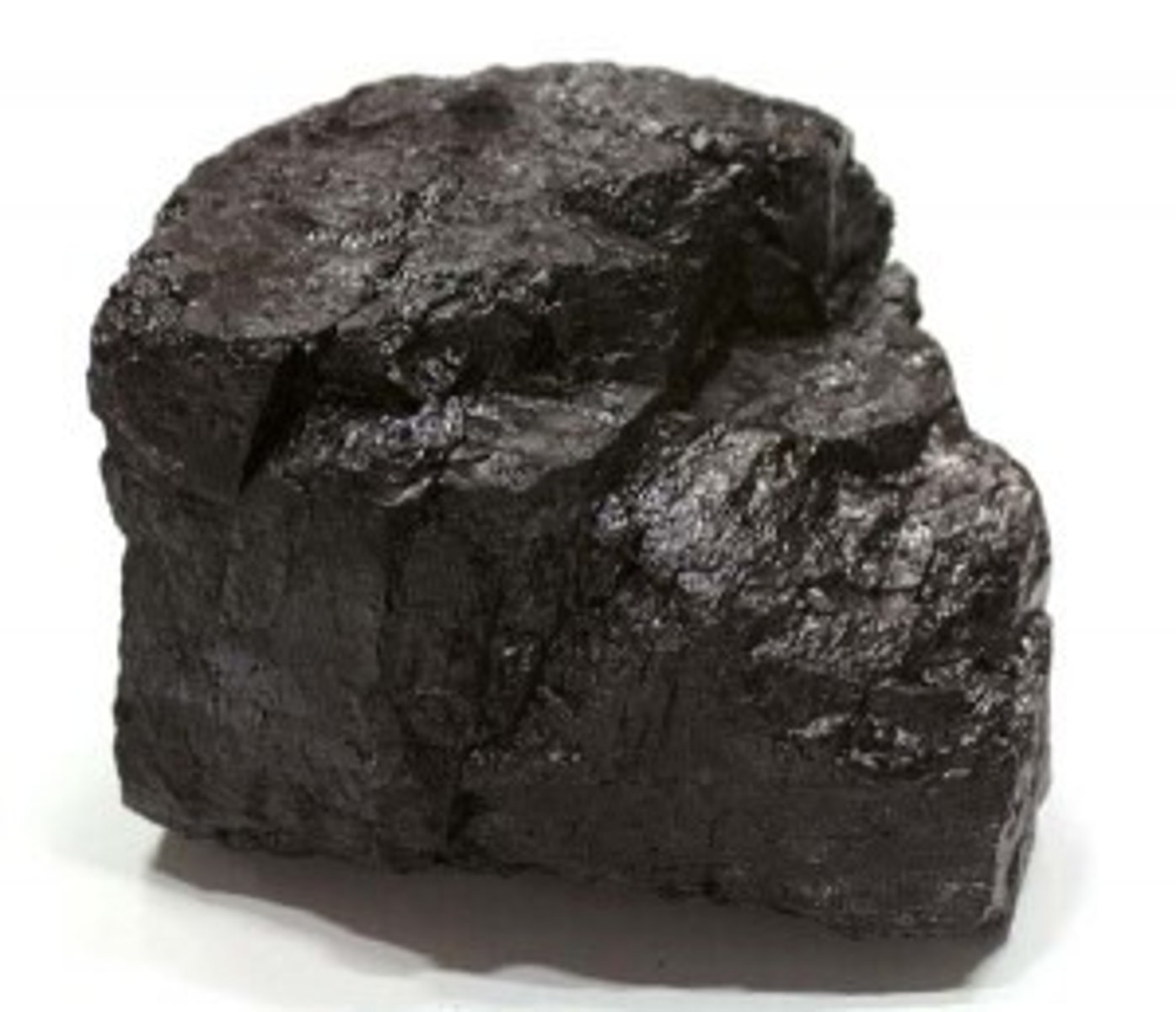
BRECCIA
Sedimentary rock
Color: variable
Grain size: very coarse, angular
Origin: water, transitional; fossils very uncommon, except in limestone breccia
The large fragments of rocks and minerals in breccia are anglar, and the surrounding material (fine to medium-grained sand) is also angular.
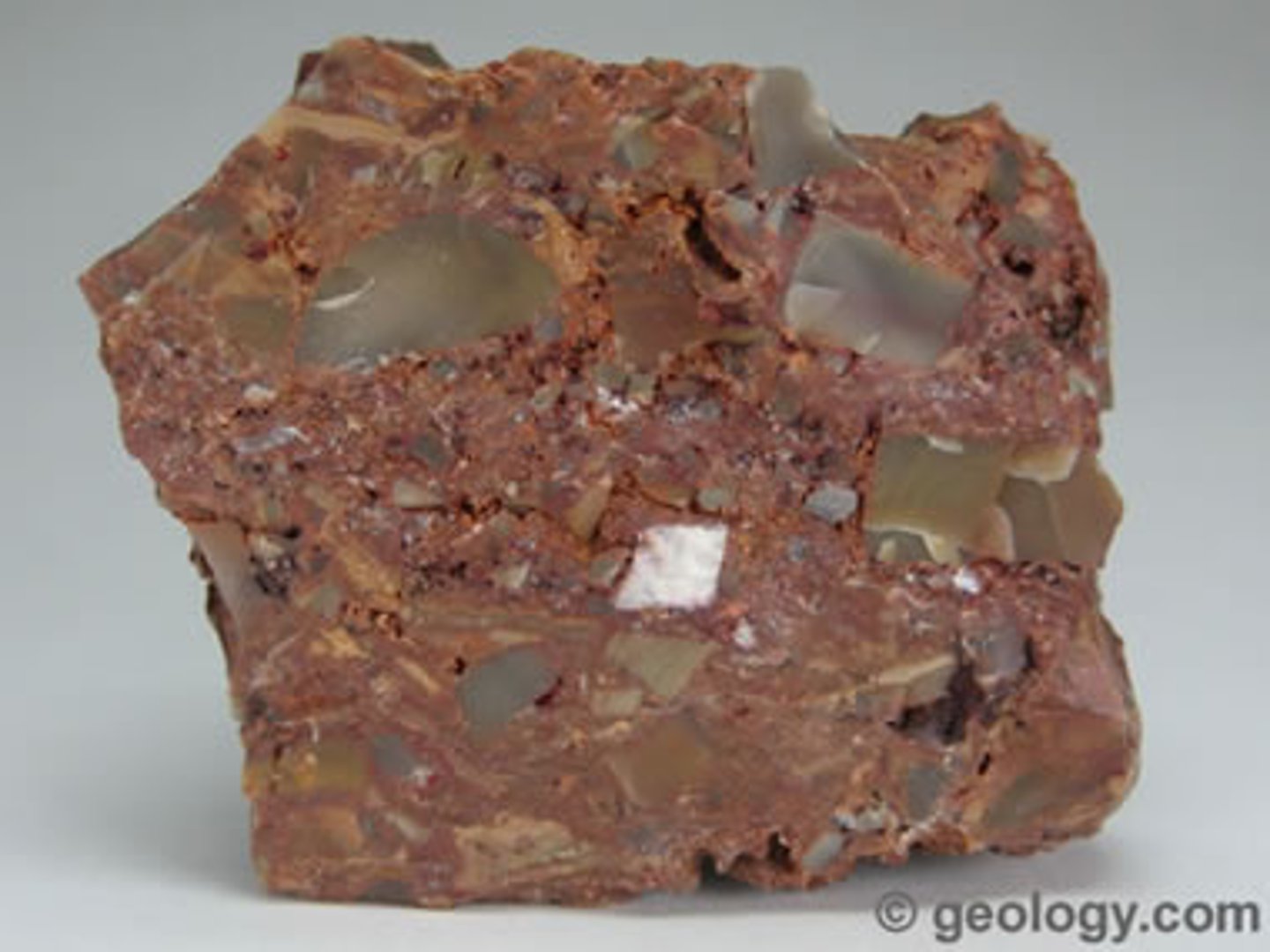
CHERT
Sedimentary rock
Color: Whitish, dull gray, smoky brown to black
Grain size: fine
Origin: marine
Occurs as siliceous nodules or sheets, esp. in sedimentary rock such as limestone and among lavas. Breaks in a subconchoidal fracture. Hard rock that cannot be scratched with a knife. Sedimentary quartz.
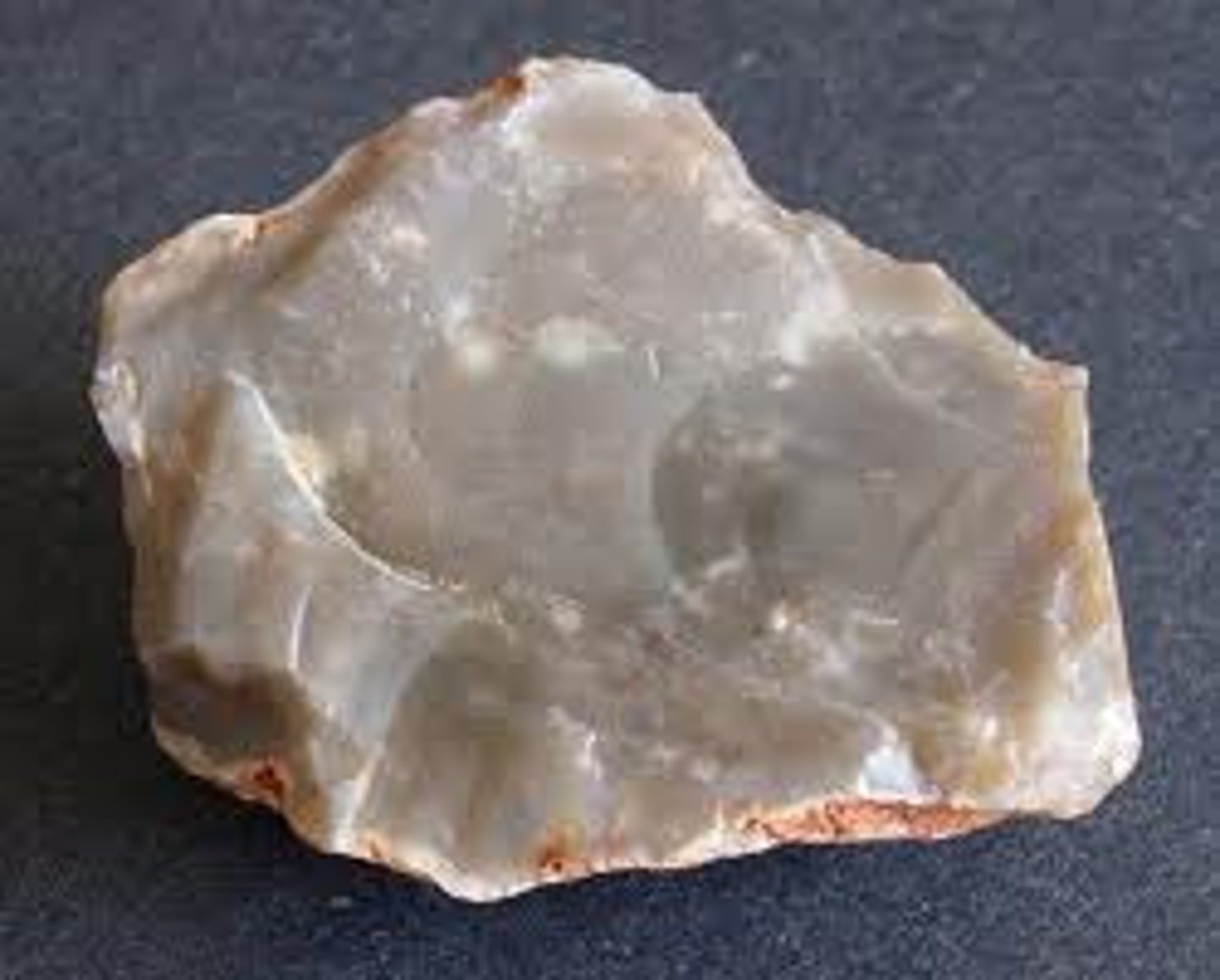
CONGLOMERATE
Sedimentary rock
Color: highly variable
Grain size: very coarse
Origin: marine, fresh water
Contains a variety of different materials that may be derived from igneous, metamorphic, and/or sedimentary rocks as well as particles of individual minerals. The fragments can be cemented together by a variety of minerals, including quartz, iron oxides, and calcite. The grains in a conglomerate are rounded, or sub-rounded, by the action of water. Forms in high-energy environments, such as, powerful water currents.
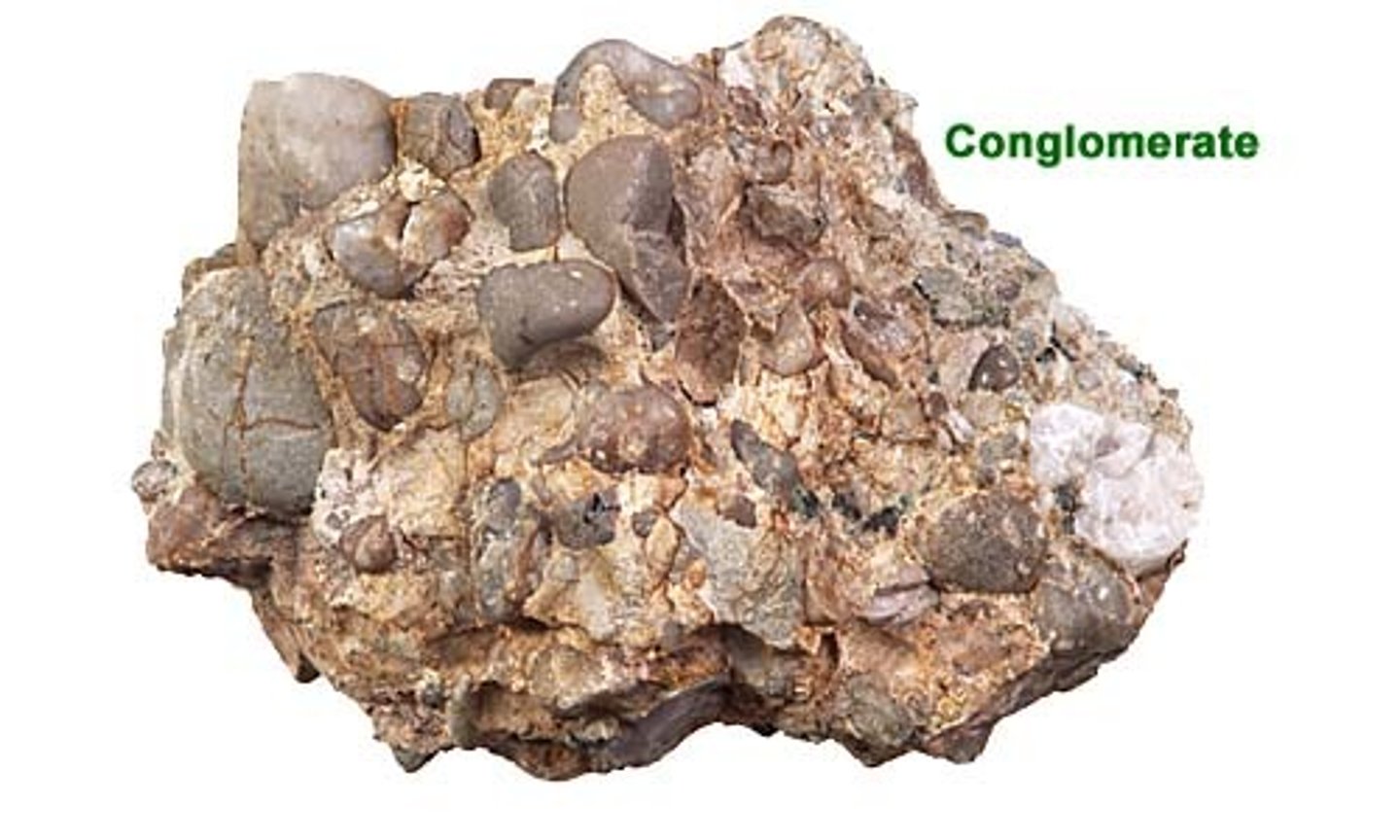
COQUINA
Sedimentary rock
Color: pale brown
Grain size: coarse
Origin: marine
Composed of shells of invertebrates that average in size 2mm or larger and are poorly to moderately cemented. Forms in high-energy marine and lacustrine environments.
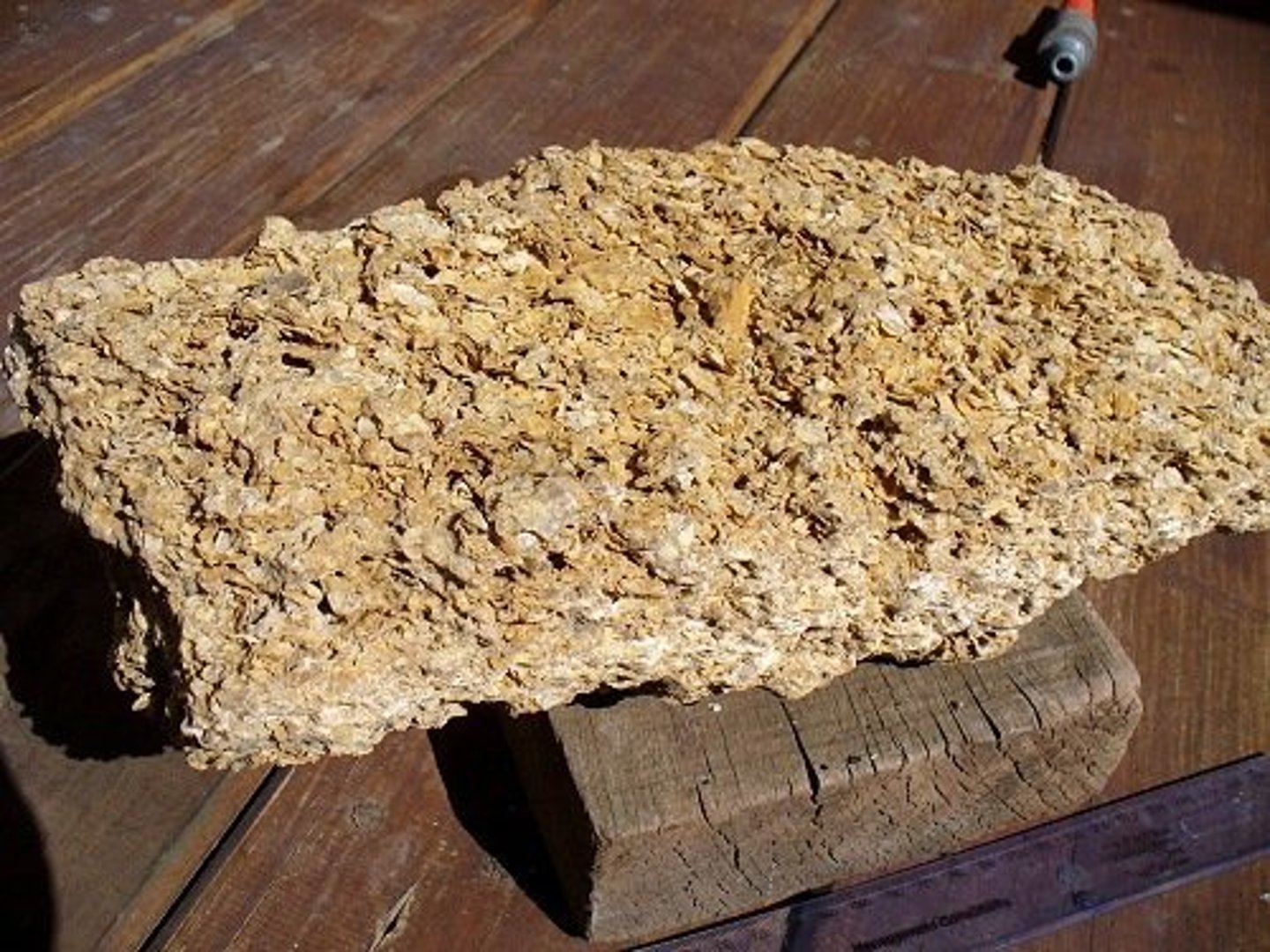
DIATOMITE (diatomaceous earth)
Sedimentary rock
Color: light tan, cream, or white
Grain size: very fine
Origin: marine
Made up of microscopic shells of diatoms. Resembles chalk or fine-grained volcanic ash-beds. Soft and easy to scratch with a knife. Lightweight and may float on water until saturated.
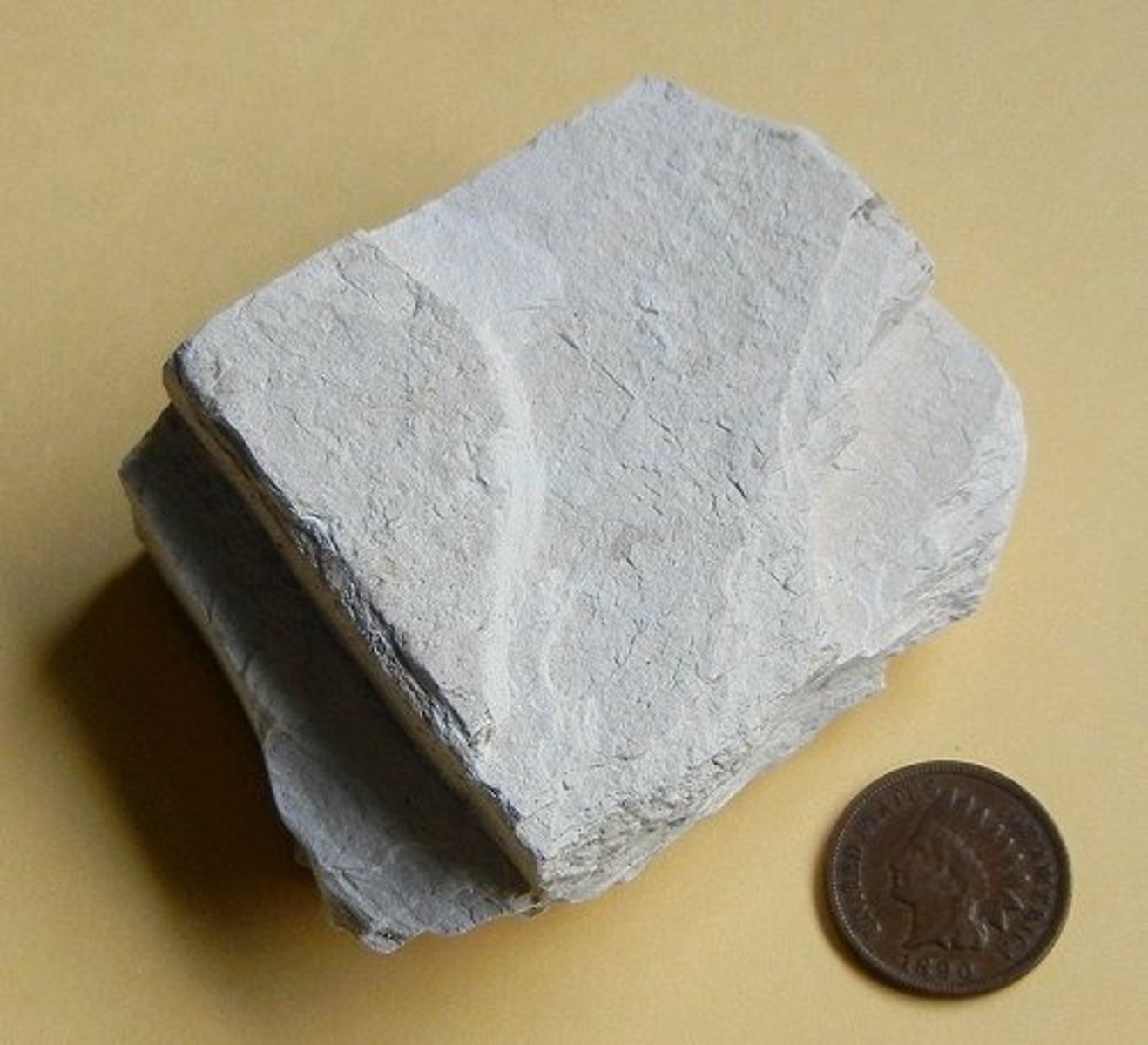
DOLOMITE ROCK OR DOLOSTONE (sedimentary)
Sedimentary rock
Color: light gray, yellowish, pinkish, tan
Grain size: medium-fine
Origin: marine
Contains detrital minerals and secondary silica (chert). Darker than limestones, and less fossiliferous. Often has even crystalline texture. Masses are often compact and earthy.
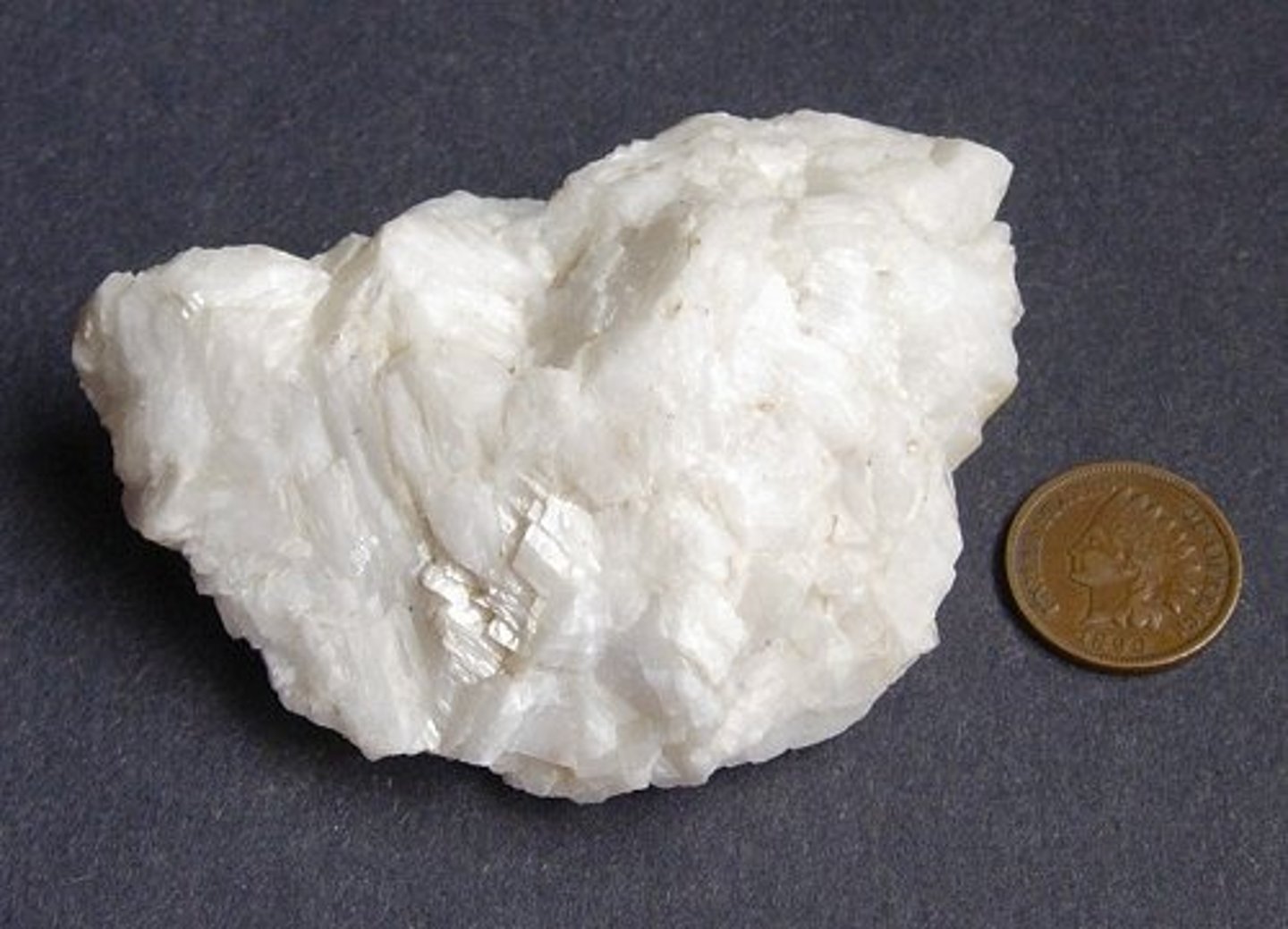
LIGNITE COAL
Sedimentary rock
Color: chocolate brown, sometimes yellowish or black
Grain size: medium-fine
Texture: Crumbly, less compact than other coals. Has a large amount of visible plant material in its structure and is friable. Has a carbon content that is between peat and bituminous coal. Formed by "destructive distillation of plant remains," which starts out as peat, then becomes lignite, then bituminous coal, and finally anthracite, by elevated temps and pressures. If higher pressure, then graphite or pure carbon will form.
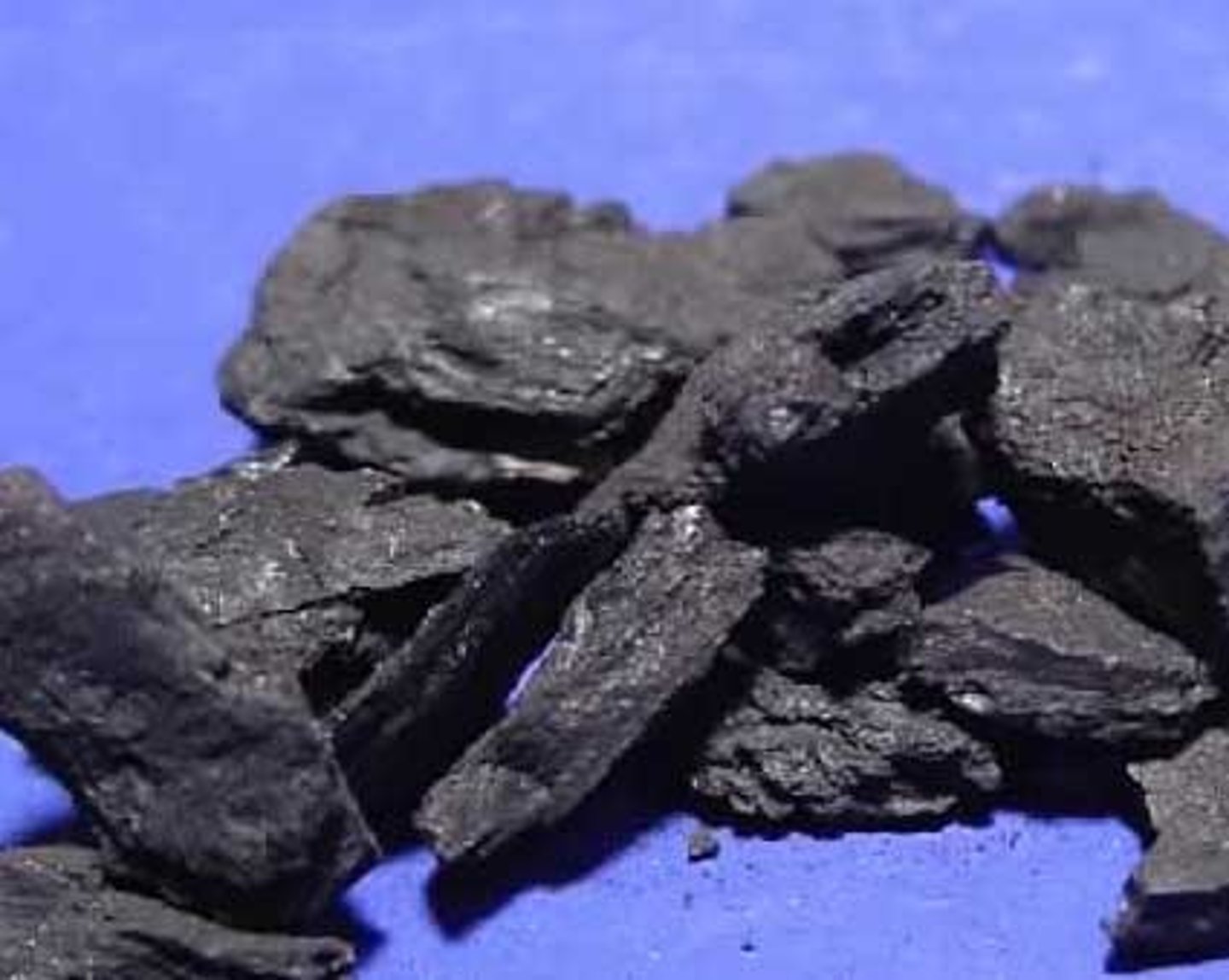
LIMESTONE - CHALK
Sedimentary rock
Color: white
Grain size: very fine
Texture: very fine, powdery, soft rock
Very pure limestone formed of calcite and coverings of microorganisms and macrofossils. Effervesces strongly with hydrochloric acid (HCl). Formed in sea water at great depth where nearby continental areas were low-lying and arid.
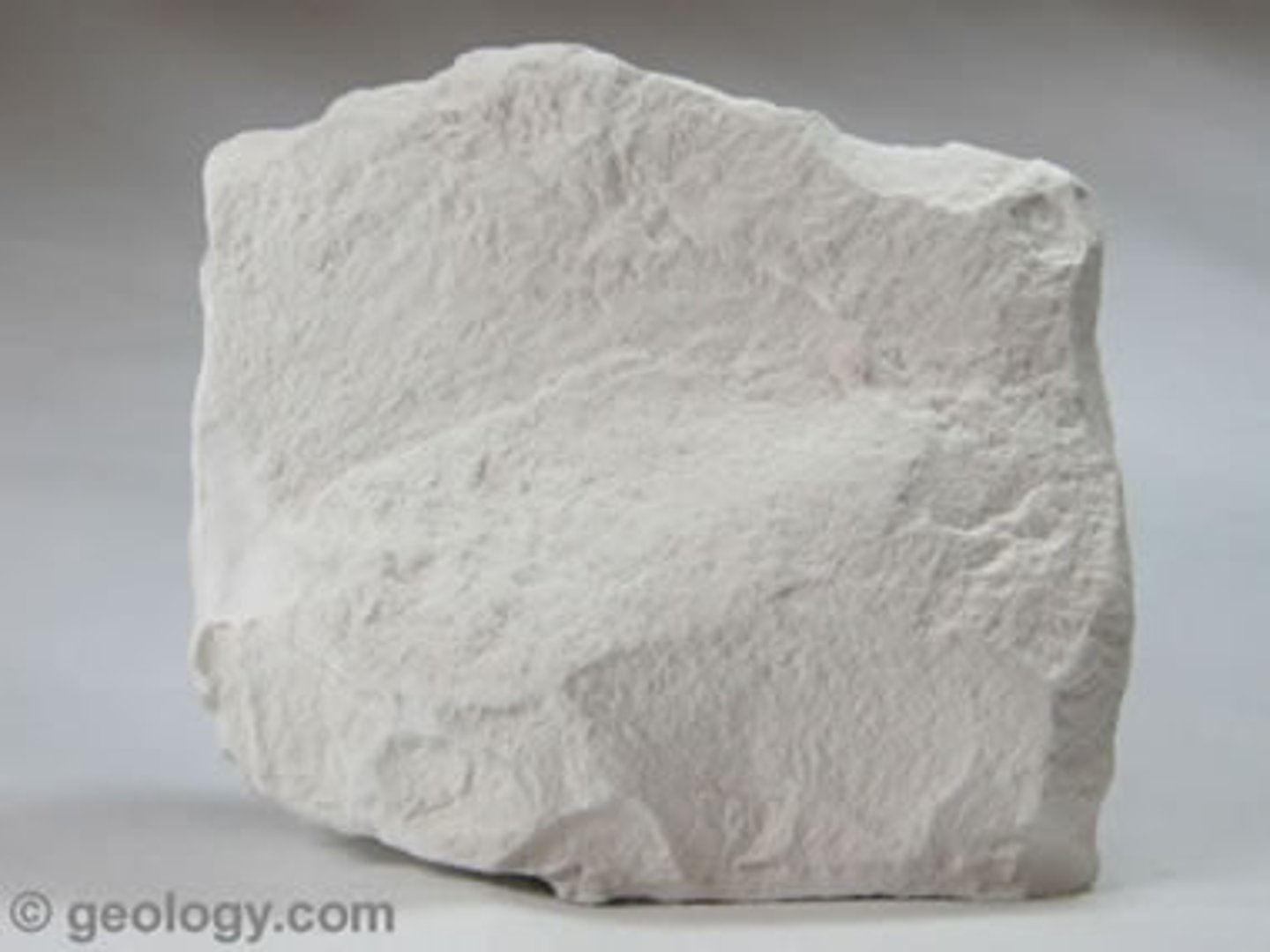
LIMESTONE - CRYSTALLINE
Sedimentary rock
Color: white
Grain size:
Formed when calcium carbonate recrystallizes in previously formed limestone. The rock often resembles marble but is usually softer and individual calcite crystals can be seen.
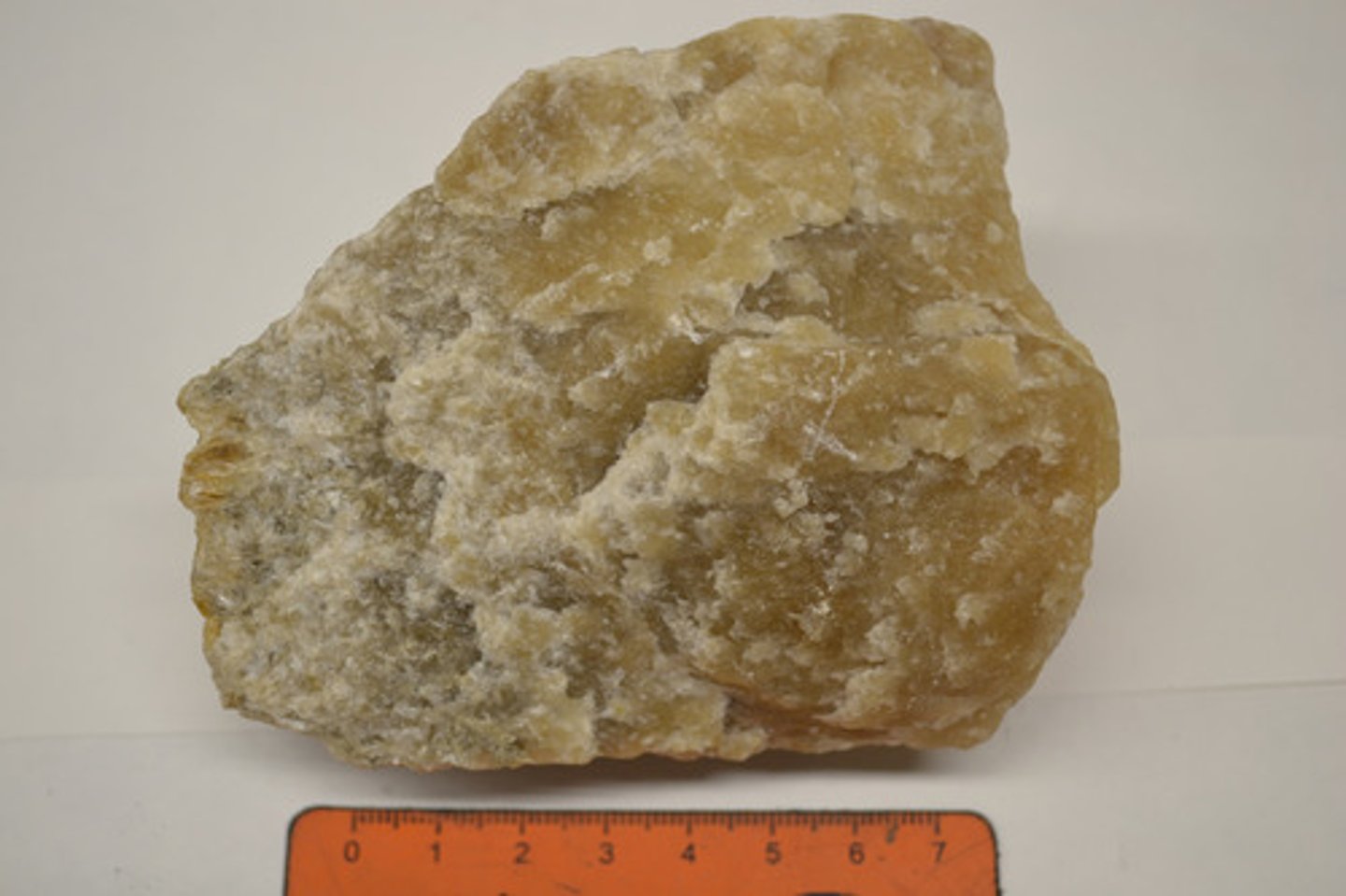
LIMESTONE - FOSSILIFEROUS
Sedimentary rock
Color: gray, white, yellowish
Grain size: medium-coarse
Limestone in which fossils can still be seen.
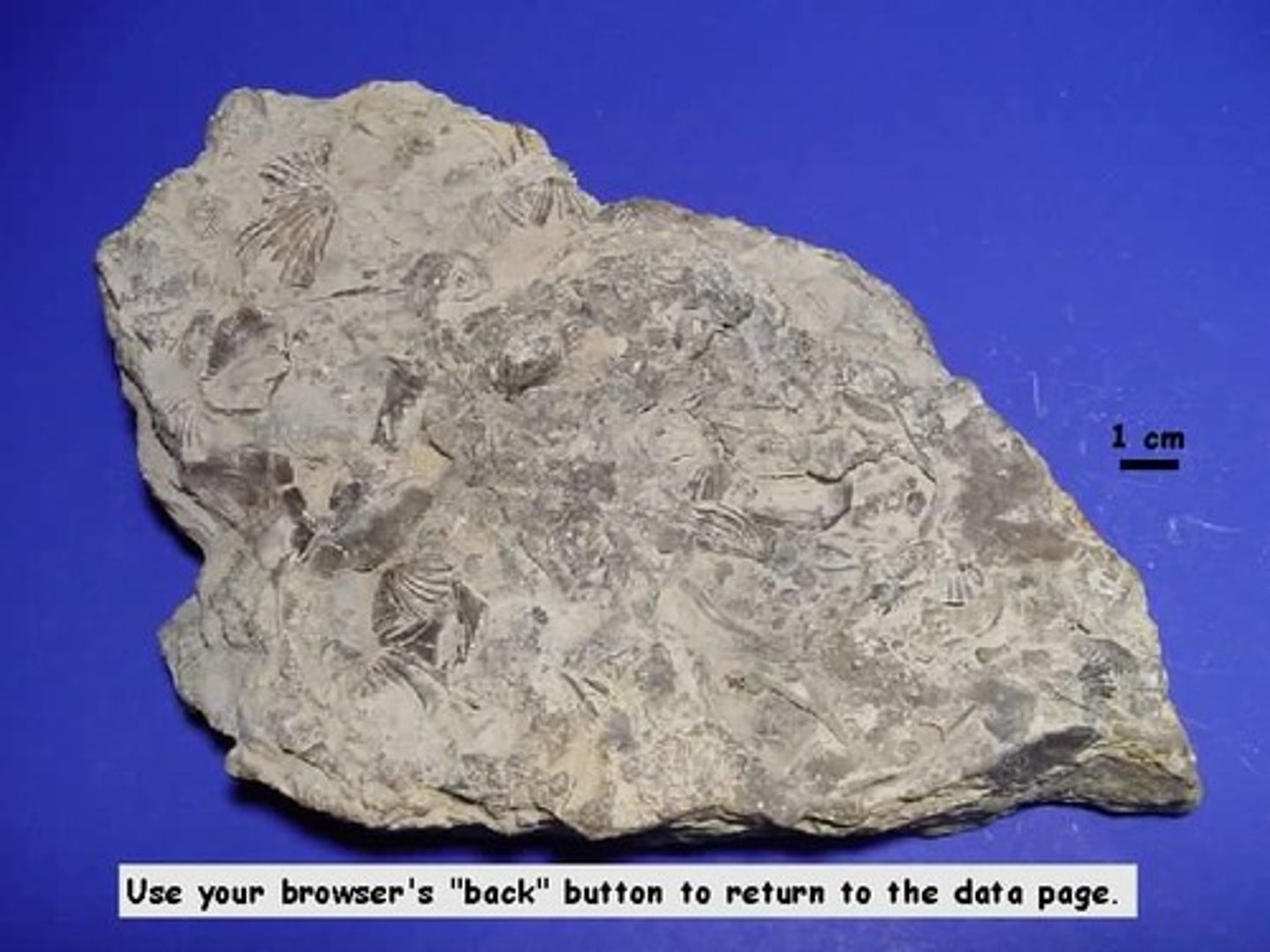
LIMESTONE - OOLITIC
Sedimentary rock
Color: gray, white, yellowish
Grain size: medium
Rock essentilly composed of spheroidal structures built of concentruc layers - usually composed of calcite, called ooliths. Rounded ooliths are easy to see with the naked eye. Oolitic limestone may also contain small amounts of quartz, fossil fragments and other detrital materials. Forms in warm, shallow, strongly agitated marine conditions. The constant action of the water encouages precipitation of calcium carbonate around quartz grains.
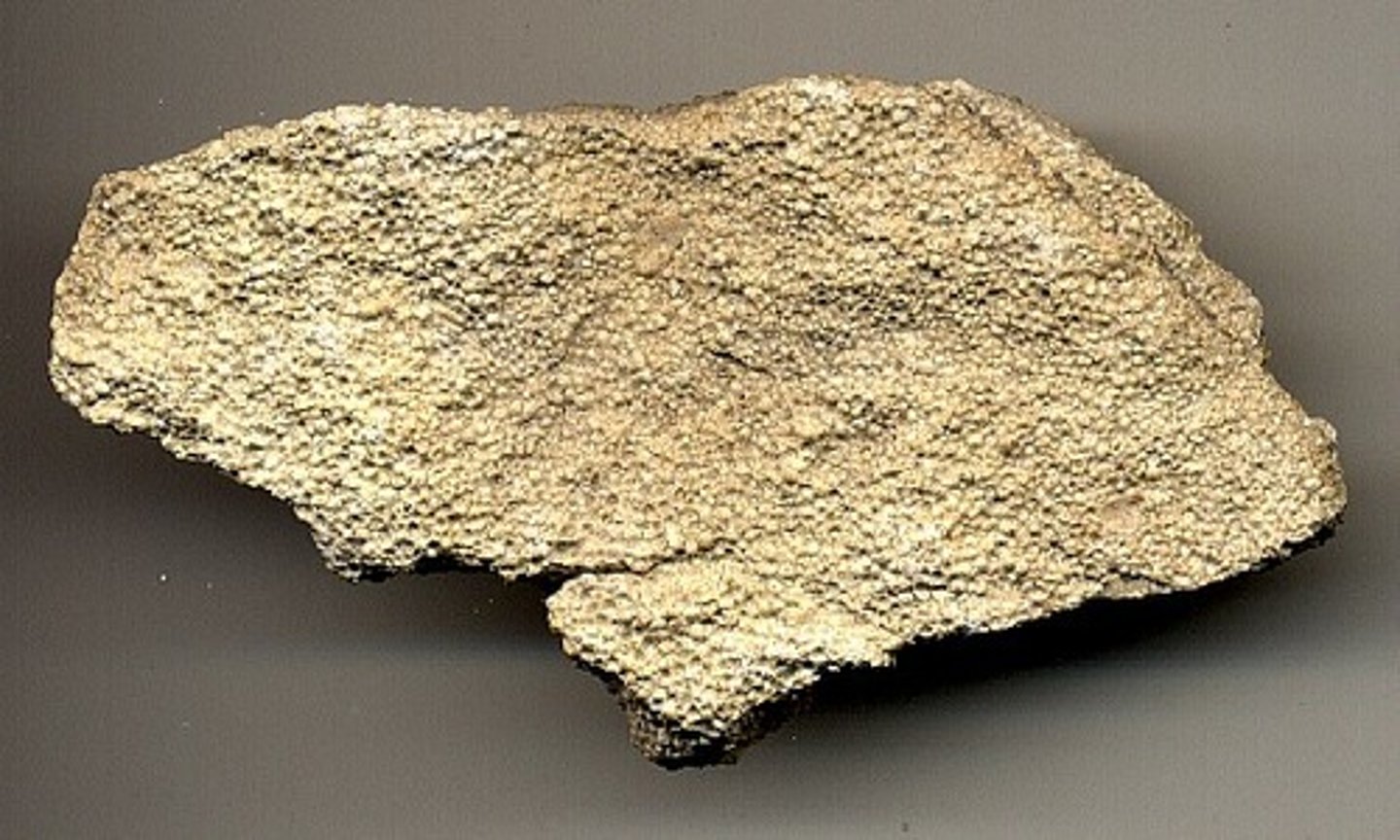
LIMESTONE - TRAVERTINE
Sedimentary rock
Color: very light colored unless it contains impurities
Grain size: crystalline, deposits are rounded, botryoidal (resembling a grape structure), and often banded structures.
Texture: rock is formed of small crystal of calcite that bind together other sediment particles. Frequently associated with hot springs in volcanic regions and the deposition of solid calcium carbonate.
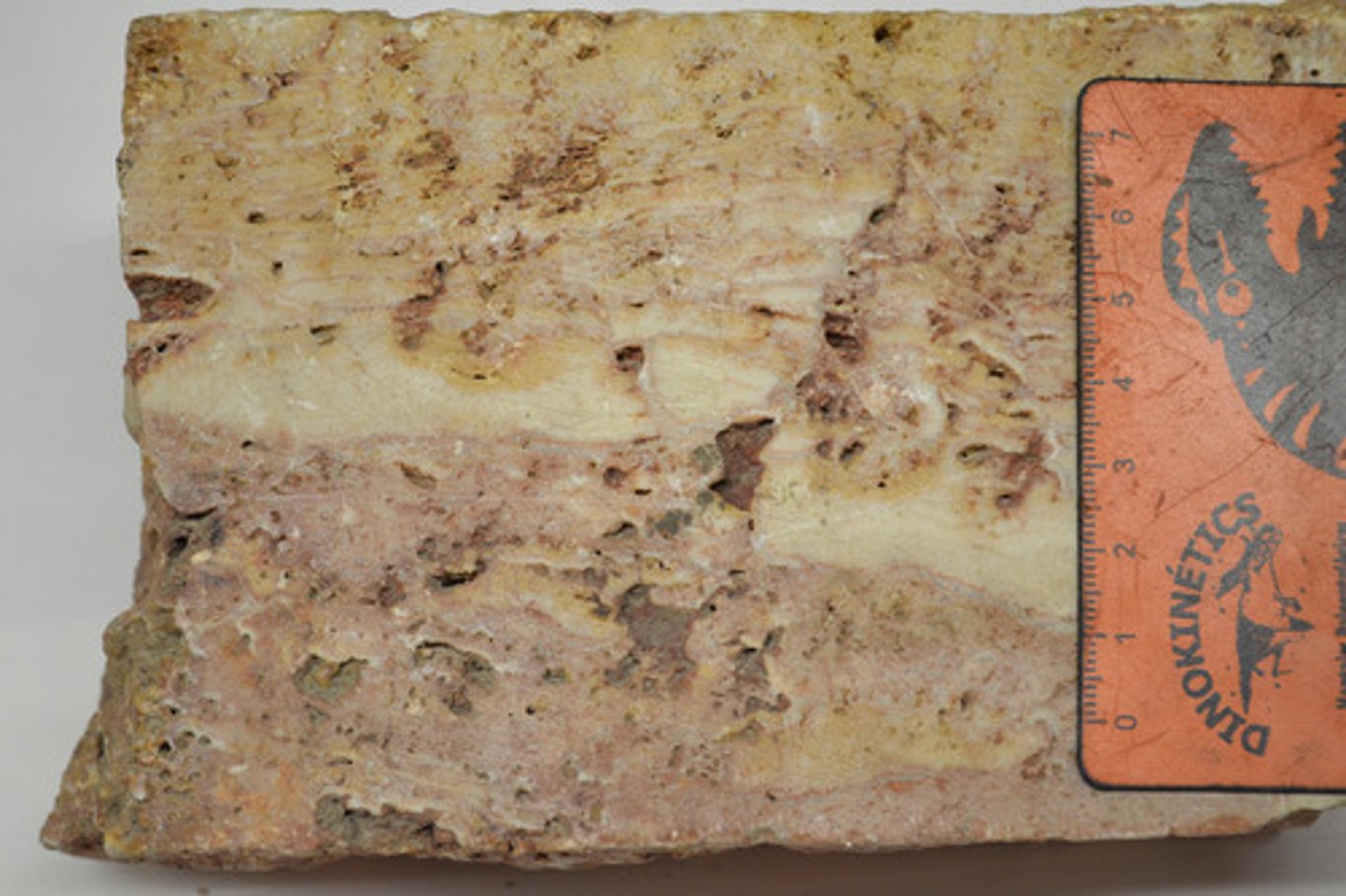
SANDSTONE
Sedimentary rock
Color: light colored, can be greenish, reddish to brown as well
Grain size: medium, well-sorted grains
Rocks are predominantly made up ofquartz grains, but often accompanied by feldspar, mica, or other minerals. Grains may be cemented by silica, calcite, or iron oxides. Majority of sandstones are accumulated in either water, usually marine, or as windblown deposits in arid continental areas.
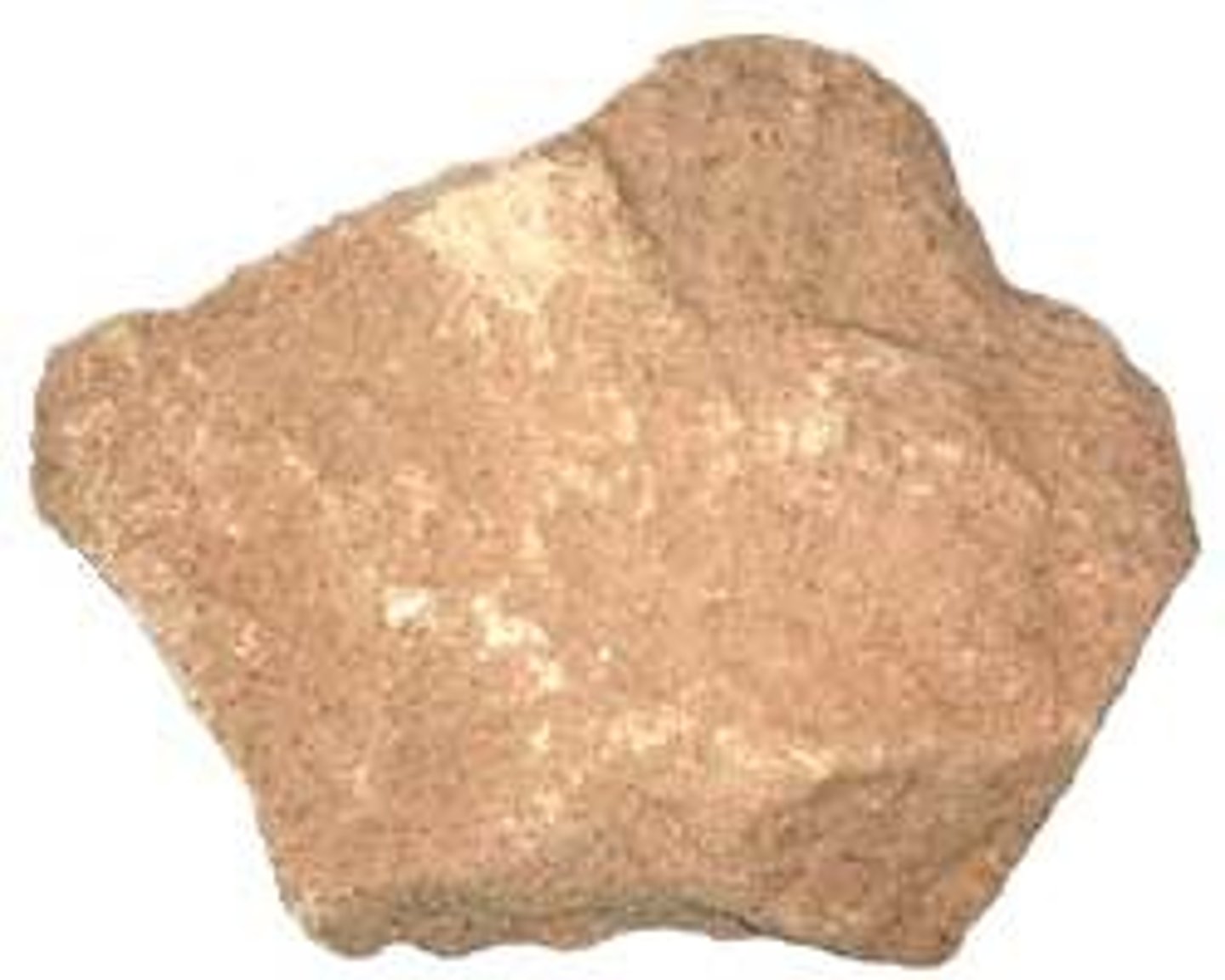
SHALE
Sedimentary rock
Color: black, dark to light gray, depending on the amount of organic debris present; may also color buff, brown, reddish brown or deep red
Grain size: very fine; silt and clay size particles
Texture: appears flat and muddy with no luster. Finely laminated and splits easily along bedding planes, sometimes revealing flattened fossils. Easily scratched by a knife. Forms from sediments deposited in the quiet environment of lake and ocean bottoms.
